WELCOME
Thank you for purchasing Grandstream GVC3200/GVC3202 AndroidTM Video Conferencing System. This document introduces the LCD settings, web UI settings and advanced configurations of GVC3200/GVC3202. To learn the basic configuration and how to use GVC3200/GVC3202, please visit http://www.grandstream.com/support to download the latest “GVC3200/GVC3202 User Guide”.
GVC3200/GVC3202 is a ground-breaking solution that offers small-to-medium businesses a revolutionary video conferencing system with unprecedented flexibility and the power of support for multiple popular video conferencing protocols and platforms right out of the box. The SIP-based GVC3200/GVC3202 supports Grandstream’s robust IPVideoTalk cloud platform for plug and play video conferencing while also being interoperable with any 3rd party SIP video conferencing platform – thus offering a great option to expand or implement a 3rd party platform. Additionally, since it is based on AndroidTM 4.4, the GVC3200/GVC3202 offers full access to all video conferencing applications.
The GVC3200/GVC3202 sports an innovative, patent-pending embedded MCU that supports conferencing with local mixing between SIP, H.323 and Android applications.
- The GVC3200 supports 9-way conferencing with local mixing between SIP, H.323 and Android applications.
- The GVC3202 supports 3-way conferencing with local mixing between SIP, H.323 and Android applications.
In comparison to Grandstream’s GVC3200, the GVC3202 offers a slightly lower capacity option for businesses looking for up to 3-way video-conferencing and support for up to 2 Full HD monitors.
The GVC3200/GVC3202 eliminates the traditional barriers to video conferencing and sets a new bar for business-class video conferencing solutions by offering industry-leading flexibility, interoperability, system compatibility, application richness and ease of use.
PRODUCT OVERVIEW
Table 1: GVC3200/GVC3202 Technical Specifications
Specification | Description |
Protocols/ Standards | SIP RFC3261, BFCP, TIP (pending), RTP/RTCP, HTTP/HTTPS, ARP, ICMP, DNS (A record, SRV, NAPTR), DHCP, PPPoE, SSH, TFTP, NTP, STUN, LLDP-MED, LDAP, TR-069, 802.1x, TLS, SRTP, TCP/IP/UDP, IPv6, FEC, FECC, H.323, Q.931, H.224, H.281, H.225.0, H.239, H.241, H.245, H.460.18 and H.460.19 |
Camera | 1/3” 2 Megapíxel CMOS 1920H x 1080V@30fps |
Lens | GVC3200: 12 x optical zoom, +/-23° tilt, +/- 90° pan, 70°(W)*- 6.3° (T) field of view GVC3202: 9 x optical zoom, +/-23° tilt, +/- 90° pan, 70°(W)*- 6.3° (T) field of view |
Network Interface | 1 x RJ45 10/ 100/ 1000 Mbps port |
Wi-Fi | GVC3200 only: Integrated dual-band 802.11 a/b/g/n (2.4GHz & 5GHz) |
Bluetooth | Yes, integrated Bluetooth |
Video Outputs | GVC3200: 3 x HDMI up to 1080p with CEC GVC3202: 2 x HDMI up to 1080p with CEC |
Video Input | 1 x VGA/1 x HDMI with resolution up to 1080p |
Microphone/ Speaker | External MIC/Speaker, built-in MIC, cascadable external MIC/speaker (pending) |
Remote Control | Bluetooth remote control with multi-touch touchpad |
Auxiliary Ports | 1 x USB 2.0, SD, external speaker port, reset pin |
Graphic Display | OLED with 128×32 resolution |
Voice Codecs | G.711μ/a, G.722 (wide-band), iLBC (pending), Opus, G.722.1, G.722.1c, in-band and out-of-band DTMF (In audio, RFC2833, SIP INFO) |
Video Codecs | H.264 BP/MP/HP, H.323, video resolution up to 1080p, frame rate up to 30fps, bitrate up to 4Mbps |
People Video Resolution | 1080p from 512 Kbps, 720p from 384 Kbps, 4SIF/4CIF from 128 Kbps, SIF/CIF/QSIF/QCIF/SQSIF/SQCIF from 64 Kbps |
Content Video Resolution | Input: VGA, SVGA, XGA, WXGA, WXGA, SXGA, 1440×900, 720p, 1600×1200, 1080p (HDMI), up to 60fps; Encoding: 1280×720, 1920×1080 |
Output Resolution | 720p, 1080p |
Embedded MCU | GVC3200: Up to 4-way 1080p conference, 5-way 720p conference, 9-way VGA conference GVC3202: Up to 2-way 1080p conference, 3-way 720p conference, 3-way VGA conference |
Dual-Stream | BFCP, people video (up to 1080p@30fps) + content video (up to 1080p@15fps, 720p@30fps) |
Audio Features | AEC, ANS, AGC, PLC, CNG/VAD |
Video Features | FEC, dynamic display layout, picture-in-picture, picture-outside-picture, digital caption (pending) |
Platform Bridging | Bridge SIP calls with any Android VoIP apps. |
Telephony Features | Hold, transfer, forward (unconditional/no-answer/busy), call park/pickup, 9-way audio/video conference for GVC3200 and 3-way audio/video conference for GVC3202, downloadable XML phone book, LDAP, call waiting, call history, flexible dial plan, personalized music ringtones, server redundancy & fail-over |
Sample Applications | Web browser, Facebook, Twitter, YouTube, Google calendar, mobile phone data import/export via Bluetooth, etc. API/SDK available for advanced custom application development |
Application Deployment | Allows Android 4.4.2 compliant applications to be deployed in the device with provisioning control |
QoS | Layer 2 QoS (802.1Q, 802.1p) and Layer 3 (ToS, DiffServ, MPLS) QoS |
Security | User and administrator level passwords, MD5 and MD5-sess based authentication, 256-bit AES encrypted configuration file, TLS, 128/256-bit SRTP, HTTPS, 802.1x media access control |
Multi-Language | English, German, Italian, French, Spanish, Portuguese, Russian, Turkish, Polish, Chinese, Korean, Japanese, and more |
Upgrade/ Provisioning | Firmware upgrade via TFTP / HTTP / HTTPS or local HTTP upload, mass provisioning using TR-069 or AES encrypted XML configuration file |
Power & Green Energy Efficiency | Universal power adapter included: Input 100-240VAC 50-60Hz; Output 12VDC/5A (60W) |
Package Content | – GVC3200: GVC3200 video conference system, external USB speaker/MIC (GAC2500), remote control, universal power supply, network cable (1.5 meters), USB extension cable (5 meters), mounting kit, 4 HDMI cables (one 1.5-meter cable, two 3-meter cables and one 5-meter cable), 4 AAA batteries, lens cover, quick installation guide, brochure, GPL license – GVC3202: GVC3202 video conference system, external USB speaker/MIC (GAC2500), remote control, universal power supply, network cable (1.5 meters), USB extension cable (5 meters), mounting kit, 3 HDMI cables (one 1.5-meter cable, one 3-meter cables and one 5-meter cable), 4 AAA batteries, lens cover, quick installation guide, brochure, GPL license |
Temperature and Humidity | Operation: 0°C to 40°C, Storage: -10°C to 60°C, Humidity: 10% to 90% Non-condensing |
Compliance | FCC: Part 15 (CFR 47) Class B; UL 60950 (power adapter), Part 15C, Part 15E.407, Part 2.1091 CE: EN55022 Class B, EN55024, EN61000-3-2, EN61000-3-3, EN60950-1, EN62479, RoHS, EN301893, EN62311 RCM: AS/NZS CISPR22/24; AS/NZS 60950; AS/NZS 4268 |
Safety Compliances
GVC3200/GVC3202 complies with FCC/CE and various safety standards. GVC3200/GVC3202 power adapter is compliant with the UL standard. Use the universal power adapter provided with GVC3200/GVC3202 package only. The manufacturer’s warranty does not cover damages to the device caused by unsupported power adapters.
Warranty
If GVC3200/GVC3202 is purchased from a reseller, please contact the company where the device is purchased for replacement, repair or refund. If the device is purchased directly from Grandstream, please contact Grandstream Support for a RMA (Return Materials Authorization) number before the product is returned. Grandstream reserves the right to remedy warranty policy without prior notification.
INSTALLING GVC3200/GVC3202
Equipment Package Content
GVC3200/GVC3202 package contains the following items:
Table 2: GVC3200/GVC3202 Package List
Name | For GVC3200 | For GVC3202 |
GVC3200/GVC3202 Main Case | 1 | 1 |
External USB Speakerphone (GAC2500) | 1 | 1 |
Remote Control (4 AAA batteries) | 1 | 1 |
12V Universal Power Adapter with power cable | 1 | 1 |
1.5m Ethernet Cable | 1 | 1 |
5m USB Extension Cable | 1 | 1 |
1.5m HDMI Cable | 1 | 1 |
3m HDMI Cable | 2 | 1 |
5m HDMI Cable | 1 | 1 |
Wall Mount Kit, including: Top bracket Bottom bracket Hook & Loop tape | 1 | 1 |
Screws and bolts: 4 screws and 4 bolts to install bracket to the wall 2 screws to fix bracket 2 screws for bracket | 12 | 12 |
Lens Cover | 1 | 1 |
Lens Cleaning Cloth | 1 | 1 |
Quick Installation Guide | 1 | 1 |
GPL license | 1 | 1 |
Connecting GVC3200/GVC3202
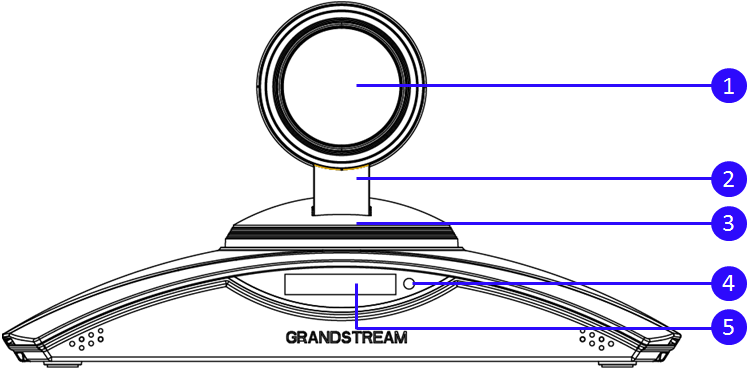
Table 3: GVC3200/GVC3202 Front Panel
NO. | Name | Explanation |
1 | Camera | 70°(W)*- 6.3°(T) field of view |
2 | Vertical Rotating Stent | +/-23° tilt |
3 | Horizontal Rotating Platform | +/-90° pan |
4 | LED Indicator | Power on / Normal Running: Green Standby: Flash red Shutdown: Red Pressing any key on the remote control – Green light flashes once. |
5 | OLED Display | Graphic display with 128×32 resolution shows device status. |
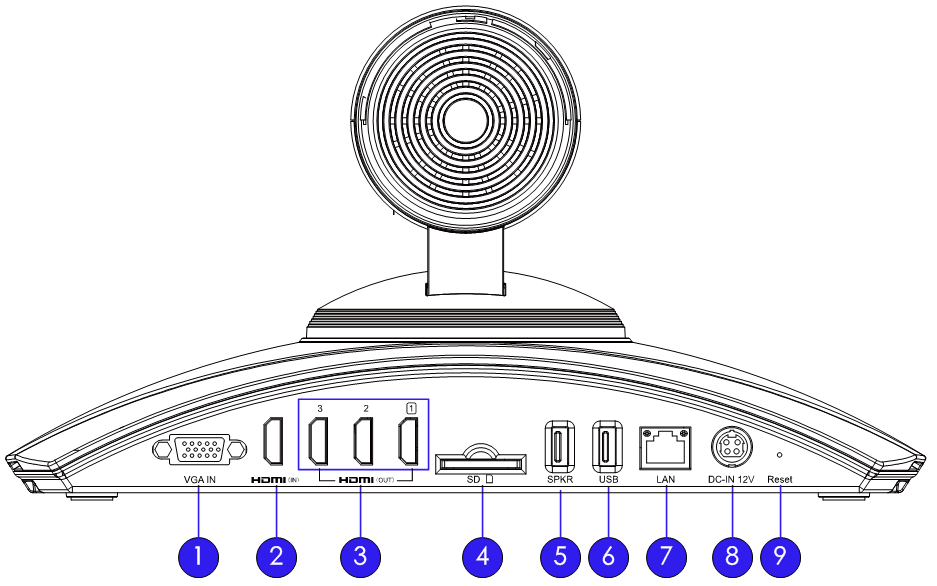
NO. | Name | Explanation |
1 | VGA Input Interface | Connect to VGA input devices. |
2 | HDMI Input Interface | Connect to HDMI input devices. Note: The HDMI input interface has higher priority than the VGA interface when both interfaces are connected. |
3 | HDMI Output Interface | Connect to HDMI display devices. Note: There are 3 HDMI output ports. The interface marked with number “1” is the primary interface to output primary video. Please make sure to follow the port order when connecting HDMI port 1, 2 and 3. When there is only 1 HDMI output, it has to use HDMI output 1. Connect HDMI port 2 and then HDMI port 3 if you have additional display devices. GVC3200 will not work correctly if connecting HDMI port 2 or 3 without HDMI port 1 connected. |
4 | SD Card Slot | Insert SD card to store call recordings and other necessary files. |
5 | External USB Speaker/MIC Jack | Connect to external speakerphone. |
6 | USB Interface | Connect to USB cable or USB storage device. |
7 | Network Interface | Connect to LAN port. |
8 | Power Interface | Connect to power adapter. The arrow indicator on the power adapter should face upwards when the power adapter is plugged in. |
9 | Factory Restore |
|
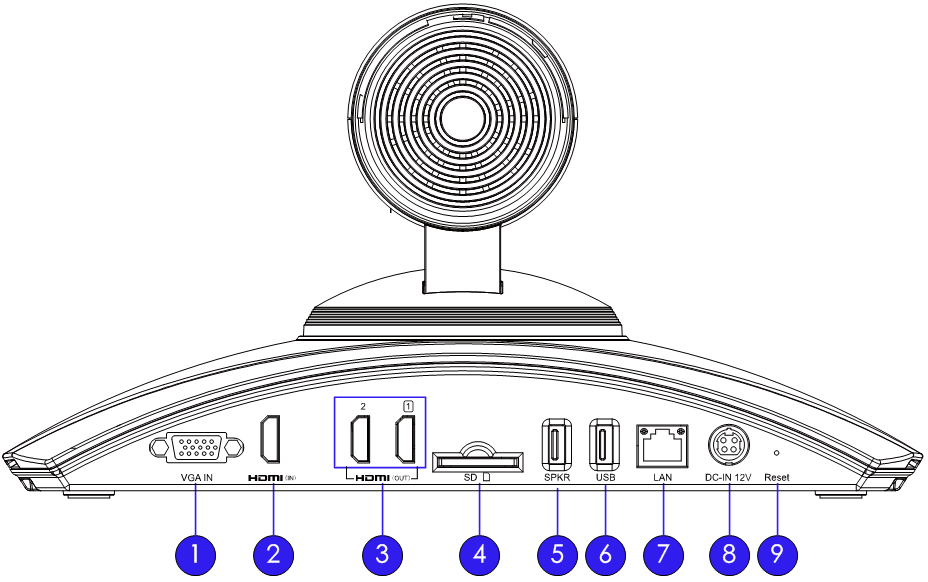
NO. | Name | Explanation |
1 | VGA Input Interface | Connect to VGA input devices. |
2 | HDMI Input Interface | Connect to HDMI input devices. Note: The HDMI input interface has higher priority than the VGA interface when both interfaces are connected. |
3 | HDMI Output Interface | Connect to HDMI display devices. Note: There are 2 HDMI output ports. The interface marked with number “1” is the primary interface to output primary video. Please make sure to follow the port order when connecting HDMI port 1 and 2. When there is only 1 HDMI output, it has to use HDMI output 1. Connect HDMI port 2 if you have an additional display device. GVC3202 will not work correctly if connecting HDMI port 2 without HDMI port 1 connected. |
4 | SD Card Slot | Insert SD card to store call recordings and other necessary files. |
5 | External USB Speaker/MIC Jack | Connect to external speakerphone. |
6 | USB Interface | Connect to USB cable or USB storage device. |
7 | Network Interface | Connect to LAN port. |
8 | Power Interface | Connect to power adapter. The arrow indicator on the power adapter should face upwards when the power adapter is plugged in. |
9 | Factory Restore |
|
To deploy a working video conferencing system, it is recommended for the users to prepare the following equipment based on your own requirements. The following table is for reference only.
Table 6: GVC3200/GVC3202 Optional Equipment List
Device Name | Number | Explanation |
HDMI Display Device | 1 (minimum), 2 or 3 (supported on GVC3200) | To display video conference view, for example, high definition TV. The HDMI display device is connected to HDMI output interface 1/2 for GVC3202 or 1/2/3 for GVC3200. |
VGA Input | Optional | For presentation |
HDMI Input | Optional | For presentation If both HDMI input and VGA input are plugged in, HDMI input has higher priority, it means VGA input will not be displayed. |
USB Mouse | Optional | It can be used to help navigate and operate the GVC3200/GVC3202 besides using remote control. For example, when viewing a web page, USB mouse can be used to control the cursor. |
USB Keyboard | Optional | It can be used to help input characters when operating GVC3200/GVC3202 besides using remote control. |
Please connect GVC3200/GVC3202 according to the following procedures:
- Connect the primary video output device (e.g., high-definition TV) to HDMI output interface 1 on GVC3200/GVC3202 with HDMI cable.
- (Optional) Connect additional video output devices to HDMI output interface 2 and HDMI output interface 3 (supported on GVC3200) with HDMI cable.
- Connect input device (e.g., a laptop or GXV3275) to GVC3200/GVC3202 VGA IN/HDMI IN port with VGA/HDMI cable.
- Connect the external speakerphone GAC2500 to the USB speaker interface on GVC3200/GVC3202.
- Connect to Ethernet or LAN with Ethernet cable for network access. It is recommended to use Gigabit network to assure audio and video quality of video conference.
- Plug in the power adapter into the power supply interface to power up GVC3200/GVC3202.
A sample of GVC3200 back panel connection is shown below:
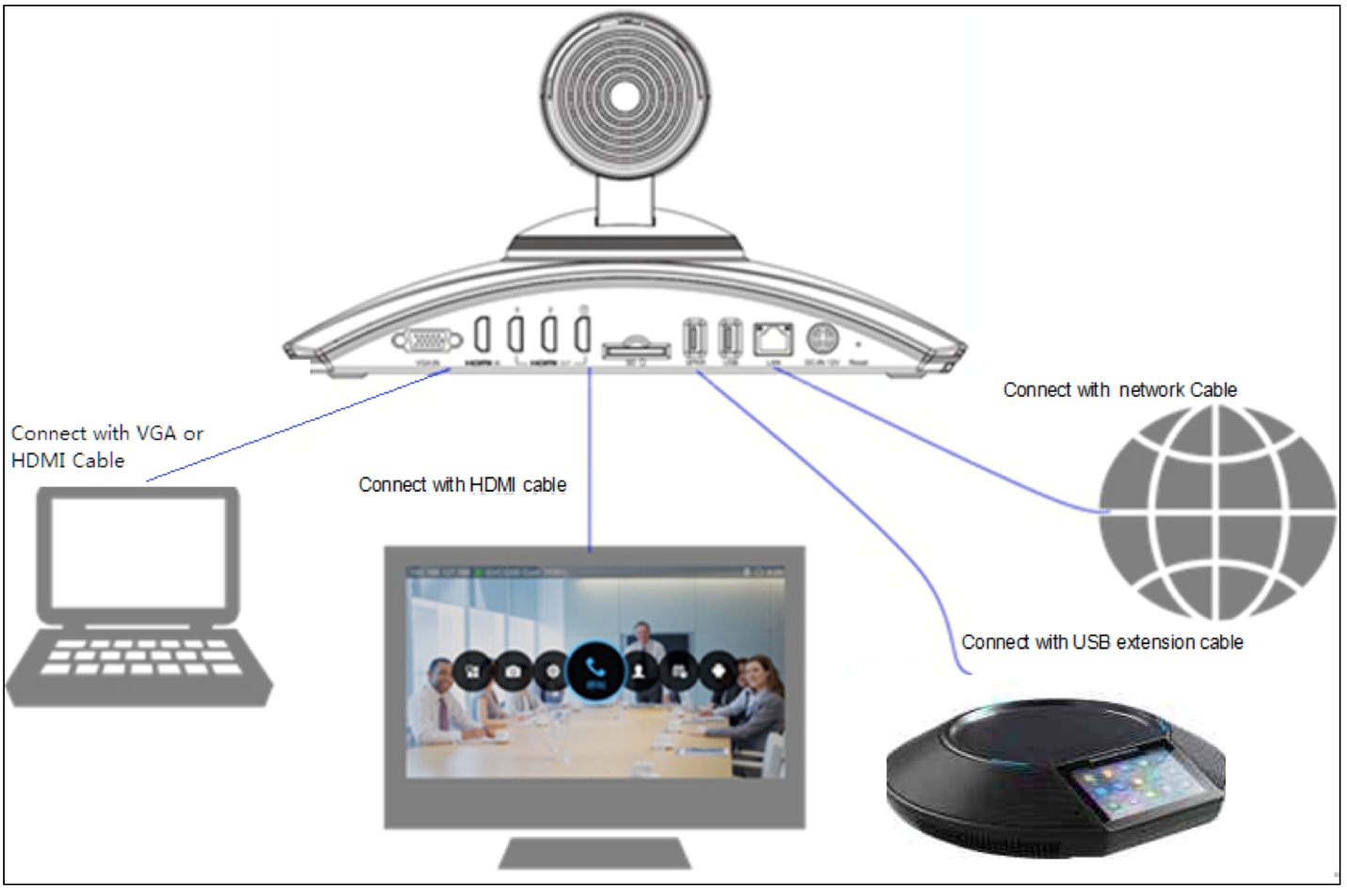
The following figure shows multiple GVC3200/GVC3202 devices deployed with other VoIP/network devices for video conference and collaboration.
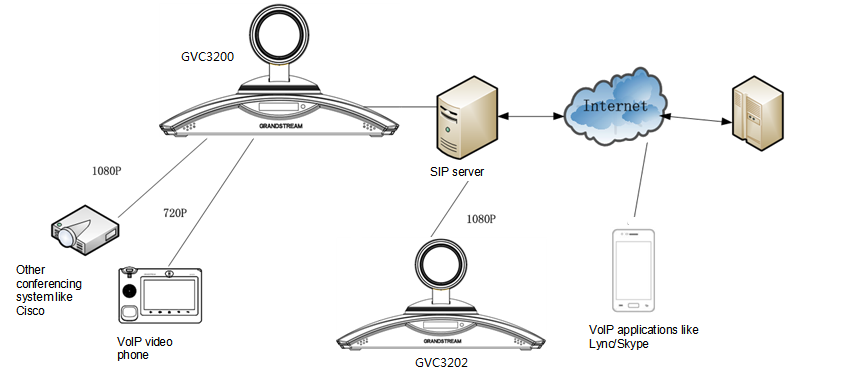
Connecting GAC2500 to GVC3200/GVC3202
GAC2500 is included in GVC3200/GVC3202 package to be used as the external speaker. There are two ways to connect the GAC2500 to GVC3200/GVC3202.
- Via USB Connection
The GAC2500 comes with a micro-USB cable. The cable should be connected between SPKR port on GVC3200/GVC3202 and Micro-USB port on GAC2500. Once connected successful, the GAC2500 will change to speaker mode, only display volume adjustment, mute, call, hang up and etc.
- Via Bluetooth Connection
- On GAC2500, go to LCD menu🡪Settings🡪Bluetooth, turn on Bluetooth. Then tap on “Bluetooth settings” and tap on the GAC2500 device on the top to make it visible.
- On GVC3200/GVC3202, Bluetooth is turned on by default. Go to the GVC3200/GVC3202 LCD menu🡪Network🡪Bluetooth, click on the MENU button and select “Search for Devices”. GAC2500 will be displayed under “Available Devices” list. Click on this GAC2500 to initiate pairing process.
- On both GVC3200/GVC3202 and GAC2500, a prompt will pop up for the user to confirm PIN. Click on “Pair” to confirm it on both devices.
- On GAC2500 LCD menu🡪Settings🡪Bluetooth🡪Bluetooth settings, make sure “Enable headset mode” is turned on.
- On GVC3200/GVC3202 LCD menu🡪Settings🡪Bluetooth🡪Paired Devices, if the GAC2500 is displayed there but not shown as “Connected”, click on this GAC2500 there to complete connection process.
- The GAC2500 and GVC3200/GVC3202 should be successfully paired and connected. GAC2500 can be used as Bluetooth speaker device for the GVC3200/GVC3202 now.
For more information about GAC2500, please refer to the GAC2500 product page in www.grandstream.com.
GETTING TO KNOW GVC3200/GVC3202
Remote Control
Remote Control Keys and Touchpad
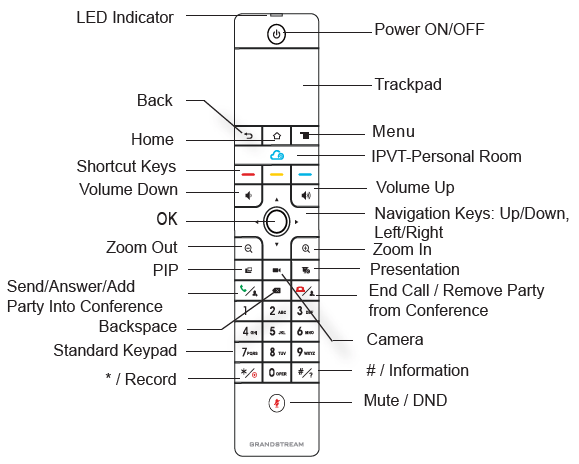
Table 7: GVC3200/GVC3202 Remote Control Keys
Icon | Name | Explanation |
1, 2, 3, 4…9 | Digital Keys | Input number 1-9 and letters. The letter input using digital keys will not be displayed as letter, but it can be used to search for contacts in Call interface. For example, typing 5 (JKL), 6 (MNO), 4 (GHI), 6 (MNO) can look for John if it exists in GVC3200/GVC3202 contacts list. |
Camera | Switch to PTZ control mode during a call or in idle status. | |
PIP | Switch screen layout in conference. | |
Mute/DND |
| |
Presentation |
| |
Send/Answer/Add Party Into Conference |
| |
End Call/Remove Party From Conference |
| |
Backspace | Press the key to delete input characters. | |
Navigation Keys: Up/Down/Left/Right |
| |
OK |
| |
Power On/Off | LCD prompt shows the following three options after pressing this key:
When the power button is pressed second time, the pop-up window will be closed. | |
*/Record |
| |
#/Details |
| |
Shortcut Key: Red | Press each shortcut key for designated functions on different screen context. | |
Shortcut Key: Yellow | ||
Shortcut Key: Blue | ||
Home | Press the key to go back to home screen. | |
Menu | Press the key to view more options. | |
Back | Press the key to go back to the previous screen or exit the current screen. | |
Volume Down | Turn down the device volume. | |
Volume Up | Turn up the device volume. | |
Zoom In | Zoom in screen or adjust close focus. | |
Zoom Out | Zoom out screen or adjust distant focus. | |
Trackpad |
| |
Capturing Screenshot Using the Remote Control
To capture a screenshot on GVC3200/GVC3202, the users can press the red shortcut key
and blue shortcut key
at the same time for about 3 seconds. The screenshot picture will be saved in the internal storage of GVC3200/GVC3202. The users can access the screenshot in GkVC3200/GVC3202 LCD menu🡪Applications🡪File Manager🡪Internal Storage🡪Pictures🡪Screenshot.
Please note the screenshot captured here does not have the image captured from the camera in the background. If you would like the image captured from camera, you can press the CAMERA button on the remote control and then press the blue shortcut key.
Using the Remote Control
GVC3200/GVC3202 remote control is connected to GVC3200/GVC3202 via Bluetooth, and it’s already pre-paired when the user receives GVC3200/GVC3202 packages. Before using the remote control, please make sure:
- Four AAA batteries are correctly installed on the back of the remote control.
- The remote control needs to be placed within the Bluetooth effective range, i.e., 10m from GVC3200/GVC3202.
After powering up GVC3200/GVC3202, pressing “OK” key on the remote control, it will initiate connection and the remote control can be used right away.
If the remote control fails to pair and connect to GVC3200/GVC3202, please follow the steps below to troubleshoot:
- Check the battery polarity when placed into the battery case. Make sure the batteries are placed in the correct direction in the remote control.
- Check the battery power.
If GVC3200/GVC3202 remote control still does not work with the diagnosis above, please try another remote control or contact the device provider.
Using Mouse & Keyboard
When the USB mouse is plugged into GVC3200/GVC3202, users could make the following operations with the mouse.
- Single click the left key of the USB mouse to perform the following operations:
- Access menu
- Check in the checkbox or enable/disable an option
- Bring up the drop-down list when clicking on a combo box
- Switch input methods in the input box, tap on the corresponding buttons on the soft keyboard to input characters
-
Double left clicks
on the soft keyboard can switch to “Always use upper case” in English input method.
- Single click the right key of the USB mouse to exit the current displayed menu. It will go back to the previous menu without saving the configurations.
OLED Screen
Table 8: GVC3200/GVC3202 OLED Screen Status Descriptions
OLED Screen Status | Descriptions |
Booting | Display “BOOTING…” when GVC3200/GVC3202 boots up. |
IP | Display GVC3200/GVC3202 IP address. For example, IP: 192.168.40.5. |
Call Status | Display “Ringing”, “Calling”, “Talking”, “Call Waiting”, “Missed Call”, “New Voicemail” and etc. |
Upgrade Status |
|
Sleep Mode | When the device is in sleep mode, the OLED shows “Standby”. |
Abnormal Status | It is used to display abnormal status information. The hexadecimal error code will be displayed next to the abnormal status. |
Using the LED Indicator
GVC3200/GVC3202 LED indicator is located next to the OLED. It can be used to notify the users with current status of the device. Please refer to the status description below.
Table 9: GVC3200/GVC3202 LED Indicator Status Descriptions
LED Indicator Status | Descriptions |
Solid Green | Booting or the device is already booted up |
Flash Red | Standby (Sleep Mode) |
Solid Red | Shut down but powered on (power adapter is connected) |
Green Flashing once | Key pressing on the remote control |
OFF | Power off |
Status Icons
GVC3200/GVC3202 status icons are displayed on the right side of top status bar on GVC3200/GVC3202 LCD display device. The users can view the top status bar notification details in drop-down panel by long-pressing the MENU key on the GVC remote control or pressing DOWN button when the GVC3200/GVC3202 is in home screen.
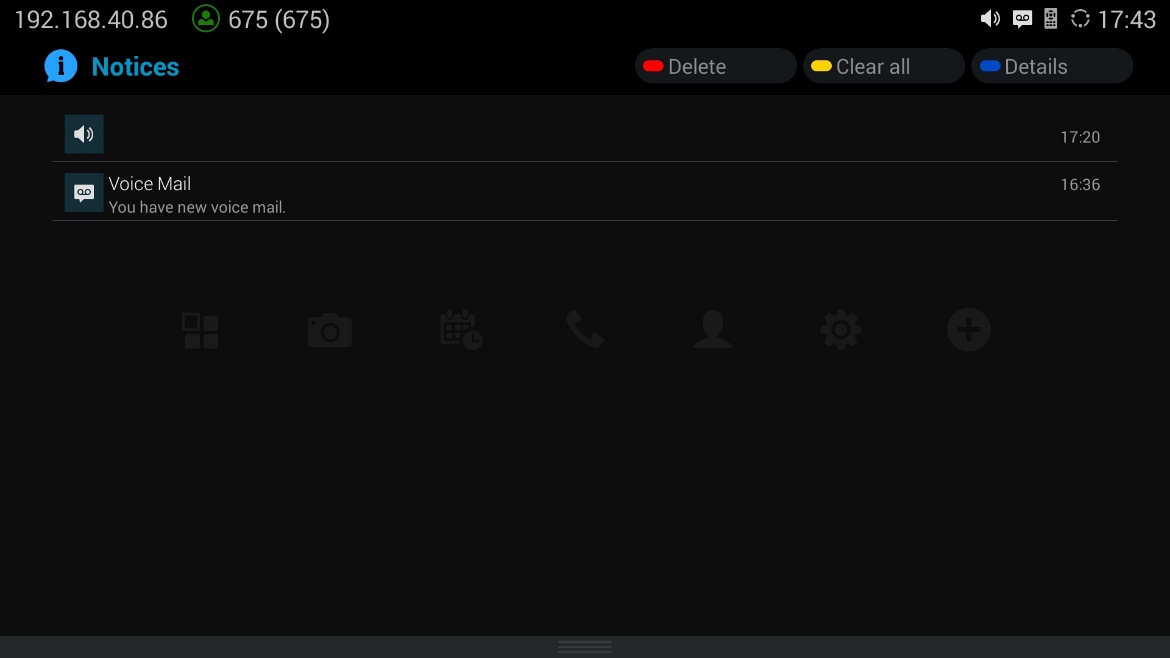
For some notifications such as Voice Mail, the users can use the GVC remote control trackpad to select it. It will navigate the users to the corresponding app.
The following table lists the main status icons used on GVC3200/GVC3202.
Table 10: GVC3200/GVC3202 Status Icons Descriptions
Icon | Descriptions | Icon | Descriptions | Icon | Descriptions |
Missed Call |
| Ongoing call |
| Auto answer is enabled | |
| Ethernet is connected |
| Ethernet is disconnected |
| Trying to connect to the Ethernet |
| PPPoE is connected |
| PPPoE connection is failed |
| PPPoE is disconnected |
| VLAN is successfully configured |
| VLAN is being configured |
| Unread voicemail |
| VPN is connected |
| VPN connection is failed |
| Using third party applications for mixing calls |
| Bluetooth is connected |
| DND mode is enabled |
| Remote control Low battery |
| Remote control is connected and paired |
| Remote control is paired but not connected |
| Remote control is not connected and paired |
| SD Card is inserted |
| USB flash drive is inserted |
| Speaker is being used |
| Call recording storage is full |
| Contacts storage is full |
| SD card storage is full |
| Wi-Fi is connected. |
| Wi-Fi is disconnected |
| Volume is turned to silent |
| Call forward is set up |
Wi-Fi signal strength |
| Unknown Wi-Fi |
Using the Onscreen Keyboard
English Keyboard
This is the default keyboard on GVC3200/GVC3202. The English keyboard supports multiple languages input methods. Users could tap on


Tap on


Numbers and Symbols
To input numbers and symbols, tap on button



Home Screen
GVC3200/GVC3202 Home screen displays the icons for users to easily access applications, camera, schedule, call, IPVideoTalk menu, contacts, settings and custom applications. Press the Left/Right keys on the GVC3200/GVC3202 remote control to navigate.
If there is no activity on main screen, the icons will be hidden and the video local loopback is displayed. Press OK button on the GVC3200/GVC3202 remote control to bring up the icons to display again.
Figure 12: GVC3200/GVC3202 Home Screen
Screen Lock
The GVC3200/GVC3202 supports screen lock. When it’s enabled and configured, the user will be required to enter the lock code to unlock on the home screen.
To use this feature:
- On GVC3200/GVC3202 LCD menu🡪Settings🡪System🡪Security, select Screen Lock and set Screen Lock code.
- Reboot, enter sleep mode or power off the GVC3200/GVC3202.
- When the GVC3200/GVC3202 boots up again, a screen lock code will be required. The user can unlock the screen by entering the code using the GVC remote control.
CONNECTING TO NETWORK AND DEVICES
GVC3200/GVC3202 supports a variety of network connections (Ethernet, Wi-Fi) and device connections, including USB, SD card and Bluetooth devices. When the GVC3200/GVC3202 boots up for the first time, a setup wizard will guide the users to pair and connect the remote control to GVC3200/GVC3202 and get started with the basic configurations.
Ethernet
If the user would like to use Ethernet connection for network access, please plug the Ethernet cable into the LAN port on the back of GVC3200/GVC3202. Ethernet connection is turned on as DHCP by default on both IPv4 and IPv6 protocols.
To configure Ethernet settings on GVC3200/GVC3202, go to LCD menu🡪Settings🡪Network🡪Ethernet.
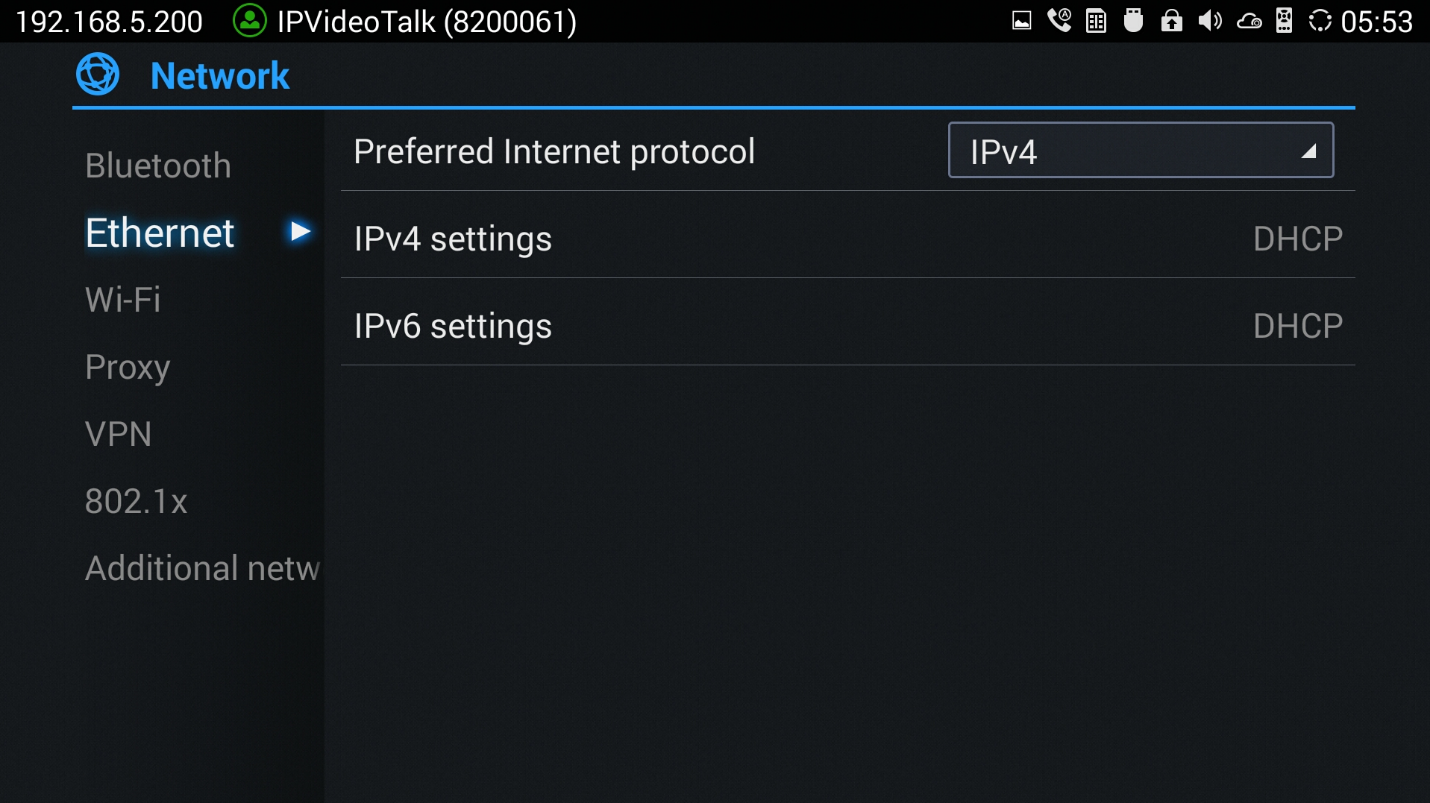
The GVC3200/GVC3202 offers the possibility to prioritize a protocol over another by setting Preferred Internet protocol to IPv4 or IPv6.
Using IPv4
To configure the GVC3200/GVC3202 using IPv4 protocol, follow the below steps:
- Plug the Ethernet cable into the LAN port on the back of GVC3200/GVC3202.
- Go to LCD menu🡪Settings🡪Network🡪Ethernet🡪IPv4 Settings.
- Tap on “Address Type” to select DHCP, Static IP or PPPoE as the address type.
- For DHCP, save the setting and GVC3200/GVC3202 should be able to get IP address from the DHCP server in the network.
- For static IP, enter IP Address, Subnet Mask, Default Gateway, DNS Server and Alternative DNS server for GVC3200/GVC3202 to correctly connect to the network.
- For PPPoE, enter PPPoE account ID and password so that GVC3200/GVC3202 can get IP address from the PPPoE server.
Using IPv6
To configure the GVC3200/GVC3202 using IPv6 protocol, follow the below steps:
1. Plug the Ethernet cable into the LAN port on the back of the GVC3200/GVC3202
2. Go to LCD menu🡪Settings🡪Network🡪Ethernet🡪IPv6 Settings.
3. Tap “Address Type” to select DHCP or Static IP as the address type.
- For DHCP, save the setting and GVC3200/GVC3202 should be able to get IP address from the DHCP server in the network.
- For static IP, configure IPv6 address, DNS server 1, DNS server 2 and Preferred DNS server, enter the IPv6 address in the format of 2001:db8:1:2::3.
WI-FI (GVC3200 Only)
Wi-Fi is supported and built-in on GVC3200 only. On the LCD display, go to Settings🡪Network🡪Wi-Fi to turn on and configure Wi-Fi.
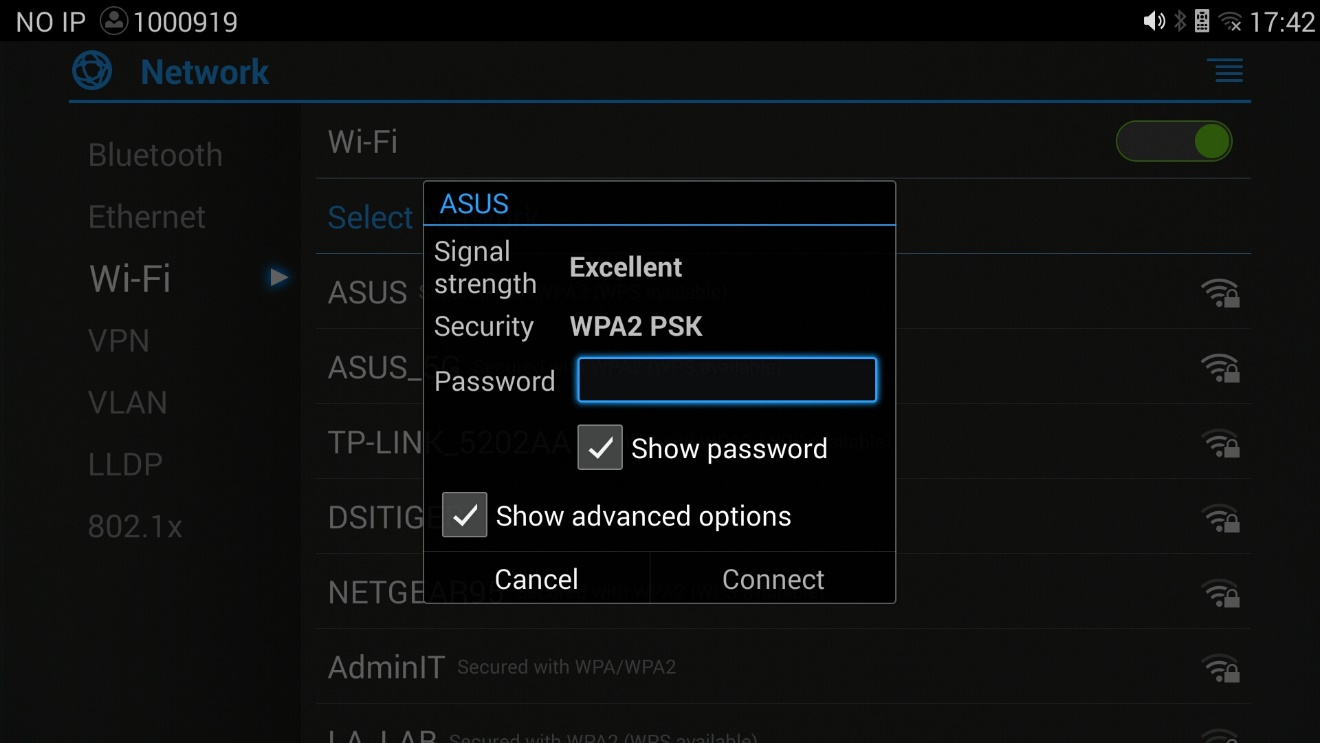
Turning Wi-Fi On/Off
Once Wi-Fi is turned on, GVC3200 will automatically start the scanning within the range. A list of Wi-Fi networks will be displayed as scanning result. Tap on the SSID and enter the correct password information to connect to the selected Wi-Fi network.
Follow the steps below for static IP usage under Wi-Fi environment:
- Tap on one Wi-Fi network in the scanned Wi-Fi list to bring up the dialog that shows signal strength, security, password and option “Show advanced options”.
- Select “Show advanced options”. The dialog will show additional option “IP settings”.
- In “IP settings”, select Static IP, enter IP Address, Subnet Mask, and Default Gateway for GVC3200 to correctly connect to the network.
Bluetooth
On GVC3200/GVC3202, Bluetooth is enabled by default. Users could connect Bluetooth by remote control, send or receive files to cellphone, or use Bluetooth speaker and etc on GVC3200/GVC3202.
Pairing GVC3200/GVC3202 with a Bluetooth Device
Before connecting GVC3200/GVC3202 with other Bluetooth device, users must pair them first. They will stay paired afterwards unless they are manually unpaired. To pair Bluetooth device:
- On the LCD display device, go to Settings🡪Network🡪Bluetooth.
- Press button on the remote control and select “Search for devices”.
- GVC3200/GVC3202 scans and displays the IDs of all available Bluetooth devices in range. Once the Bluetooth device shows up in the result, tap on it to start pairing.
- Confirm the passkey in the prompted message (if any). Or, if passcode is required, please refer to the device’s documentation or contact with the device administrator to obtain the passcode.
Connecting to a Bluetooth Device
After pairing successfully, the device will be connected to GVC3200/GVC3202 immediately. Users will see this device listed under “Paired Devices”. Tap on

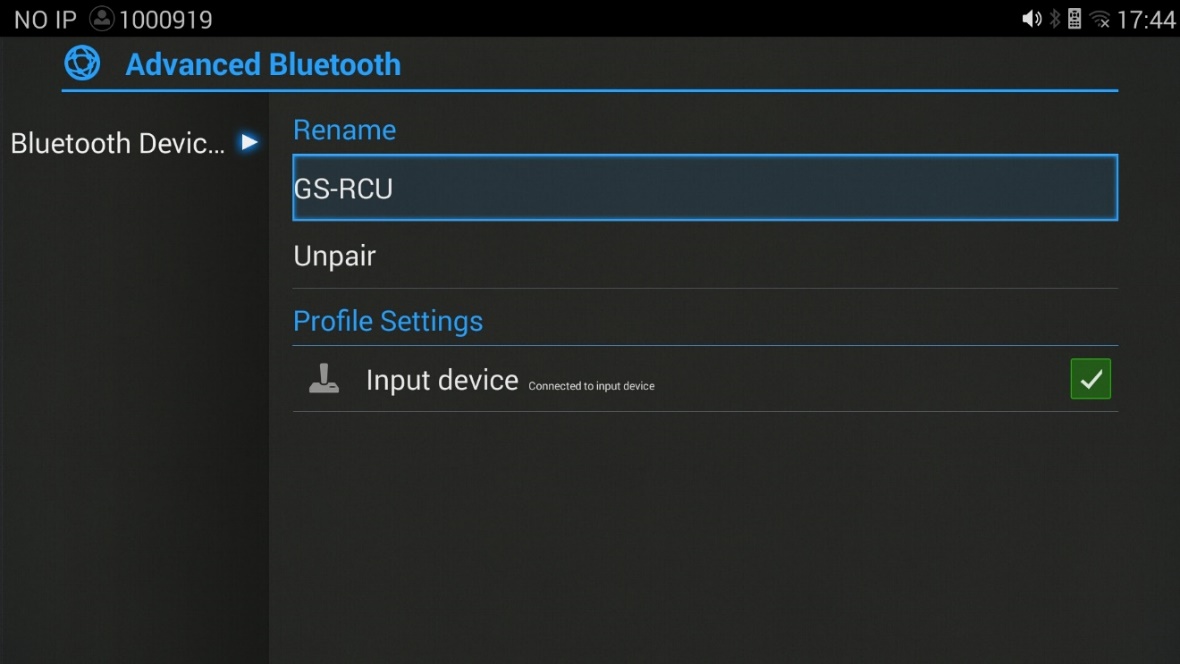
If the connection is lost between the Bluetooth device and GVC3200/GVC3202, go to LCD menu🡪Settings🡪Network🡪Bluetooth and click on the device name under “Paired devices” again to reconnect.
Using Bluetooth Remote Control
Users could use GVC3200/GVC3202 Bluetooth remote control that comes with the GVC3200/GVC3202 packaging to control and configure a GVC3200/GVC3202. When the GVC3200/GVC3202 boots up for the first time, a setup wizard will guide the users to pair and connect the remote control to the GVC3200/GVC3202.
When the remote control is connected to GVC3200/GVC3202, users will see
icon on the top status bar of the LCD display device.
If the user happens to reset the GVC3200/GVC3202, or unpaired the remote control, the user will need pair and connect remote control to the GVC3200/GVC3202 again. Please follow the steps below:
- Connect a USB mouse or open the virtual remote control after logging in GVC3200/GVC3202 web UI.
- On the LCD display device, go to Settings🡪Network🡪Bluetooth.
- Select and click “Search for devices”.
- On the remote control, you would like to pair with GVC3200/GVC3202, press “OK” and digit 5 keys at the same time for about 5 seconds.
- The pairing and connection process will be initiated and finished in a few seconds. Please do not press any keys on the remote control or switch screens during this process to avoid connection failure.
If the user needs to pair a different remote control to GVC3200/GVC3202, please follow the methods below:
Method 1: Connect a second remote control to GVC3200/GVC3202 and both remote controls can be used at the same time
1. When remote control A is paired and connected to GVC3200/GVC3202, go to GVC3200/GVC3202 LCD🡪Settings🡪Network🡪Bluetooth, select and click “Search for devices”.
2. On remote control B, press OK + 5 keys at the same time for about 5 seconds to trigger pairing process on remote control B.
3. Use remote control A to navigate and select the detected remote-control B on GVC3200/GVC3202 Bluetooth display interface to pair and connect.
4. Now both remote controls can be used with GVC3200/GVC3202.
5. (Optional) If you wish to use only one remote control, on GVC3200/GVC3202 LCD🡪Settings🡪Network🡪Bluetooth, use the desired remote control, select

Method 2: Replace remote control A with remote control B
1. On GVC3200/GVC3202, go to LCD🡪Settings🡪Network🡪Bluetooth, select
on the right side of the remote-control A, then click on “Unpair”.
2. Reboot GVC3200/GVC3202. Make sure there is no USB mouse connected to GVC3200/GVC3202. Also, make sure no other remote control is paired to the GVC3200/GVC3202.
3. After GVC3200/GVC3202 boots up, on remote control B, press OK + 5 keys at the same time for about 5 seconds to trigger pairing process on remote control B.
4. GVC3200/GVC3202 will automatically search for nearby available Bluetooth devices right after it boots up. It will then pair and connect to remote control B
Transfer Files with Bluetooth
Users could transfer files, share contacts information with other Bluetooth portable devices after pairing and connection. A prompt for file transferring will be displayed on GVC3200/GVC3202 LCD display device when it receives the file transferring request. Accept the request to receive the file and it will be stored under LCD🡪Applications🡪File Manager🡪Internal Storage🡪Bluetooth folder.
Using Bluetooth Headset
Once the Bluetooth headset is connected with GVC3200/GVC3202, it will automatically use Bluetooth headset for calls. By default, the ringing tone will be generated in Bluetooth headset when there is an incoming call.
If the user would like to have the ringing tone generated in GVC3200/GVC3202 internal ringer as well, please select enable “Always Ring Internal Ringer” under GVC3200/GVC3202 web UI🡪Settings🡪Call Features.
VPN Settings
Users can add VPN using different protocols (PPTP, L2TP/IPSec PSK, L2TP/IPSec RSA, IPSec Xauth PSK, IPSeXauth RSA and IPSec Hybrid RSA). Follow the steps below to set up VPN:
- Access GVC3200/GVC3202 home screen, go to Applications🡪Settings🡪Network🡪VPN.
- Tap on “Add VPN file” to access configuration page as shown below:
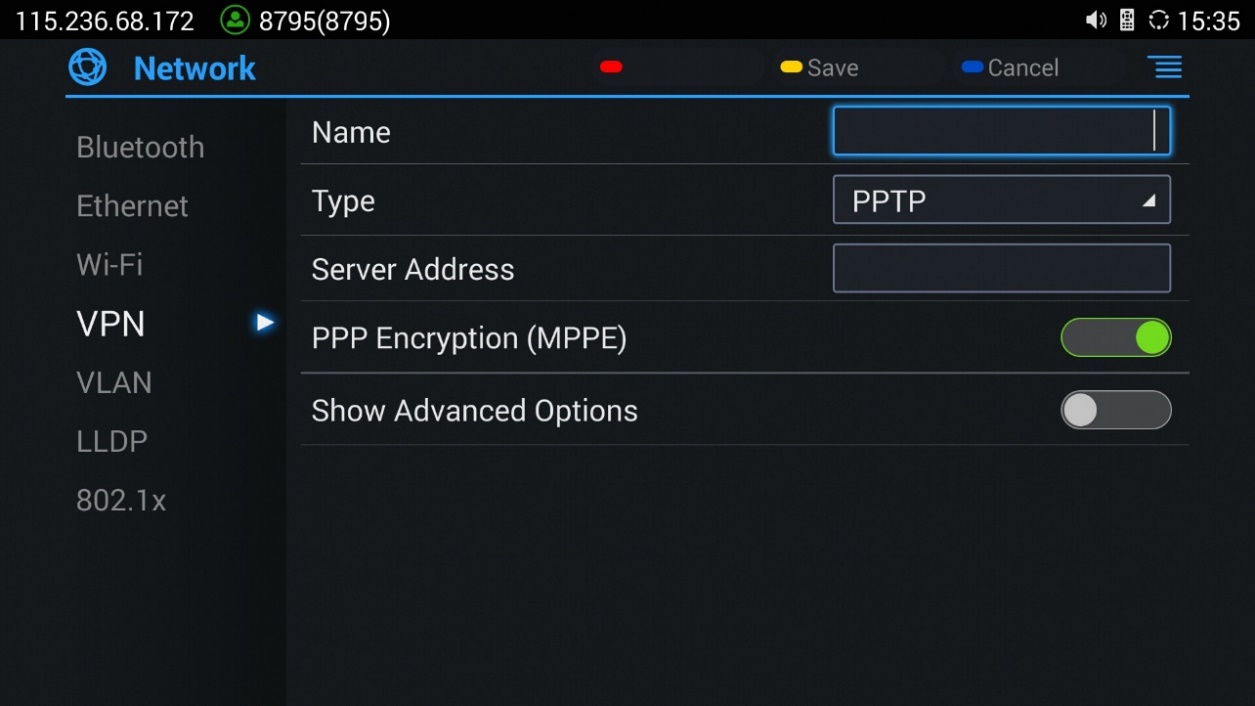
- Fill in and save the configurations, go back to VPN page, you will find the new VPN file you just added.
- Tap on the VPN file to open the validation page as shown below:
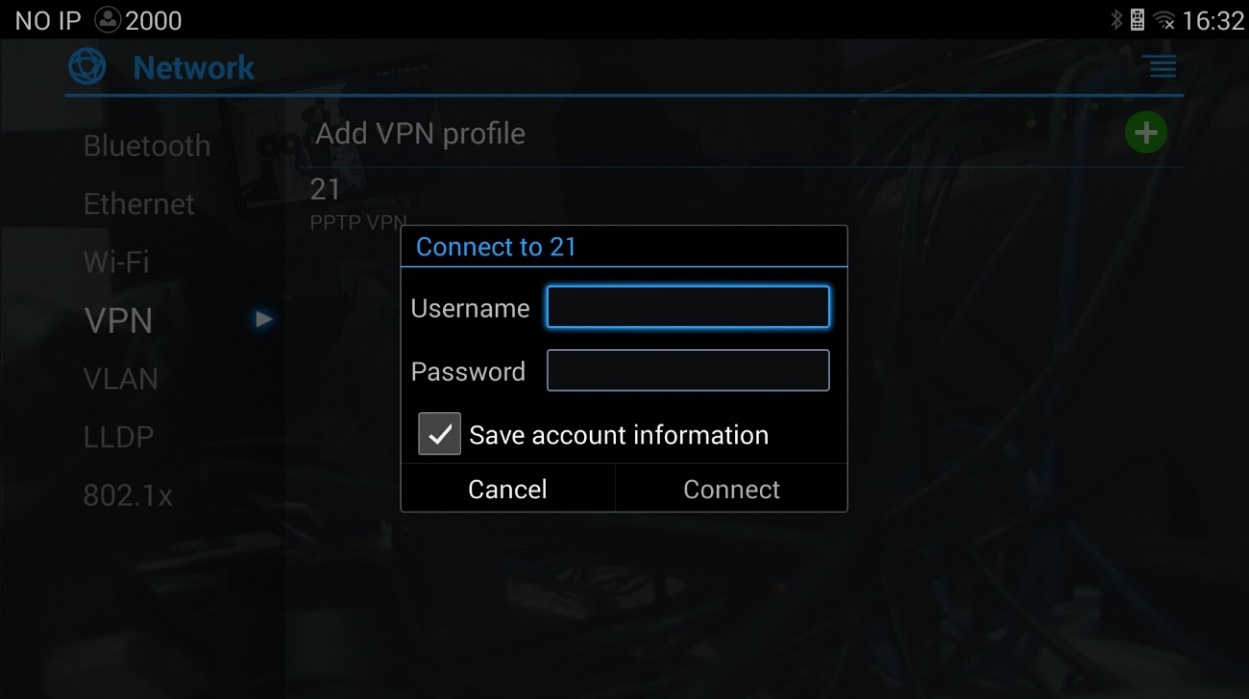
5. Fill in correct username and password to connect to VPN.
If GVC3200/GVC3202 is connected to VPN successfully, icon
will be shown in the top status bar; if the connection is failed, a prompt box will pop up to remind users whether to reconnect to VPN. If icon displays in the top status bar, please check whether if your VPN configuration is correct.
Table 11: GVC3200/GVC3202 VPN File Parameters
Parameters | Descriptions |
Name | Fill in your company address or the server you are connecting to. |
Type | Set to PPTP, L2TP/IPSec PSK, L2TP/IPSec RSA, IPSec Xauth PSK, IPSeXauth RSA or IPSec Hybrid RSA. |
Server Address | Fill in the server URL or IP address. |
PPP Encryption (MPPE) | Defines whether to use PPP encryption. |
Show Advanced Options | Check this option to display more options below. |
DNS Search Domains | Enter DNS search domain. |
DNS Server | Enter DNS server address. |
Forwarding Routes | Enter Forwarding Routes, for example, 10.0.0.0/8. |
VLAN Settings
Access GVC3200/GVC3202 home screen, go to Applications🡪Settings🡪Network🡪VLAN to configure VLAN settings on GVC3200/GVC3202.
Table 12: GVC3200/GVC3202 VLAN Configuration Parameters
Parameters | Descriptions |
Layer 2 QoS 802.1q/VLAN Tag | Assigns the VLAN Tag of the Layer 2 QoS packets for LAN port. The default value is 0. Note: Please do not change the setting before understanding the VLAN’s settings or consulting with the network administrator. Otherwise, the device might not be able to get the correct IP address. |
Layer 2 QoS 802.1p Priority | Assigns the priority value of the Layer 2 QoS packets. The default value is 0. |
LLDP Settings
Access GVC3200/GVC3202 home screen, go to Applications🡪Settings🡪Network🡪LLDP to configure LLDP settings on GVC3200/GVC3202.
Table 13: GVC3200/GVC3202 LLDP Configuration Parameters
Parameters | Descriptions |
LLDP | Enable or disable LLDP. The default setting is disabled. |
Layer 3 QoS for SIP | This field defines the layer 3 QoS parameter for SIP packets. It is the value used for IP Precedence, Diff-Serv or MPLS. The default value is 48. |
Layer 3 QoS for Audio | This field defines the layer 3 QoS parameter for audio packets. It is the value used for IP Precedence, Diff-Serv or MPLS. The default value is 48. |
Layer 3 QoS for Video | This field defines the layer 3 QoS parameter for video packets. It is the value used for IP Precedence, Diff-Serv or MPLS. The default value is 48. |
802.1X Mode
Access GVC3200/GVC3202 home screen, go to Applications🡪Settings🡪Network🡪802.1x Mode. By default, 802.1x is disabled. Selecting 802.1x mode to “EAP-MD5”, “EAP-TLS5” or “EAP-PEAP” to turn on 802.1x. Once it is enabled, the user will be required to enter the identity and password to be authenticated in the network.
Table 14: GVC3200/GVC3202 802.1x Mode Parameters
Parameters | Descriptions |
802.1x Mode | Allows the user to enable/disable 802.1x and configure 802.1x mode. The default setting is disabled. |
Identity | Enter the Identity information for 802.1x mode. |
MD5 Password | Enter the MD5 Password for 802.1x mode. |
CA Certificate | Upload the CA certificate for 802.1x mode. |
Client Certificate | Upload the CA certificate for 802.1x mode. |
Private Key | Upload the private key for 802.1x mode. |
CAMERA
Users could set preset, configure camera parameters, start recording and make screenshots on camera screen. There are 3 ways to access camera screen:
-
Click on
icon on home screen.
- Press key on the remote control.
-
Select
on home screen to access Applications, then click on
.
GVC3200/GVC3202 camera screen has the following options:
- Press recording button on the remote control to start or stop local recording.
- Press the red shortcut button on the remote control to edit preset.
- Press the yellow shortcut button on the remote control to edit image parameters such as scene, white balance, MF/AF and etc.
- Press the blue shortcut button on the remote control for screenshot.
- Press digit key on the remote control to apply a pre-configured preset.

Preset
Add Preset
Users can create and save maximum of 24 camera presets, with each preset storing the camera position and focal length. Follow the steps below to add preset:
- Access camera screen and press the red shortcut key on the remote control to access preset screen.
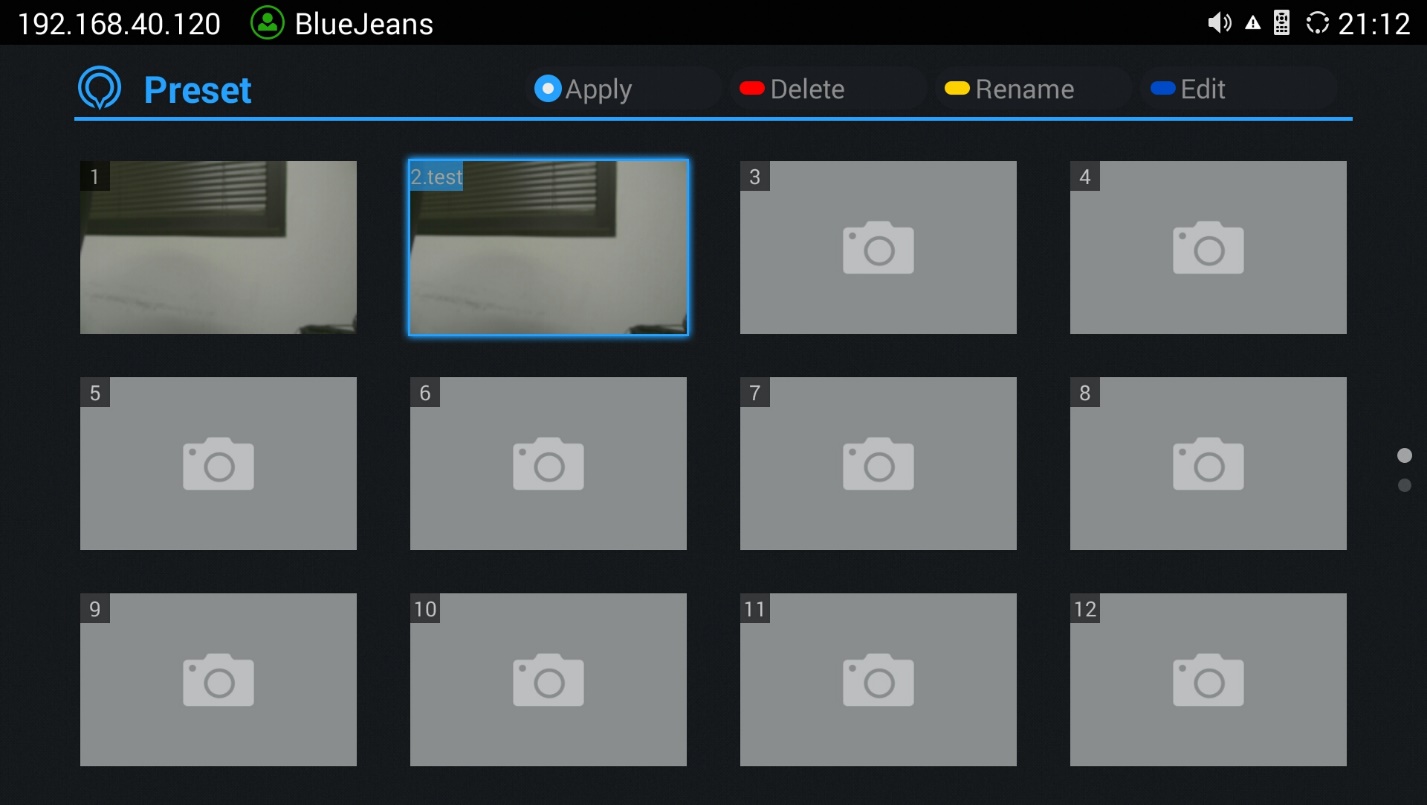
- Select the preset window and press the blue shortcut key on the remote control to access the editing screen.
- Adjust camera position and zoom in/zoom out using the remote control.
- On GVC3200/GVC3202 remote control, press “OK” key to save the preset, or press Back key to cancel.
Edit Preset
To edit an existing preset, press the blue shortcut key on the remote control to access the editing screen to edit. The created preset can also be renamed by pressing the yellow shortcut key on the remote control for better identification purpose.
Delete Preset
Access the preset editing screen, select preset and press the red shortcut key on GVC3200/GVC3202 remote control to delete it.
Apply Preset
If you have already set preset on camera, you can apply preset via one of the following two ways:
- Access camera screen and press the digital keys on the remote control to adjust camera to the preset.
- Access preset screen and press the digital keys to switch to the corresponding preset, press the yellow shortcut key to apply.
Initial Position
Users can also define a preset as initial position when the GVC3200/GVC3202 boots up from
LCD menu🡪Settings🡪Peripheral🡪Camera, three options are available:
- System default position: The GVC320x will boot up at default camera position.
- Position when power off: The GVC320x will return to the last position before power off.
- Custom: The GVC320x will boot up at a custom position. When chosen, users will be redirected to Preset settings page to set a custom preset.
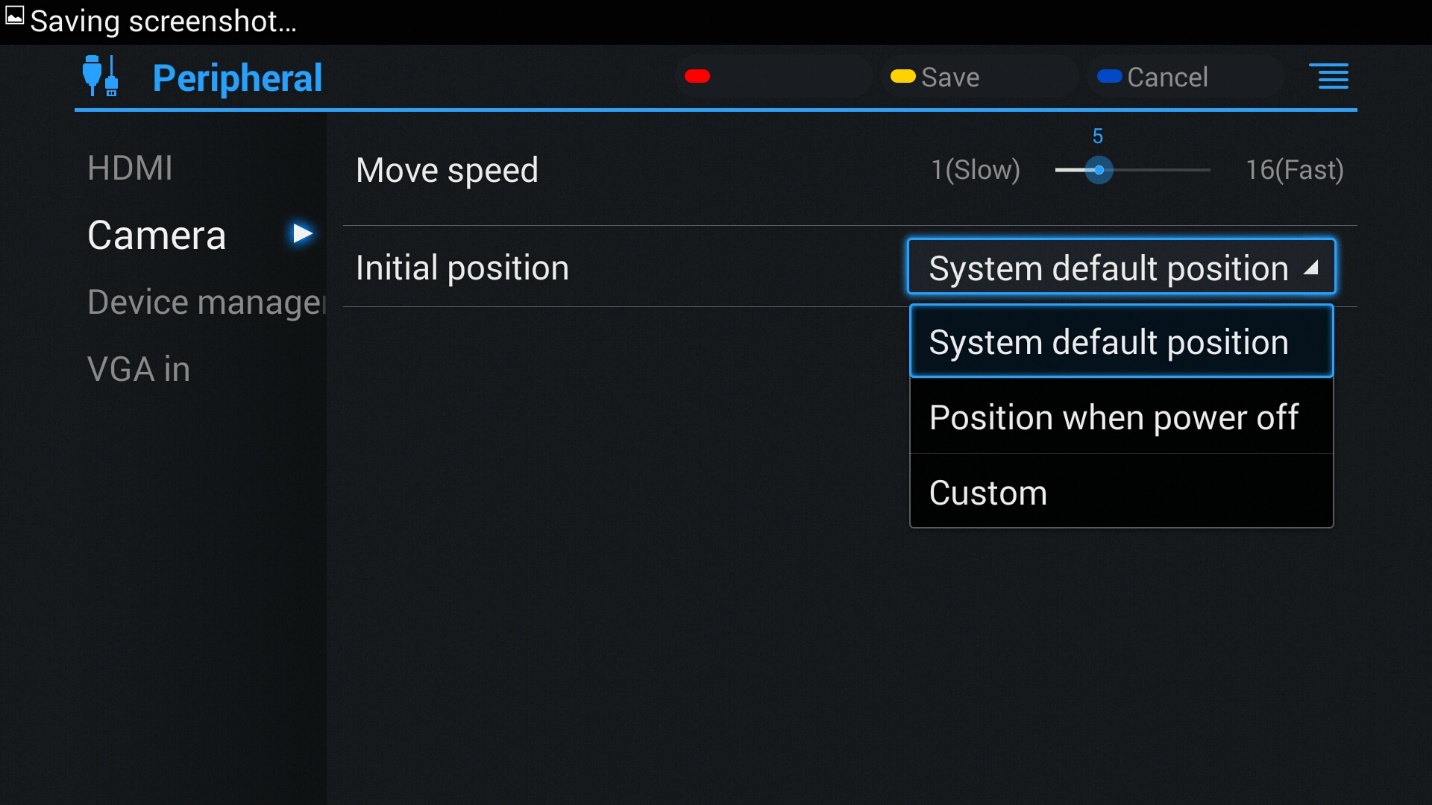
Camera Parameters Configurations
Press the yellow shortcut key on GVC3200/GVC3202 remote control to bring out camera parameters setting screen as shown below. Refer to the table below and configure the parameters using navigation keys on the remote control.

Table 15: GVC3200/GVC3202 Camera Parameters
Parameters | Descriptions |
Picture Mode | GVC3200/GVC3202 has 4 built-in modes as well as “Manual” for customization. When set to “Manual”, press “OK” key to access each setting to configure sharpness, contrast, saturation, and brightness.
|
White Balance | This is used to display accurate images. Users could set to “Manual” or “Auto”.
|
De-noise | Users could set to “off”, “low”, “medium” or “high”. Higher reduction level brings less image noises. |
Frequency of A.C. | Users could set to 50HZ or 60HZ. |
Red Shortcut Key (MF+) | Manual focus: increase the focal length. |
Yellow Shortcut Key (MF-) | Manual focus: decrease the focal length. |
Blue Shortcut Key (AF) | Auto focus |
PERIPHERAL
External USB Device
GVC3200/GVC3202 USB interface could be connected with a USB mouse, a USB keyboard, or a USB storage device.
Using USB Mouse/Keyboard
When a USB mouse is plugged into GVC3200/GVC3202, users could see the cursor on the screen, move the cursor to perform operations. When a USB keyboard is plugged into GVC3200/GVC3202, users could use GVC3200/GVC3202 remote control to navigate to an input interface, and click on the keys on the keyboard to check if it is installed successfully.
Using USB Storage Device
To connect and access USB storage device:
- Insert USB storage device into USB port at the back of GVC3200/GVC3202.
- It will take a few seconds for GVC3200/GVC3202 to prepare the connection.
- Once it is installed successfully, the USB storage icon will show up on the status bar. Users could go to GVC3200/GVC3202 LCD🡪Applications🡪File Manager🡪USB to access and manage your data.
- Users could view, copy and paste files by using the USB storage device.
SD Card
- Insert your SD card into SD card slot at the back of GVC3200/GVC3202. Please make sure the SD card is inserted with right direction on GVC3200/GVC3202.
- It will take a few seconds for GVC3200/GVC3202 to prepare the connection. Then, the SD card icon will show up on the status bar.
- To access SD Card, go to GVC3200/GVC3202 LCD🡪Applications🡪File Manager🡪sdcard. Tap on it to access and manage your data.
Microphone and Speaker
GVC3200/GVC3202 is equipped with a built-in microphone. Alternatively, you can connect external audio devices to GVC3200/GVC3202 as audio input/output sources. It is recommended to use the external speaker that comes with your GVC3200/GVC3202 package for better compatibility.
If the external speaker supports Bluetooth, users could also pair and connect the speaker to the GVC3200/GVC3202 via Bluetooth. This will provide better mobility and make cabling easier when deploying the GVC3200/GVC3202 conference system in your conference room.
When there are multiple audio devices connected to the GVC3200/GVC3202, the users could configure the audio device priority from LCD Menu🡪Settings🡪Audio🡪Audio Priority, or from web UI🡪Device Control🡪Audio Control: “Audio Device”. Please refer to more details in “Audio Device” option.
Users could go to GVC320x’s HDMI output 🡪 Settings 🡪 Audio 🡪 Audio Priority to check the current Audio Input/Output device. Kindly refer to the screenshot for the new adding feature:
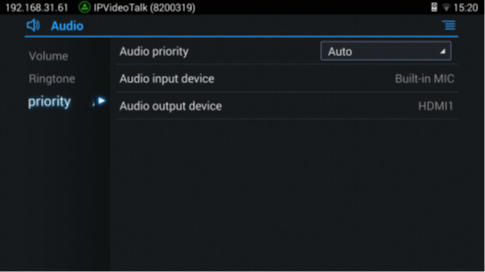
MAKING PHONE CALLS
Account
GVC3200/GVC3202 comes with one IPVideoTalk account, supports one configurable SIP account registration, one H.323 account and one Blue Jeans account. Please enable the IPVideoTalk account, or register SIP account to a SIP server before making calls. The following figure shows the SIP account is registered successfully (account icon is green). This displays on the left side of the top status bar on your LCD display device.

Dial Screen
Once the account is registered successfully, users could use one of the following 3 ways to bring up dial screen to start making calls.
- Press the DIAL icon in the lower right corner of the remote control.
-
On the LCD display device, click on icon
on home screen.
-
On the LCD display device, click on Applications and select
to bring up dial screen.
Enter digits in the dial-up box. If the digits or the letters for the digit match contacts and call history in GVC3200/GVC3202, a dropdown list of numbers will be displayed. For example, entering 5 (JKL), 6 (MNO), 4 (GHI) and 6 (MNO) will display “5646” or “john” if contact “john” exists. The matching characters will be highlighted in red.
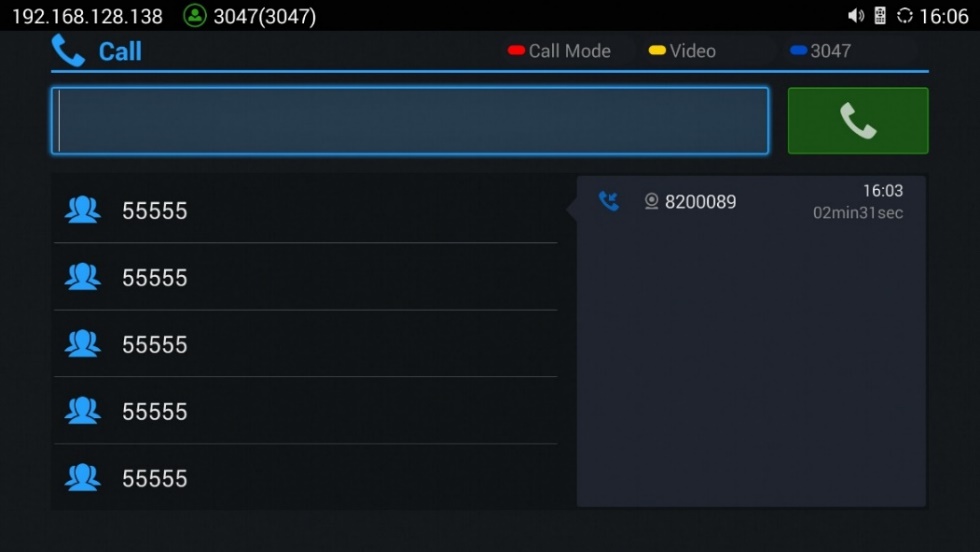
- Press the red shortcut key on the GVC3200/GVC3202 remote control to bring up call mode setting screen, set call mode to Call or IP call.
- Press the yellow shortcut key to set call type to Audio or Video.
- Press the blue shortcut key to switch account among SIP account, H.323 account, IPVideoTalk account and Blue Jeans account.
- Click on “Cancel” icon on the screen, or press key on the remote control to cancel the call.
Dialing a Number Directly
- Open the dial screen.
- Use the remote control keyboard to enter digits, or click the input box to enter digits using the pop out soft keyboard.
- Press on the remote control to dial out, or move the cursor to the icon
on dial screen and click it to dial out.
Redial
Users can dial out the last dialed number if there is dialed call log. Access the dial screen, and then press “#” key or on the remote control to dial out.
Dialing a Number via Contact
Follow the steps below to dial a number via Contacts.
-
On the LCD display device, access Contacts by tapping on button
on home screen.
- Navigate and select in the contacts entries using the remote control navigation keys.
- Press on the remote control to dial out.
Dialing a Number via Call History
-
On the LCD display device, access Applications on home screen and access call history by selecting the icon
.
- The LCD will display all call history types. Navigate in the call history list by selecting the call history category. Select the call history entry you would like to dial out.
- Press on the remote control to dial out.
Direct IP Call
Direct IP Call allows GVC3200/GVC3202 and another VoIP device to talk to each other in an ad-hoc fashion without a SIP proxy. Direct IP calls can be made if:
- Both GVC3200/GVC3202 and VoIP phone have public IP addresses, Or
- Both GVC3200/GVC3202 and VoIP phone are under the same LAN / VPN using private or public IP addresses, Or
- NAT is disabled or GVC3200/GVC3202 NAT is disabled.
Both devices can be connected through a router using public or private IP addresses (with necessary port forwarding or DMZ).
To make a direct IP call, please follow the steps below:
- Access the dial screen on GVC3200/GVC3202 LCD.
- Press the red shortcut key on the remote control to bring up call mode setting screen, set the mode to “IP Call”. This step is optional.
- Input the target IP address. For example, if the target IP address is 192.168.124.123 and the port is 5062, input the following:
192*168*124*123#5062
The * key represents the dot (.) and the # key represents the colon (:).
- Press the yellow shortcut key on the remote control to select “Audio Call” or “Video Call”.
- Press on the remote control to dial out.
Paging/Intercom
Before placing paging/intercom, please make sure the callee has paging/intercom enabled so that it can answer the paging/intercom call automatically. To make paging/intercom call:
- Access the dial screen on GVC3200/GVC3202.
- Enter the number to dial followed by *74. Please refer to Call Features for more details.
- Press the yellow shortcut key on the remote control to select “Audio Call” or “Video Call”.
- Press on the remote control to dial out.
Answering a Call
When the device is in idle and there is an incoming video call made by SIP or IPVideoTalk account, the device will show the call screen as below:
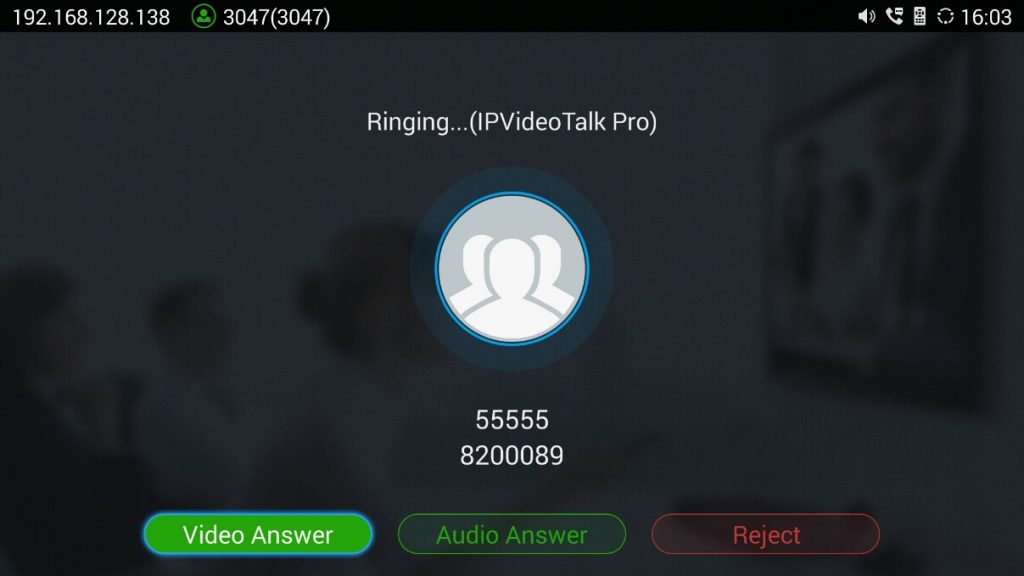
If the incoming video call is made by H.323 account, the call screen will display as bellow:
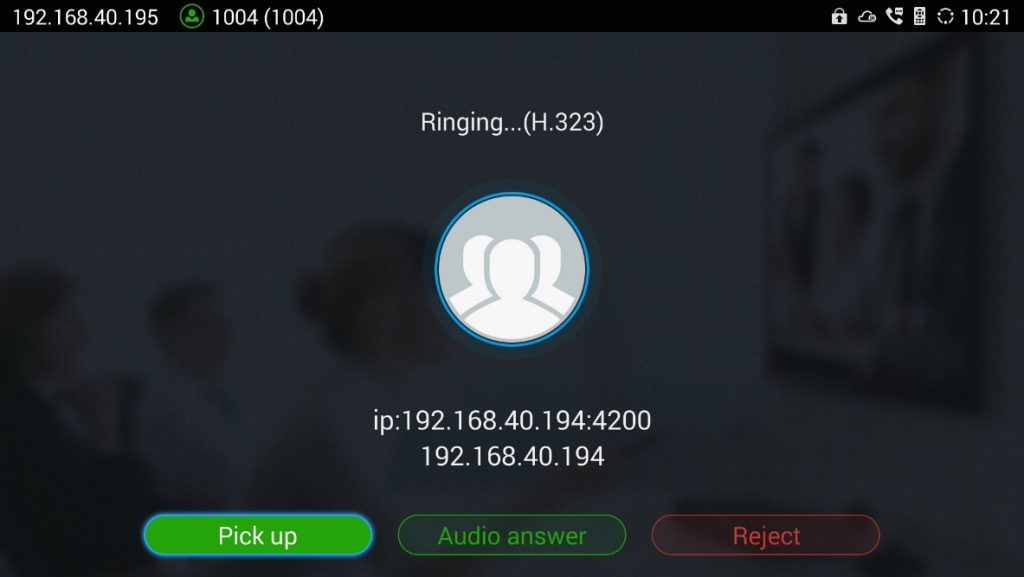
Select “Video Answer” or “Pick up” to answer the call with both video and audio, “Audio Answer” to answer the call with audio only, or “Reject” to reject the call.
When there is an incoming call during an active call, users will hear a call waiting tone with the LCD displaying the caller name and ID for the incoming call.
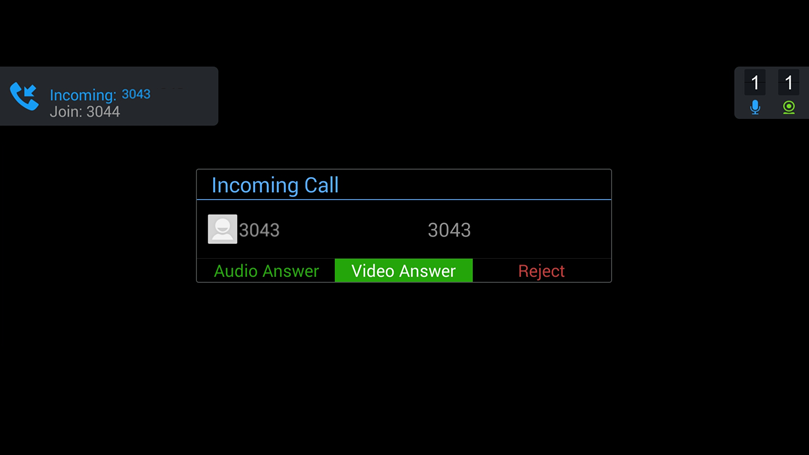
Users could select “Audio” to answer with audio only, “Video” to answer with video and audio, or “Reject” to reject the call.
Call Hold
During an active call, press HOLD button

-
On the LCD display, click on
to resume the call.
-
On the LCD display, click on
or press on the remote control to end the call.
If the current call is a video call, the screen will not display remote video when the call is on hold.
Mute Local Audio
During an active call, press the MUTE button to mute the call, press the button again to unmute the call.
Call Recording
During an active call, users could record the video to the external SD card plugged into GVC3200/GVC3202. Once recorded, users can view the recorded video in Recorder application, and download the video from web UI🡪Maintenance🡪Recording. For more details, please refer to the chapter Recording.
-
During an active call, press the recording key
on the remote control. A red Rec icon will show up on the upper left of the screen.
-
The recording files will be saved to the configured save path automatically when the call is finished. Users could also press
on the remote control to stop recording anytime.
DND (Do Not Disturb)
When DND is on, the incoming calls to GVC3200/GVC3202 will be blocked without ringing. Users could see the blocked calls in call history. Once it is enabled, the DND icon
will be displayed in the status bar on the top of the screen.
- When GVC3200/GVC3202 is in idle screen, users can press button on the remote control to turn on/off DND.
- When GVC3200/GVC3202 is in an active call, users could turn on/off DND in call screen🡪MORE options. This will not affect the current call, and it will take effect starting from the next incoming call.
- At any time, users could log in GVC3200/GVC3202 web UI and click on “DND” on the top tool bar of the web page to turn on/turn off DND.
Missed Call
When there is a missed call, the call icon

Call Forward
Call forward (Unconditional/No Answer/Busy/Time Based) can be set up from web GUI. Log in GVC3200/GVC3202 web GUI and go to Settings🡪SIP Account🡪Call page. For details, please refer to “GVC3200/GVC3202 Administration Guide”.
Conference
Device Layout
GVC3200 supports up to 9-way video conference and GVC3202 supports up to 3-way video conference. GVC3200/GVC3202 can be the host to initiate a conference or join other conferences as a member.
Users can connect multiple HDMI output devices for conference. HDMI 1 interface is the primary output when plugging in multiple HDMI display devices. The device connected to HDMI 1 interface will display local site by default while other devices automatically display remote sites. If the VGA/HDMI IN device is plugged in to GVC3200/GVC3202, the device connected to HDMI 1 interface displays presentation of VGA/HDMI input while other devices will display video view.
During a conference, user can tap on button on GVC3200/GVC3202 remote control trackpad to go back to HOME screen, with the conference video displayed in the background.
Initiating Conference
The conference can be initiated in multiple ways:
- From Call Screen:
- Access the call screen, enter the number in the text box or select members from the list below.
-
Press on the remote control or click on button
on the screen to dial out.
- From Schedule:
For more details, please refer to section Schedule.
Answering an Incoming Call in Conference
You can specify how your GVC3200/GVC3202 handles incoming calls. Depending on your configuration, your GVC3200/GVC3202 answers a call automatically or prompts you to answer a call manually:
- Log in GVC3200/GVC3202 web GUI and go to Settings🡪SIP Account🡪Call page, and set “Auto-answer” option to “Yes”. All incoming calls will be answered automatically. If it is a video call, it will be answered with video as well.
- If “Auto Answer” is set to “No”, users will need to select to answer with video manually, audio or reject the call using the remote control on the LCD prompt.
- If the conference host answers the call, the caller will join into the current active conference.
Conference Management
The following figure shows a 3-way conference:
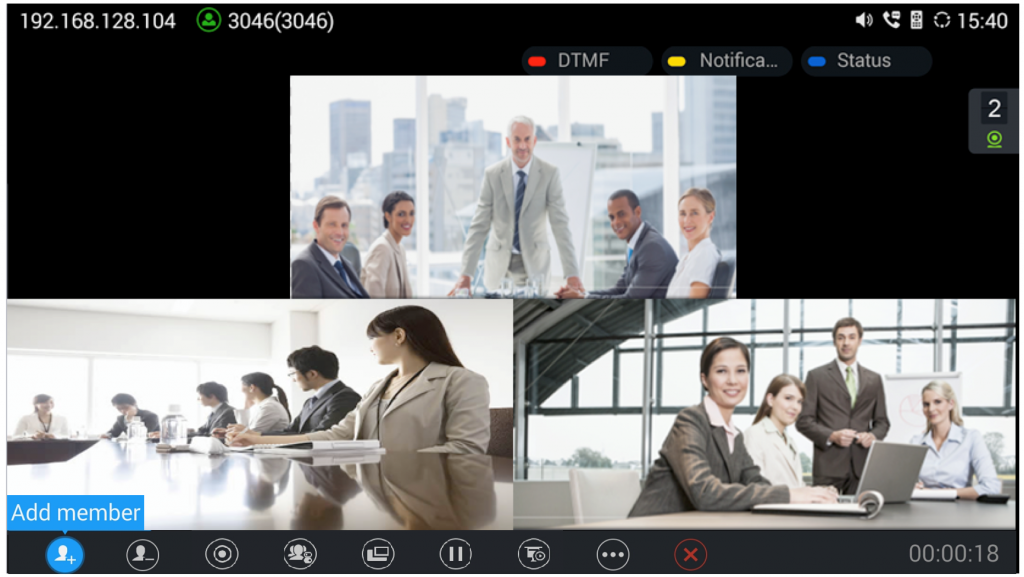
On the bottom of the call screen, users will see a list of icons for menu options. This menu will be automatically hidden if there is no operation in 5 seconds. Press any key to bring up the menu options again.
Here are the functions for each icon.
Table 16: GVC3200/GVC3202 Call Screen Bottom Menu Icons
Icons | Name | Definitions |

| Add Member | Access dial screen and add more numbers to join conference. |

| Delete Member | Select member to remove from the conference. |

| Record | Start/Stop recording the ongoing conference. The recording files will be saved to the configured Save Path automatically. |
| Conference Control | Control video and audio for conference members. It includes the following options for each party:
If the user clicks on this icon again, a video invitation will be sent to this party. The party has to accept the video request in order to see the video again.
|

| Layout | Adjust the layout for the video display for video call. The layout options might vary depending on how many video participants are in the call, how many HDMI outputs are connected and whether presentation is turned on or not. The user can choose to adjust “Local Layout” in order to choose a layout for its own GVC320x, or to adjust “Cloud Layout” to choose a layout that will be shown for all the participants of the conference (this feature needs to be supported on the server side). For example, in a two-way video call on GVC3200 which has one HDMI output connected, after pressing “Layout” icon, users will see options “Average”, “Remote (Local)”, “Local (Remote)”, “Remote” and “Local”. |

| Hold | Pause/resume conference. Once the conference is paused, the device will stop sending local video/audio to the remote parties. |

| Presentation | Turn on/off presentation. HDMI IN or VGA IN must be plugged in first. When HDMI IN or VGA IN is plugged in to GVC3200/GVC3202, after the user selects “Presentation”, the user can select mode “Auto” or “PC” to display presentation.
The GVC3200/GVC3202 that shares presentation will send dual stream. The other participants will receive two streams and can select to display both presentation + video at the same time. If the other participants do not support BFCP, the GVC3200/GVC3202 that shares presentation will only send presentation stream and the participant can show presentation.
The GVC3200/GVC3202 that shares presentation will only send presentation stream, no local video stream. The other participants only see presentation. |

| More | Bring up more options. The options include:
Enable or disable DND.
Display call details such as video packet loss rate, video bit rate, video frame rate, video codec, video resolution, audio packet loss rate, audio bit rate and audio codec for both sending and receiving parties.
To enter DTMF during the call.
This is to set a PIN code to lock this conference call. Once the conference call is locked, the caller who wants to join this conference by calling the conference host must enter the PIN code. |

| End | End conference and go back to home screen. |
- If the remote party is also a GVC3200/GVC3202, you can press the camera key on the remote control to control PTZ device for the remote party.
- Users could press the red/blue/yellow shortcut keys on the remote control to input DTMF, view notifications and view status.
- During an active conference call, if there is a new member joining conference, an outgoing call failed or a member hanging up, there will be a prompt box on the left side of the conference screen showing notifications. The notification prompt will be hidden automatically if there is no new notification in 2 seconds.
- On the right side of the video conference screen, users can see member status such as audio/video calls, or whether if the call is being muted.
Table 17: GVC3200/GVC3202 Conference Member Status Descriptions
Icons | Descriptions |
The current line is in an audio call. | |
The current line is in a video call. | |
The current line is being muted. | |
The current line is not connected. |
-
On the upper left side of the video conference screen, users can see an icon
to indicate network unstable condition, which means the current network condition is not good enough for the video call using the selected resolution/bit rate.
Invite Members to Conference
Users could use one of the following ways to add members:
-
Access the dial screen by clicking on the ADD icon
on conference screen. Then, enter the number to dial out. Once the member answers the call, it will be connected into the conference automatically.
- When GVC3200/GVC3202 is on conference screen, press on the remote control to access the call screen. Then, enter the number to dial out. Once the member answers the call, it will be connected into the conference automatically.
- The member calls the conference number. If the host answers the call, the member will be added into conference automatically.
 Removing Member from Conference
Removing Member from Conference
To remove a member from the conference, click on the DELETE icon on conference screen. Select the member from the member list and press “OK” key to delete it.
 Conference Control
Conference Control
Tap on to make operations such as mute, disable sound, camera control and suspend video. The conference control screen is as shown below:
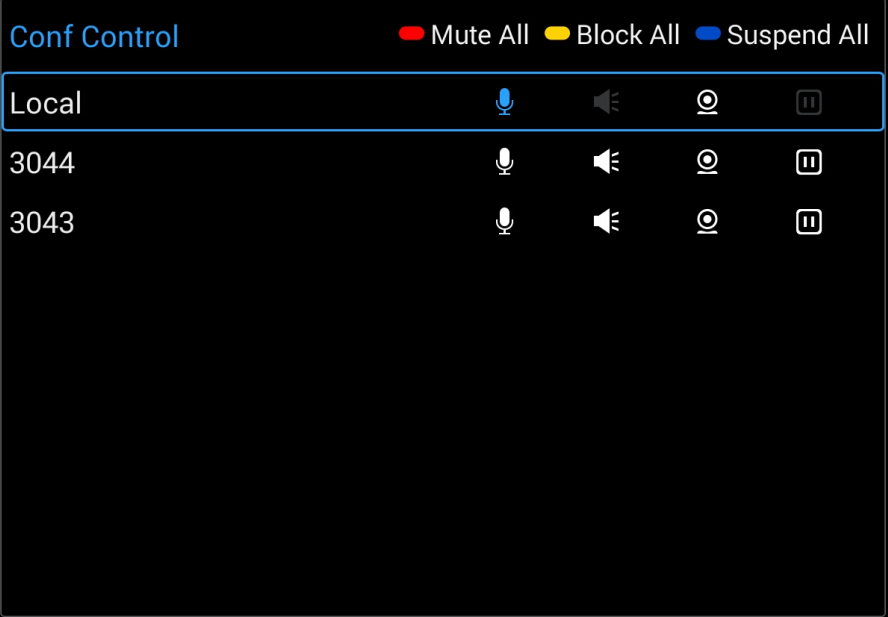
- Use Up/Down navigation keys on GVC3200/GVC3202 remote control to select conference member.
-
Use Left/Right navigation keys on GVC3200/GVC3202 remote control to make operations, press “OK” key to confirm the operation, press “OK” key again to cancel, e.g. tap on to mute one member and the icon will turn to tap on it again to restore.
Pause Conference
The video will be stopped if the conference is paused. You will not see the video view of the members and the other members will not see your video either.
Conference Layout
During a video conference, users can customize screen layout when using multiple connected HDMI outputs, to specify particular video feeds to be displayed on each screen.
Under GVC Call screen🡪Layout, users can choose the most convenient layout.
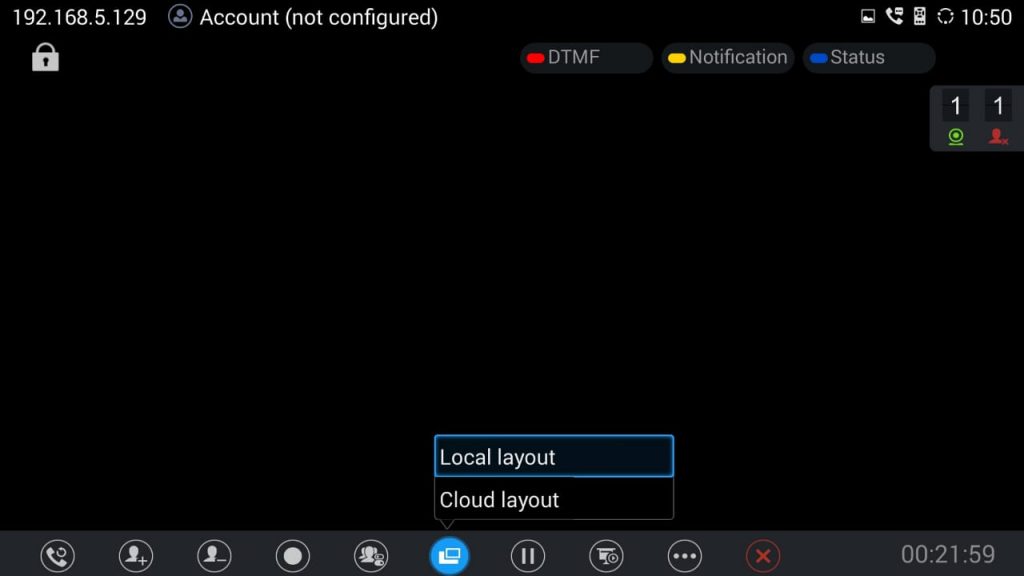
- Local Layout: Users can choose the local layout that will be shown only on the GVC320x where the local layout was adjusted, and not for all the participants. The available local layouts are: Average, Remote (local), local (Remote), Remote and local.

- Cloud Layout: The host user can choose a cloud layout to be used for the whole conference and will be shown for users as well (this feature needs to be supported by the server as well). The available Cloud Layouts are: Tile, Solo, 1+3, 1+5, 1+7,Speaker

- When solo mode meeting layout is set: Users could specify a pane to display a certain participant.
- When Speaker mode meeting layout is set: Users could specify a pane to display a certain participant. The speaker can view all participants video images, and the participants can only view the speaker’s video image.
- Focus 1+N: There are 3 modes for users: “1+3” layout, “1+5” layout, and “1+7” layout, which means one large video image with N smaller video images (polling mode).
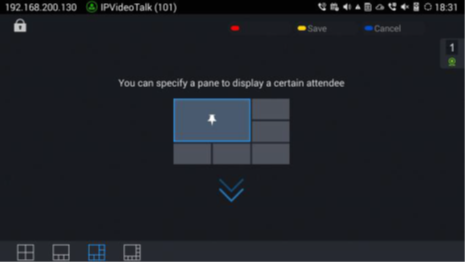
Presentation Sharing
GVC3200/GVC3202 supports dual stream video, with the presentation sharing function, you can connect VGA/HDMI input devices such as a computer, or a DVD player to GVC3200/GVC3202, and share the VGA/HDMI input sources with remote parties while they can still view the local video.
The following figure shows 3 TVs used for GVC3200/GVC3202. The one on the top shows presentation, the two on the bottom show remote party video.

Conference Recording
During a video conference, recording feature is supported on the GVC3200/GVC3202, including video and presentation shared by GVC3200/GVC3202, or IPVideoTalk WebRTC clients. For more details about IPVideoTalk, please refer to the chapter IPVIDEOTALK.
- If Auto presentation mode turns on, only the presentation is recorded.
- If PC presentation mode turns on, the presentation and local video stream are recorded.
- If presentation mode turns off, dual video streams are recorded.
During conference, a new option of cloud recording is added to allow users to control recording, the recording can be done from GVC screen or Web UI as shown below:
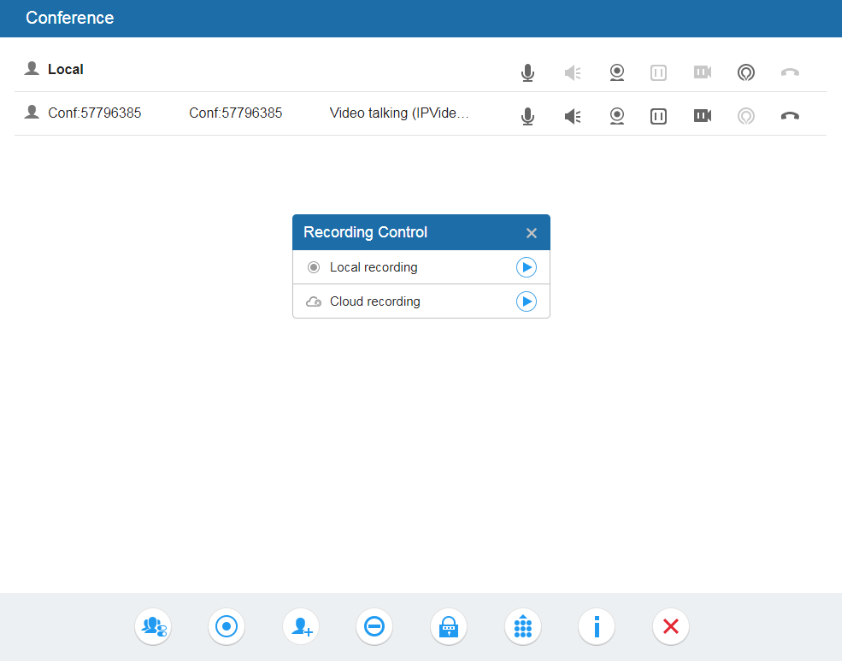
For more details about local recording, please refer to Recording.
For more details about cloud / IPVideoTalk recording, please refer to the chapter IPVIDEOTALK.
-
- Press
on the GVC3200/GVC3202 remote control or the recording icon
on bottom menu to start recording.
- The recording files will be saved to the configured save path automatically when the call is finished. Users could also press
on the remote control or the recording icon
on bottom menu to stop recording anytime.
- Press
Participants List
Users could check all participants in the current IPVideoTalk meeting. If the meeting host does not allow the participants to check all members, the participants cannot see all members in the meeting.
During IPVideoTalk meeting, click on “Conf control”
and GVC320x will show all participants in the current IPVideoTalk meeting, including all participants with all types of clients.
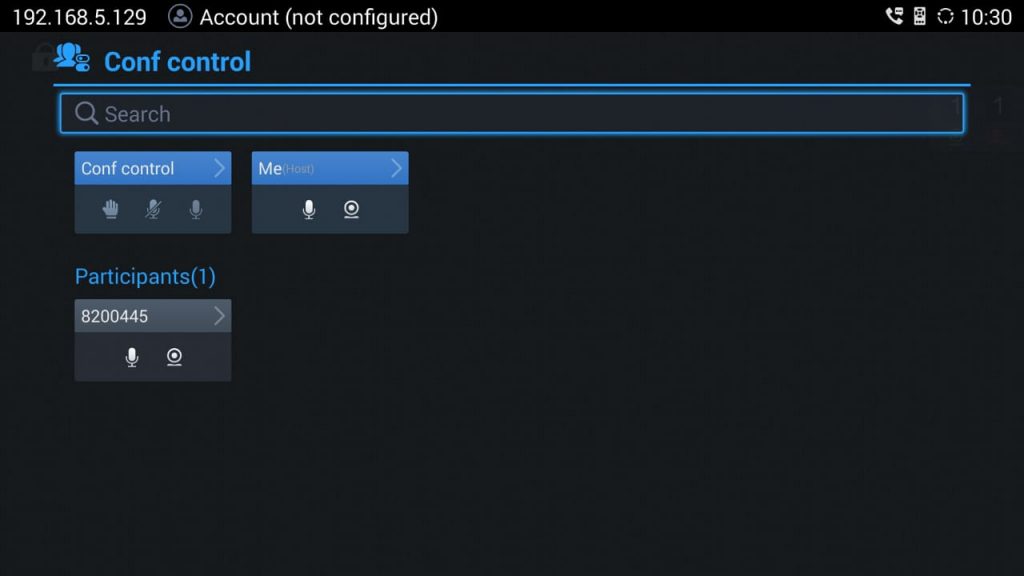
Call Details
Users could view audio and video details of the conference members. On the conference screen, click on

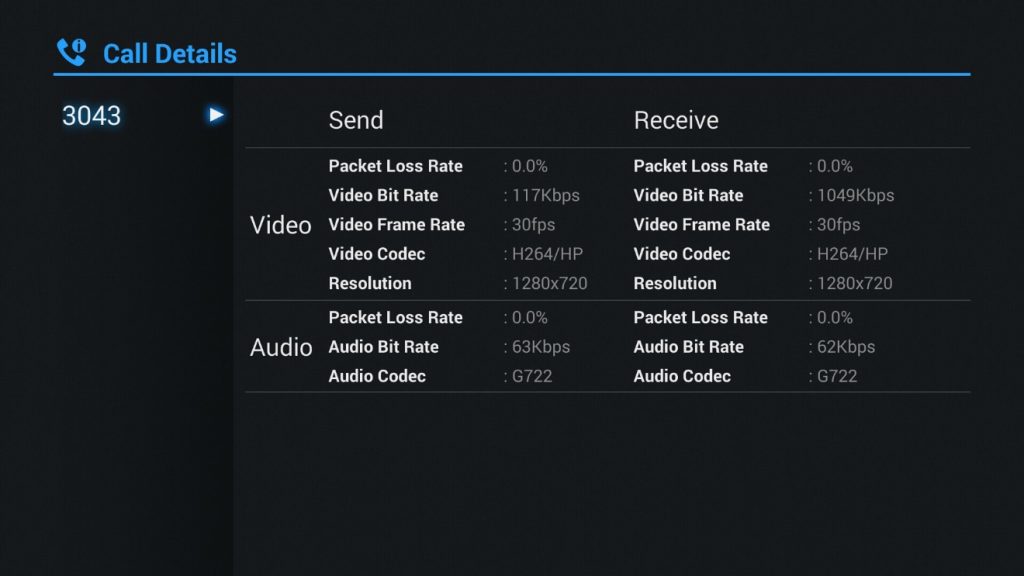
Enabling DND During Conference
When DND is enabled during conference, the new incoming calls will be blocked. On the conference screen, use GVC3200/GVC3202 remote control to click on MORE button

The icon will be displayed on conference screen if the device is set to DND mode. To disable DND, select DND mode again and press “OK” key to cancel it.
Conference Lock
Users could lock/unlock the scheduled conference. Once it is locked, the other incoming calls will not be able to join the conference.
The locked scheduled conference will display
icon on the screen.
Open DTMF
Users can dial DTMF during a conference.
-
On GVC3200/GVC3202 remote control, press the red shortcut key, or click on MORE button
🡪select “Open DTMF” on the conference screen to bring up the DTMF input screen.
- Press the digital keys on the remote control to input DTMF. Press to cancel the operation if needed.
PIN Code
During the conference call, the conference host can set a PIN code to lock the call. Once the conference call is locked, the caller who wants to join this conference by calling the conference host must enter the PIN code.
Here is how to use PIN code to lock the conference call:
- During the call, in the GVC3200/GVC3202 display LCD call screen bottom menu, select MORE🡪PIN Code.
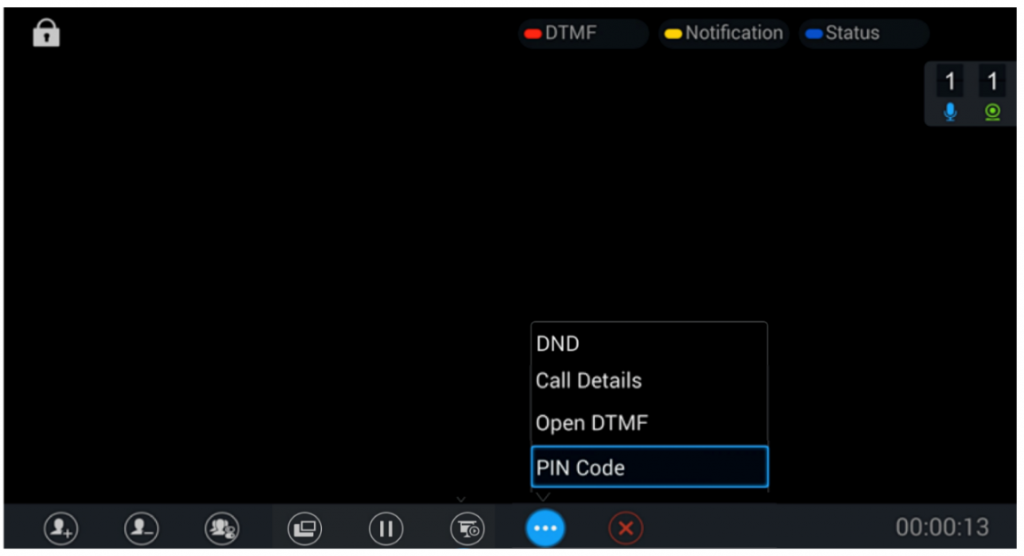
2. Enter the PIN Code to lock the conference call. If it’s empty, the conference call is not locked. Click on OK to confirm.
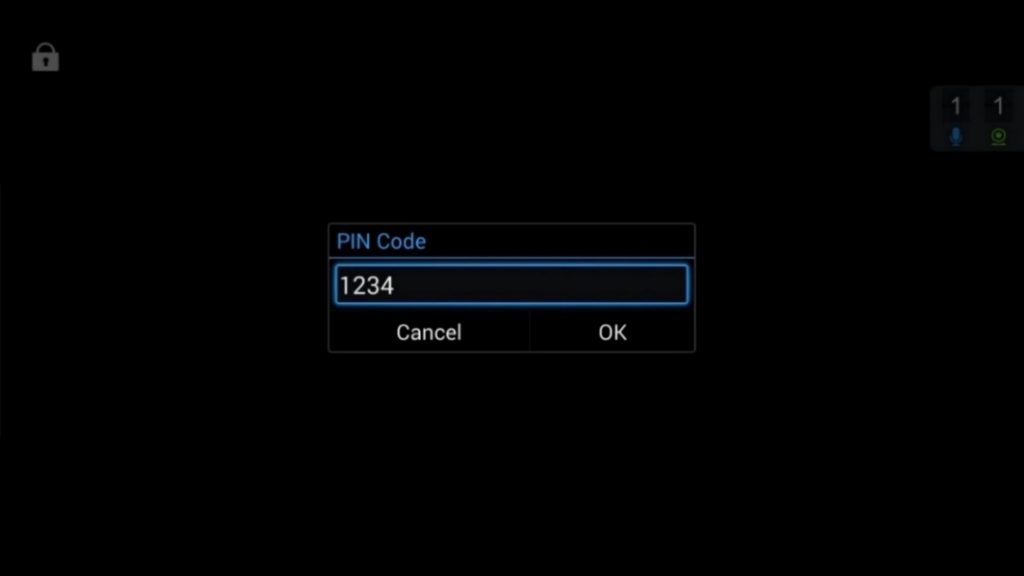
3. Now the conference call is locked. If someone wants to join the conference call by calling this GVC3200/GVC3202, the same PIN code will be required to be entered before the call goes through.
Here is an example on how to use PIN code to enter the locked conference call:
- Make a video call to the GVC3200/GVC3202 that has locks the conference call from another GVC3200/GVC3202.
- The GVC3200/GVC3202 caller will show a video windows with voice prompt asking for PIN code.
- On the GVC3200/GVC3202 caller’s call screen bottom menu, select MORE🡪Open DTMF. Then input the DTMF with PIN code followed by #.
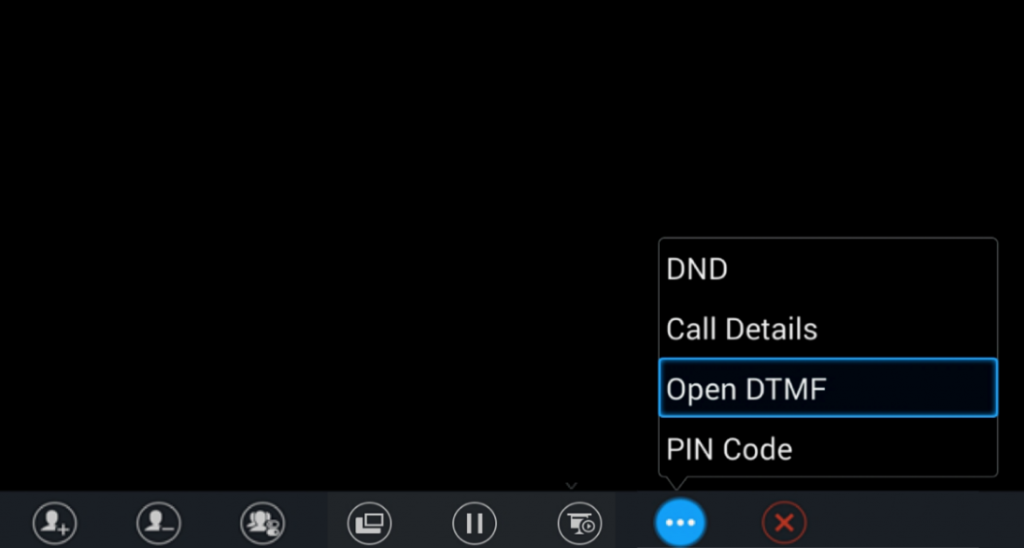
4. The GVC3200/GVC3202 caller joins the conference call after entering correct PIN code in DTMF.
FECC – Camera Control in Conference
During the video call, if the local party (GVC3200/GVC3202) and remote party support FECC, the remote camera can be controlled on the GVC3200/GVC3202.
Here is how to use FECC on the GVC3200/GVC3202 to control remote party’s camera:
- Make sure the GVC3200/GVC3202 and the remote party support FECC and it’s enabled on both parties. For GVC3200/GVC3202, FECC setting is under web UIàSettingsàAccount SettingsàCodec: “Enable FECC”. If the remote party is another vendor’s video device, please check the documentation from the vendor to enable FECC
- Establish video call between GVC3200/GVC3202 and the remote party.
- On the GVC3200/GVC3202 remote control, press the camera button
and the following prompt pops up on GVC3200/GVC3202 display device.
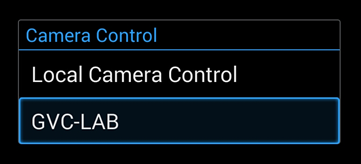
4. Use UP/DOWN/OK navigation keys on the GVC3200/GVC3202 remote control to select the remote party, e.g., GVC-LAB in the above figure. This will bring up camera control interface.
5. On the GVC3200/GVC3202 remote control, press the navigation keys and zoom in/zoom out buttons on trackpad to adjust remote camera.
End Conference
To end the conference, tap on END button
or press key on GVC3200/GVC3202 remote control to either “Exit Conference” or “End Conference”. If GVC3200/GVC3202 is the conference host:
- Select “Exit conference” so that the GVC host will leave the conference itself while the IPVT conference will still be going on. The GVC host can join back the conference by pressing the remote control’s button in order to continue/end the meeting.
Note: The conference can be ended by WebRTC host or admin through web portal afterwards as well.
- Select “End conference” so that the IPVT conference will be ended and all of the other participants will be disconnected from the IPVT server.
If the conference member hangs up the call, it will be disconnected from the conference, but other parties in the conference will stay in the conference.
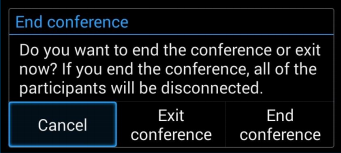
End Meeting Reminder
The maximum duration of an IPVT meeting is 6 hours, a prompt will be shown during meeting 5 minutes before the server ends the meeting. This is a reminder for customers during the meeting to alarm them that they are exceeding the maximum duration so that they can take necessary actions.
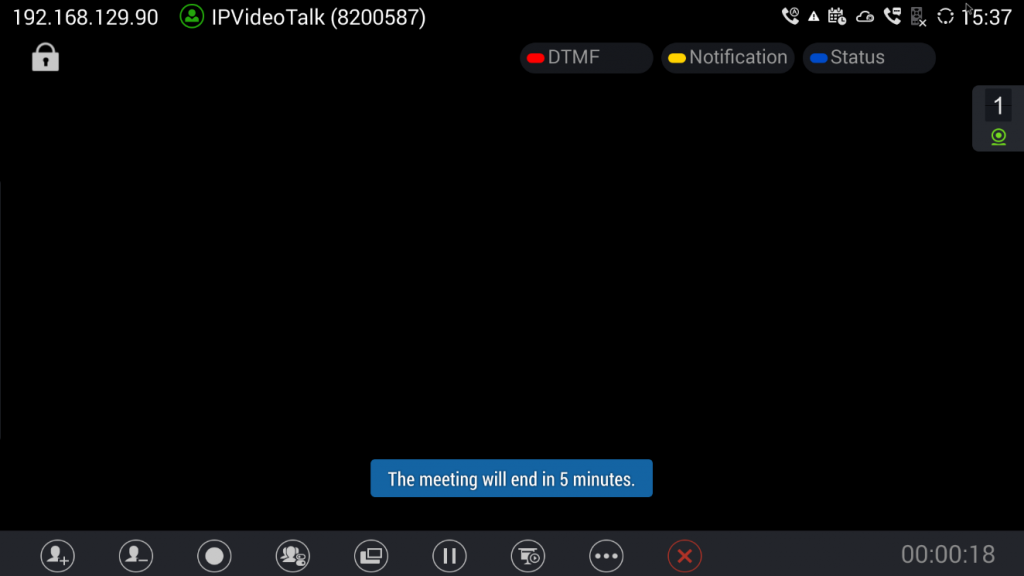
Power Off During a Conference Call
During the meeting, if the user presses Power ON/OFF button, a new dialog will be prompted that allows user to end the current call and shutdown GVC320x immediately. Choose “Power off” to end the conference call and power off the GVC320x immediately, or choose “Power off when idle” to shut down the device when the conference call is ended.
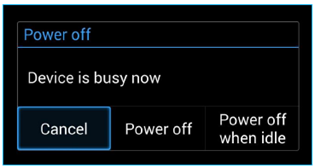
Schedule
Schedule feature allows users to set a specific time to host a conference in advance, with conference reminder and members.
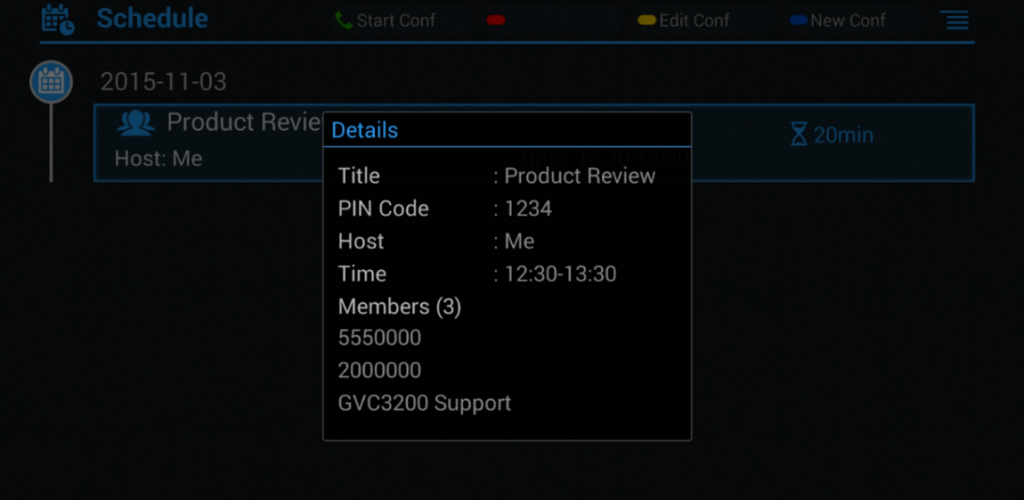
Follow one of the ways below to access schedule conference screen:
-
On the home screen, click on CONFERENCE button
.
-
On the home screen, click on APPLICATION button
and select
.
- Users will see the scheduled conferences (after the current time) in the schedule screen. Select one conference entry to view details.
View Conference Details
Users could view scheduled conference details after the current time. Select one conference and press “OK” key on GVC3200/GVC3202 remote control to view conference details.
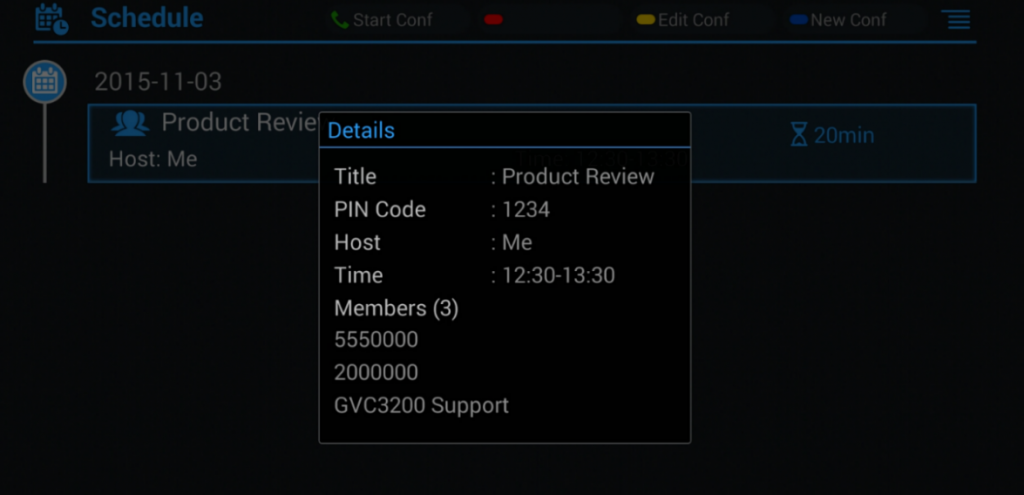
Add Scheduled Conference
Follow the steps below to add a scheduled conference:
-
On the home screen, select
to access schedule screen.
- On GVC3200/GVC3202 remote control, press the yellow shortcut key to create a new conference.
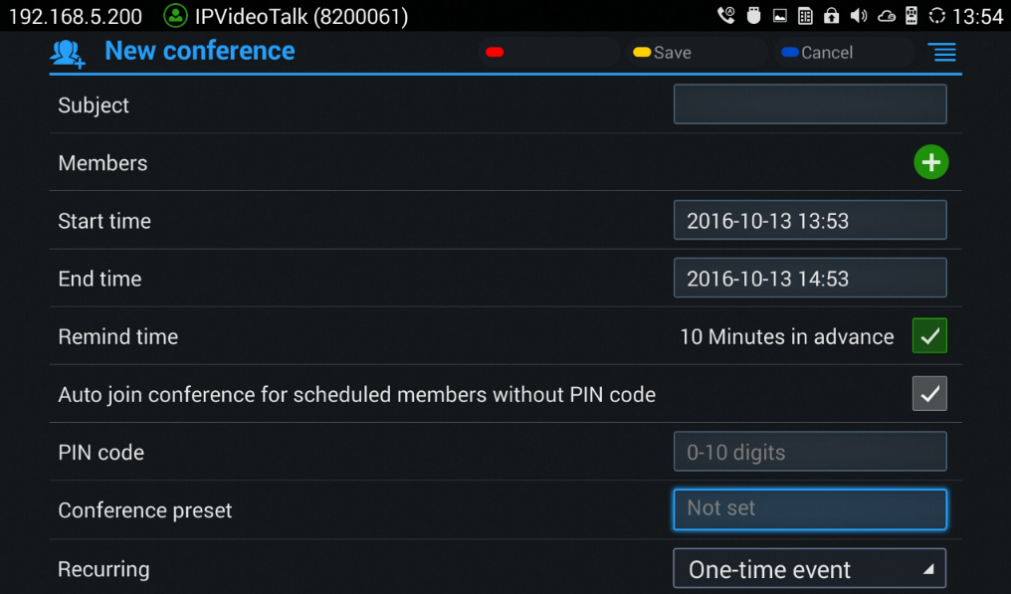
3. Fill in conference name, members, start time, conference duration and etc.
4. Press the yellow shortcut key on the remote control to save the scheduled conference.
Table 18: GVC3200/GVC3202 Add Conference Parameters
Parameters | Descriptions |
Subject | It is used to set the conference name to identify this conference. |
Members |
Click on button
|
Start Time | It is used to configure the start time of the conference. |
End Time | It is used to configure the end time of the conference. |
Reminder Time | It is used to configure whether to remind users in advanced. A prompt dialog box will pop up on GVC3200/GVC3202 screen 10 minutes before the conference starts. |
Auto Join Conference for Scheduled Members without PIN Code | It is used to configure whether PIN code is required when the scheduled members join the conference. If enabled and the scheduled conference has PIN code configured, the scheduled members will automatically answer the call without PIN code required. |
PIN Code | Configure PIN code for the conference. It can be number 0 – 9 and up to 10 digits can be configured as PIN code. |
Conference preset | It is used to select a camera preset when the scheduled conference starts, the GVC3200/GVC3202’s camera will be automatically placed to the preset position. Click on Conference preset and select “Custom” to be redirected to preset setting interface to configure and set a preset. Default is “Not set”. |
Recurring | Users could select recurring for the scheduled conference, to repeat the conference depending on the chosen option. The recurring options are:
|
Edit Scheduled Conference
Follow the steps below to edit scheduled conference:
- Access conference schedule screen and select the conference entry users would like to edit.
- Press the blue shortcut key on GVC3200/GVC3202 remote control to access edit screen.
- Press the yellow shortcut key on the remote control to save changes, and go back to schedule screen.
Reschedule Conference
- Access schedule screen and select the conference entry users would like to edit.
- Press the MENU key on GVC3200/GVC3202 remote control, and select “Reschedule” option.
- Set new conference start time in the pop out dialog box.
- Click on SAVE button to save changes. If users would like to cancel the changes, users could press on the remote control, or click on CANCEL button on the screen.
Delete Scheduled Conference
Follow the steps below to delete the existing scheduled conference:
- Access schedule screen and select the conference entry users would like to delete.
- Press the MENU key on the remote control, and select “Delete”.
Voicemail
When there is a new voicemail, voice mail icon
will show up as a notification in the status bar. Users could login the web UI🡪Settings🡪Account🡪General Settings to configure the access number for the voicemail.
Follow the steps below to access voicemail:
- Access the dial screen and input voicemail access number.
-
Press on GVC3200/GVC3202 remote control, or click on button
on the call screen to dial into the voicemail box.
- Follow the Interactive Voice Response (IVR) for the message retrieval process.
Users could also go to Home screen🡪Applications and click on “Voice Mail” to access the voicemail box. The number of new voicemail messages will be shown on the voice mail app icon as well. See figure below:
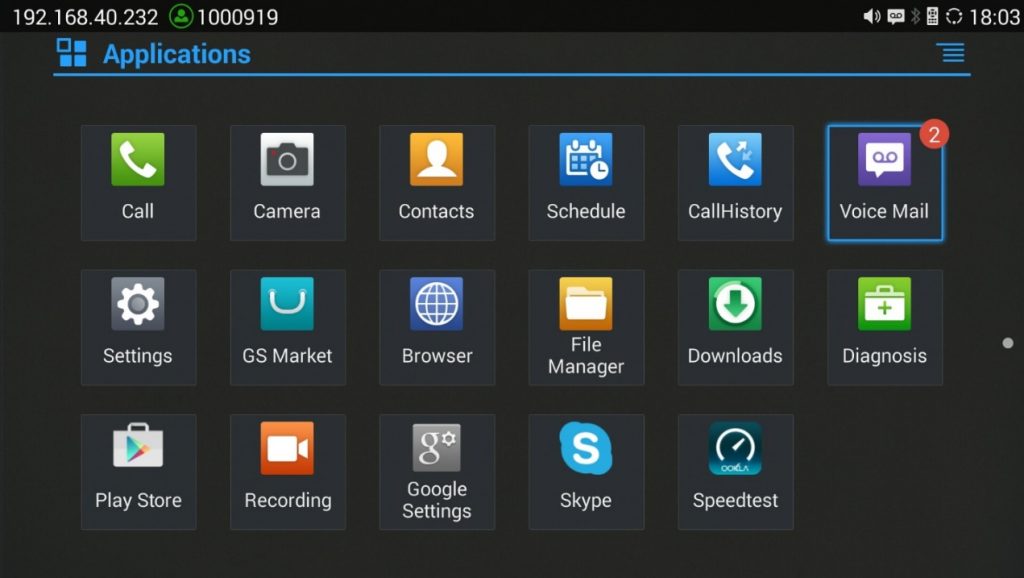
Call Features
The GVC3200/GVC3202 support traditional and advanced telephony features including caller ID, caller ID with caller Name, call waiting, call forward and etc for the SIP account. Before using the following feature code, please make sure “Enable Call Features” option is set to “Yes” under web GUI🡪Settings🡪SIP🡪Call page. Please note this feature doesn’t apply to IPVideoTalk account or BlueJeans account.
Table 19: GVC3200/GVC3202 Feature Code for SIP Account
*01 | Use Preferred Codec (per call).
PCMU: 7110 PCMA: 7111 G722: 722 G722.1: 7206 For example, if the user would like to use PCMA as the preferred codec to call phone number 334455, enter *017111334455. Please note the actual codec being used might be different, which is the negotiation result between the endpoints and SIP server. |
*02 | Force Codec (per call).
PCMU: 7110 PCMA: 7111 G722: 722 G722.1: 7206 For example, if the user would like to force using PCMA to call phone number 334455, enter *017111334455. |
*16 | Enable and force SRTP for all subsequent calls. |
*17 | Disable SRTP for all subsequent calls. |
*18 | Enable SRTP per call. |
*19 | Disable SRTP per call. |
*30 | Block Caller ID (for all subsequent calls).
|
*31 | Send Caller ID (for all subsequent calls).
|
*50 | Disable Call Waiting.
|
*51 | Enable Call Waiting.
|
*67 | Block Caller ID (per call).
|
*82 | Send Caller ID (per call).
|
*70 | Disable Call Waiting (per Call).
|
*71 | Enable Call Waiting (per Call).
|
*72 | Unconditional Call Forward. To set up unconditional call forward:
|
*73 | Cancel Unconditional Call Forward. To cancel the unconditional call forward:
|
*74 | Paging Call.
|
*83 | Force Audio Calling (per call).
|
*84 | Force Video Calling (per call).
|
*90 | Busy Call Forward. To set up busy call forward:
|
*91 | Cancel Busy Call Forward. To cancel the “busy call forward”:
|
*92 | Enable Call Forward No Answer. To set up Call Forward No Answer:
|
*93 | Cancel Call Forward No Answer. To cancel Call Forward No Answer:
|
ADDITIONAL FUNCTIONS
GVC Remote Client Application
Besides using GVC3200/GVC3202 Bluetooth remote control in the package, users could also download the Grandstream GVC Remote Client application, and install it on an Android device. GVC3200/GVC3202 remote control application is used via Bluetooth protocol. Follow the steps below to install the remote control application:
- The GVC Remote apk for Android can be found under GVC3200/GVC3202 LCD menu🡪Applications🡪File Manager🡪Internal storage🡪remote firmware. Users could also directly send the apk file via Bluetooth to your Android device or use the QR code to download to your Android device. Please go to GVC3200/GVC3202 LCD menu🡪Settings🡪Status🡪Remote control to send GVC Remote apk to Bluetooth device or scan the QR code.
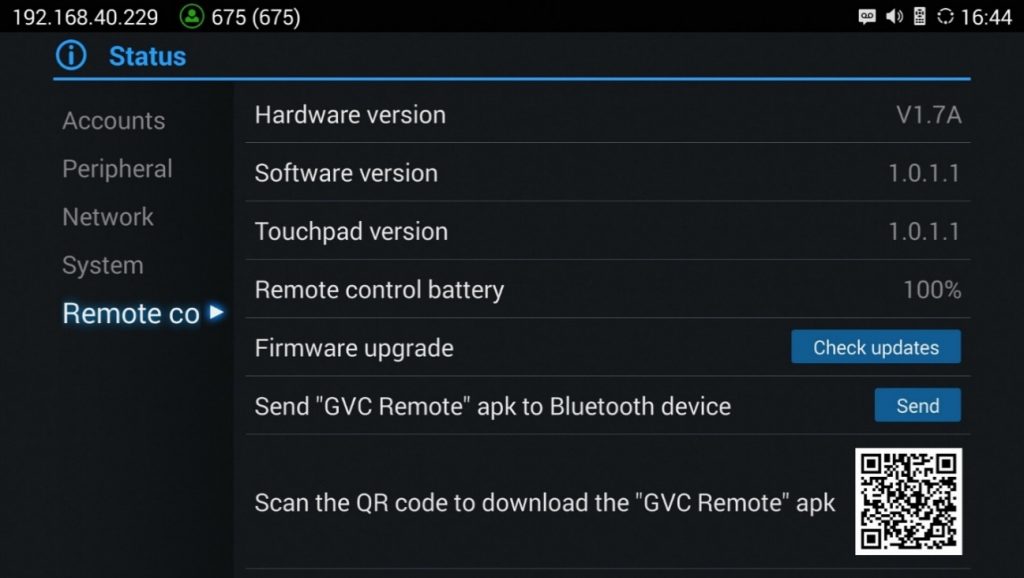
- Once GVC Remote app is installed on your Android device, open it and access settings screen.
- Select the GVC3200/GVC3202 device that users would like to connect to. Each discovered GVC3200/GVC3202 could be distinguished by the last 6 digits of its MAC address.
- Pair GVC Remote app with GVC3200/GVC3202 via Bluetooth. Users might see prompt on GVC3200/GVC3202, and Android device to confirm the passcode during pairing and connection process.
- After pairing and connecting the remote control application, users can use the keys and options on the Android device touch screen to control GVC3200/GVC3202.
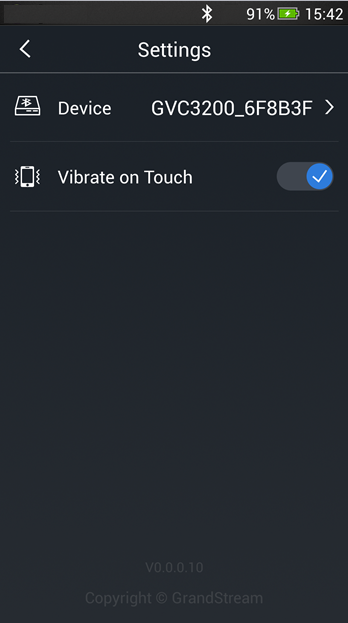
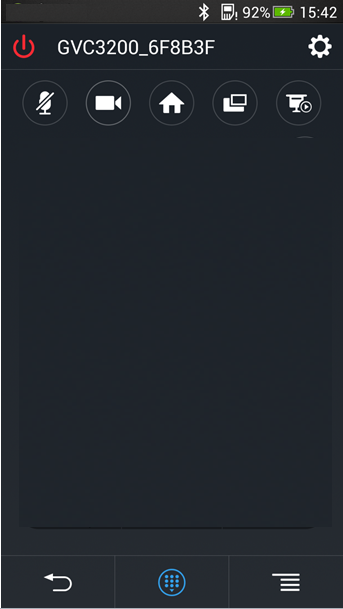
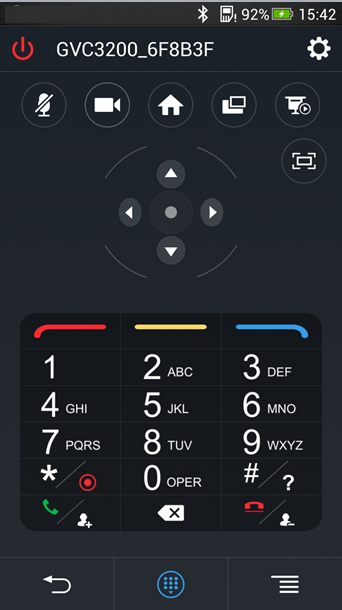
Figure 50: GVC3200/GVC3202 Remote Control Application on Android Device
-
Tap on button
at the upper right corner to access settings screen as the left figure shows above.
-
Tap on button
to go back to home screen as the figure in the middle shows above.
-
Tap on button
to bring up navigation panel and digital keyboard as the right figure shows above, tap on
again to hide the keyboard.
For more information about how to use GVC remote apk on your Android device, please refer to the GVC3200/GVC3202 remote control client quick start guide below:
BlueJeans
GVC3200/GVC3202 has built-in BlueJeans access for users to dial BlueJeans calls. Follow the steps below:
- On the LCD dial screen, press the blue shortcut key on GVC3200/GVC3202 remote control to switch call mode from SIP Call to BlueJeans Call.
- When the call mode shows BlueJeans, input Blue Jeans conference ID and conference password.
-
Press on the remote control or click on button
on the screen to dial out.
For more information about how to use BlueJeans on GVC3200/GVC3202, please refer to the link below:
http://www.grandstream.com/sites/default/files/Resources/gvc320x_BlueJeans_application_note.pdf
APPLICATIONS
GVC3200/GVC3202 provides built-in applications such as Contacts, Call History, File Manager, Browser and etc. Users could also download the apps from GS market to install on GVC3200/GVC3202.
Contacts
GVC3200/GVC3202 Contacts app helps users to easily store and manage phone numbers and contacts information. Users can add contacts on GVC3200/GVC3202 or import contacts from external devices as well as download from a server.
On GVC3200/GVC3202 home screen, click on Contacts icon


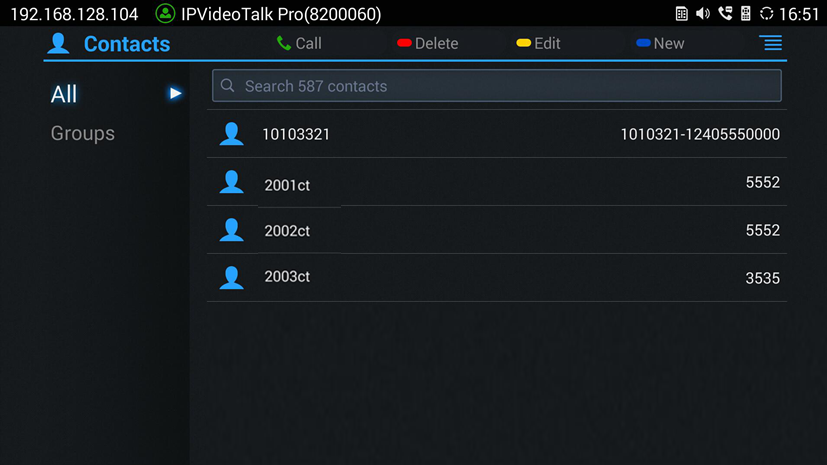
- All
It is used to display all contacts.
- Groups
It is used to view groups. Select one group to view group details.
- Call
Select the contact, and press on GVC3200/GVC3202 remote control or click on button

- Delete
Press the red shortcut key on the remote control to delete contacts.
- Edit
Press the yellow shortcut key on the remote control to edit contacts.
- Add
Press the blue shortcut key on the remote control to access New Contact screen, fill in contact information and press the yellow shortcut key on the remote control to save it.
- Menu
Press on the remote control to access menu to edit/add/delete/export/import/download contacts.
- Contact Details
Select one contact and press “OK” key on the remote control to view contact details.
Add Contact
Add Single Contact
Follow the steps below to add one single contact:
- Press the blue shortcut key on GVC3200/GVC3202 remote control to access New Contact screen.
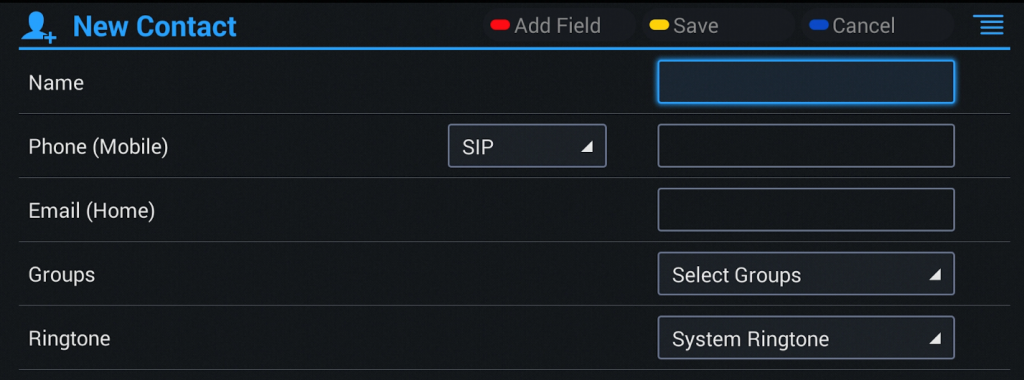
- Enter the contact information.
- Press the red shortcut key to add more fields.
- Press the yellow shortcut key to save the contact information.
Users could press the red shortcut key to add more contact information.
Import function allows users to batch import contacts. The phonebook with compatible format needs to be saved to the storage devices like SD card/USB flash drive and plugged into GVC3200/GVC3202.
- Press the MENU key on Contacts screen, and select “Import” to access Import Contacts screen.
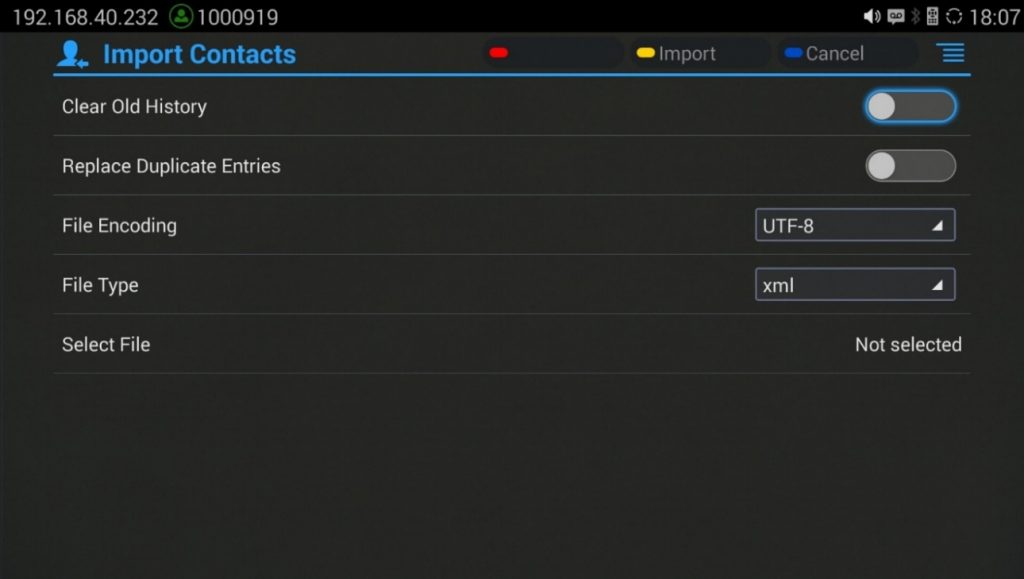
- Configure parameters and select the path to save the imported file.
- Press the yellow shortcut key to save the contact information.
Table 20: GVC3200/GVC3202 Import Contacts Parameters
Parameters | Descriptions |
Clear The Old List | If it is enabled, the previous contact records will be deleted when a new phonebook file is loaded into the device. If it is disabled, both the old contacts and new contacts will be kept in GVC3200/GVC3202. |
Replace Duplicate Entries | If it is enabled, when the phonebook file is imported to the device, the duplicated entries will be removed. If it is disabled, both the old contacts and new contacts will be kept in GVC3200/GVC3202. |
File Encoding | Select the encoding format for XML contact file. |
File Type | Select the file format for phonebook file import. The device supports xml, csv and vcard format. |
Select The File | Select file from storage device plugged into GVC3200/GVC3202. |
GVC3200/GVC3202 supports downloading phonebook from the file server to batch add contacts. The default file name that GVC3200/GVC3202 looks for is “phonebook.xml”. The phonebook XML file should be placed under the file server directory for GVC3200/GVC3202 to retrieve. GVC3200/GVC3202 supports vcard/xml/csv file format.
- On the Contacts screen, tap on the MENU key and select “Download” to bring up the Download Contacts screen.
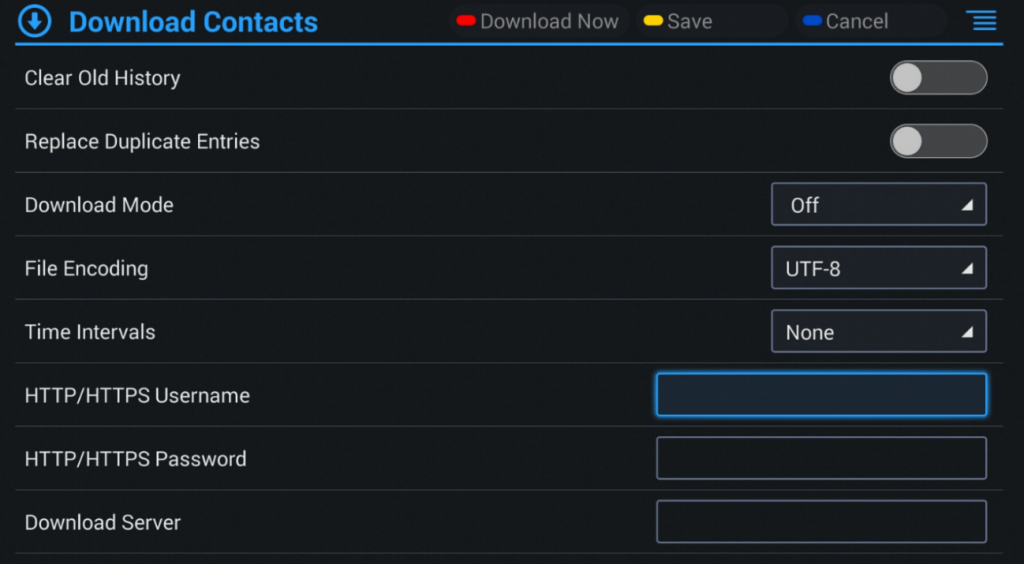
- Configure parameters and select the path to save the file.
- Press the red shortcut key to download the file.
Table 21: GVC3200/GVC3202 Download Contacts Parameters
Parameters | Descriptions |
Clear The Old List | If it is enabled, the previous contact records will be deleted when a new phonebook file is loaded into the device. If it is disabled, both the old contacts and new contacts will be kept in GVC3200/GVC3202. |
Replace Duplicate Entries | If it is enabled, when the phonebook file is imported to GVC3200/GVC3202, the duplicated entries will be removed. If it is disabled, both the old contacts and new contacts will be kept in GVC3200/GVC3202. |
Download Mode | Select the phonebook download mode from TFTP, HTTP or HTTPS. |
File Encoding | Select the encoding format for the XML contact file. |
Time Intervals | Configure the time interval to download XML contact file. |
HTTP/HTTPS Username | Configure the HTTP/HTTPS username for phone book downloading if it’s required by the server. |
HTTP/HTTPS Password | Configure the HTTP/HTTPS password for phone book downloading if it’s required by the server. |
Download Server | Fill in the server URL or IP address to download the XML contact file to the device. |
Search Contacts
In the Contacts app, users could input keyword to search in the dialog. GVC3200/GVC3202 will display contacts automatically which is related to the search keyword. Fuzzy search and precise search are both supported.
Manage Contacts
Delete Contact
- Access Contacts screen and select the contact users would like to delete.
- Tap on and select “Delete” option to delete contact.
Batch Remove Contacts
To delete more than one contacts,
- Select “Batch Remove” option.
- Select the checkbox for the contacts to be deleted, and press the red shortcut key on GVC3200/GVC3202 remote control to delete them. Users could also press the yellow shortcut key on the remote control to select all contacts at once.
GVC3200/GVC3202 supports exporting phonebook as vcard/xml/csv files, and save the files to other external storage devices.
- Press the MENU key on Contacts screen to bring up the Export Contacts screen.
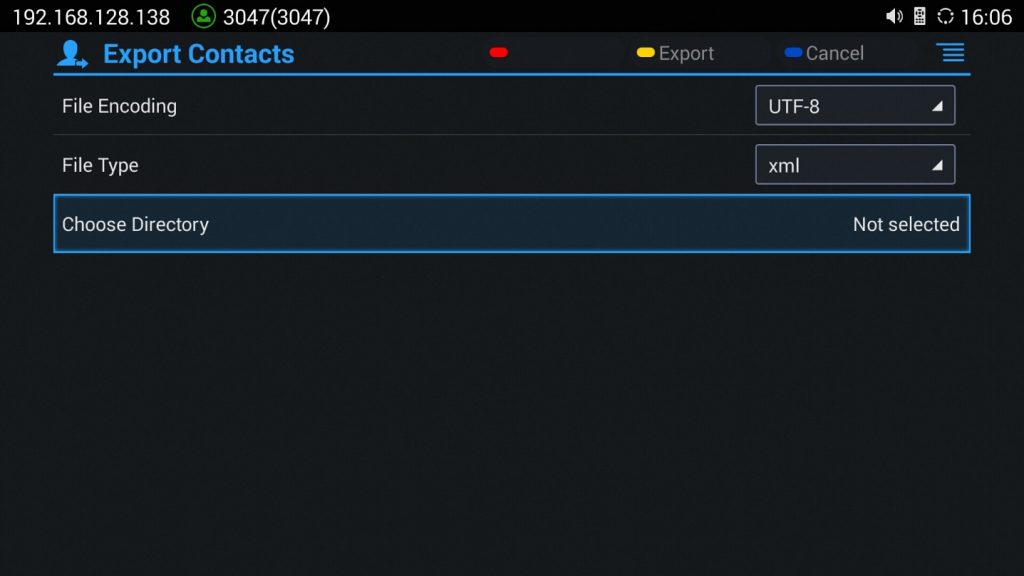
- Configure parameters as shown in table below and select the directory to save the exported file.
- Press the yellow shortcut key to export the file.
Table 22: GVC3200/GVC3202 Export Contacts Parameters
Parameters | Descriptions |
File Encoding | Select the encoding format for XML contact file. |
File Type | Select the file format for phonebook file export. The device supports xml, csv, and vcard. |
Choose Directory | Select directory to save file. |
Groups
Users could divide contacts into different groups with specific names. Select one group entry and press “OK” key to view group details.
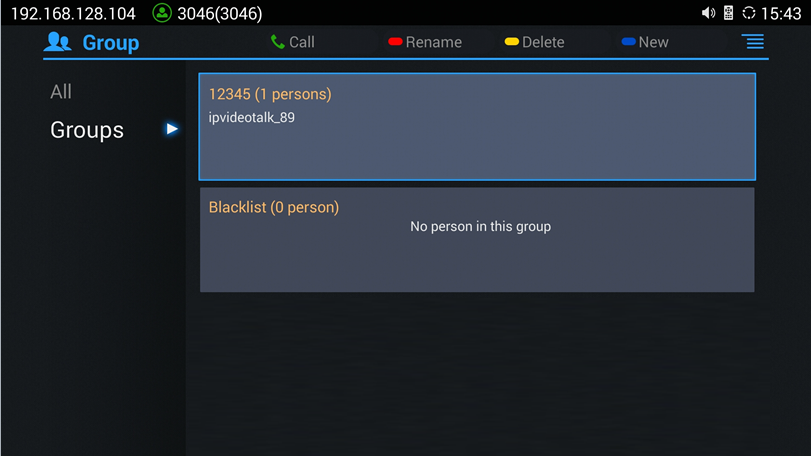
- Call
Press on GVC3200/GVC3202 remote control to call the first 8 members in a group to initiate a conference.
- Rename (red shortcut key)
It is used to rename a group.
- Delete (yellow shortcut key)
It is used to delete a group.
- Add (blue shortcut key)
It is used to add a group.
Add New Group
- Select Groups tab in Contacts screen.
- Press the blue shortcut key on GVC3200/GVC3202 remote control to bring up the screen below:
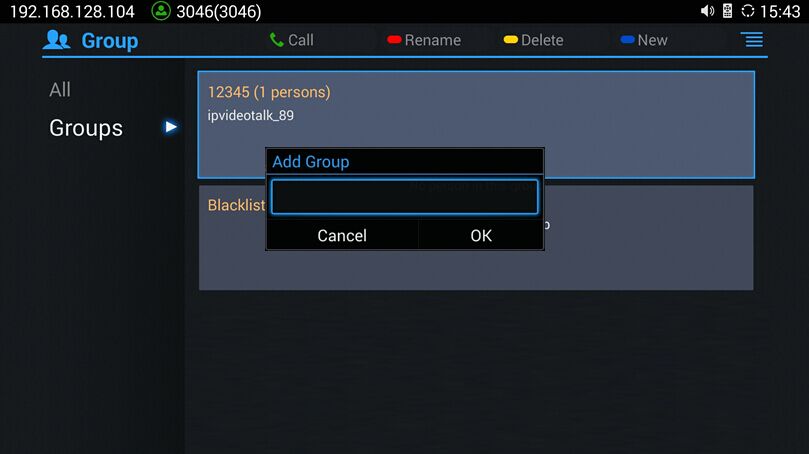
- Input a group name and tap on “OK” to add a new group.
- Go to Contacts Screen to find the group you just added and access it.
- Press the red shortcut key on the remote control to access Groups editing screen.
- Select the contacts users would to add to this group.
- Press the blue shortcut key on GVC3200/GVC3202 remote control to save the operations.
Delete Group
Follow the steps below to delete groups.
- Select Groups on Contacts screen.
- Select the group users would like to delete.
- Press the yellow shortcut key to bring up the dialog box.
- Press “OK” key to delete.
LDAP contacts
LDAP contacts application can be accessed in GVC3200/GVC3202 display device LCD🡪Applications🡪 LDAP Contacts. It helps users access and manage the contacts at ease.
Here is the main interface of LDAP contacts.
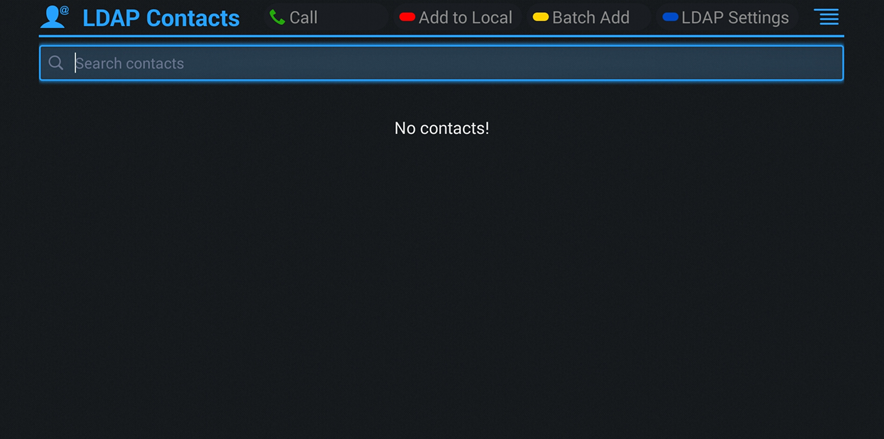
LDAP Settings
Before starting using LDAP on GVC3200/GVC3202, the users must configure the LDAP settings first. Press the Blue shortcut key on the GVC3200/GVC3202 remote control to access LDAP settings, or the users can configure it under GVC3200/GVC3202 web UI🡪Contacts🡪LDAP page.
Table 23: GVC3200/GVC3202 LDAP Settings Parameters
Connection Mode | It is used to select which protocol will be used for LDAP searching, LDAP or LDAPS. |
Server Address | It is used to configure the URI of the LDAP (Lightweight Directory Access Protocol) server. |
Port | It is used to configure the LDAP server port. The default LDAP port number is 389. |
Base DN | It is used to configure the LDAP search base. This is the location in the directory where the search is requested to begin. Example: dc=grandstream, dc=com ou=Boston, dc=grandstream, dc=com |
User Name | It is used to configure the bind “Username” for querying LDAP servers. Some LDAP servers allow anonymous binds in which case the setting can be left blank. |
Password | It is used to configure the bind “Password” for querying LDAP servers. The field can be left blank if the LDAP server allows anonymous binds. |
LDAP Name Attributes | It is used to configure the “name” attributes of each record which are returned in the LDAP search result. This field allows the users to configure multiple space separated name attributes. Example: gn cn sn description |
LDAP Number Attributes | It is used to configure the “number” attributes of each record which are returned in the LDAP search result. This field allows the users to configure multiple space separated number attributes. Example: telephoneNumber telephoneNumber Mobile |
LDAP Mail Attributes | It is used to configure the “mail” attributes of each record which are returned in the LDAP search result. Example: |
LDAP Name Filter | It is used to configure the filter used for name lookups. Examples: (|(cn=%)(sn=%)) returns all records which has the “cn” or “sn” field starting with the entered prefix; (!(sn=%)) returns all the records which do not have the “sn” field starting with the entered prefix; (&(cn=%) (telephoneNumber=*)) returns all the records with the “cn” field starting with the entered prefix and “telephoneNumber” field set. |
LDAP Number Filter | It is used to configure the filter used for number lookups. Examples: (|(telephoneNumber=%)(Mobile=%) returns all records which has the “telephoneNumber” or “Mobile” field starting with the entered prefix; (&(telephoneNumber=%) (cn=*)) returns all the records with the “telephoneNumber” field starting with the entered prefix and “cn” field set. |
LDAP Mail Filter | It is used to configure the filter used for mail lookups. Example: (mail=%) |
LDAP Displaying Name Attributes | It is used to configure the entry information to be shown on phone’s LCD. Up to 3 fields can be displayed. Example: %cn %sn %telephoneNumber |
Max Hits | It is used to configure the maximum number of results to be returned by the LDAP server. If set to 0, server will return all search results. The default setting is 50. |
Search Timeout (ms) | It is used to configure the interval (in seconds) for the server to process the request and client waits for server to return. The default setting is 4000 seconds. |
LDAP Lookup When Dialing | It is used to set if allow the phone system to do the LDAP number searching when making outgoing calls. The default setting is “No”. |
Search LDAP For Incoming Call | It is used to set if allow the phone system to do LDAP number searching for incoming calls. The default setting is “No”. |
Here is an example configuration on GVC3200/GVC3202 LDAP settings in web UI. The LDAP server is the built-in LDAP server in Grandstream UCM6xxx.
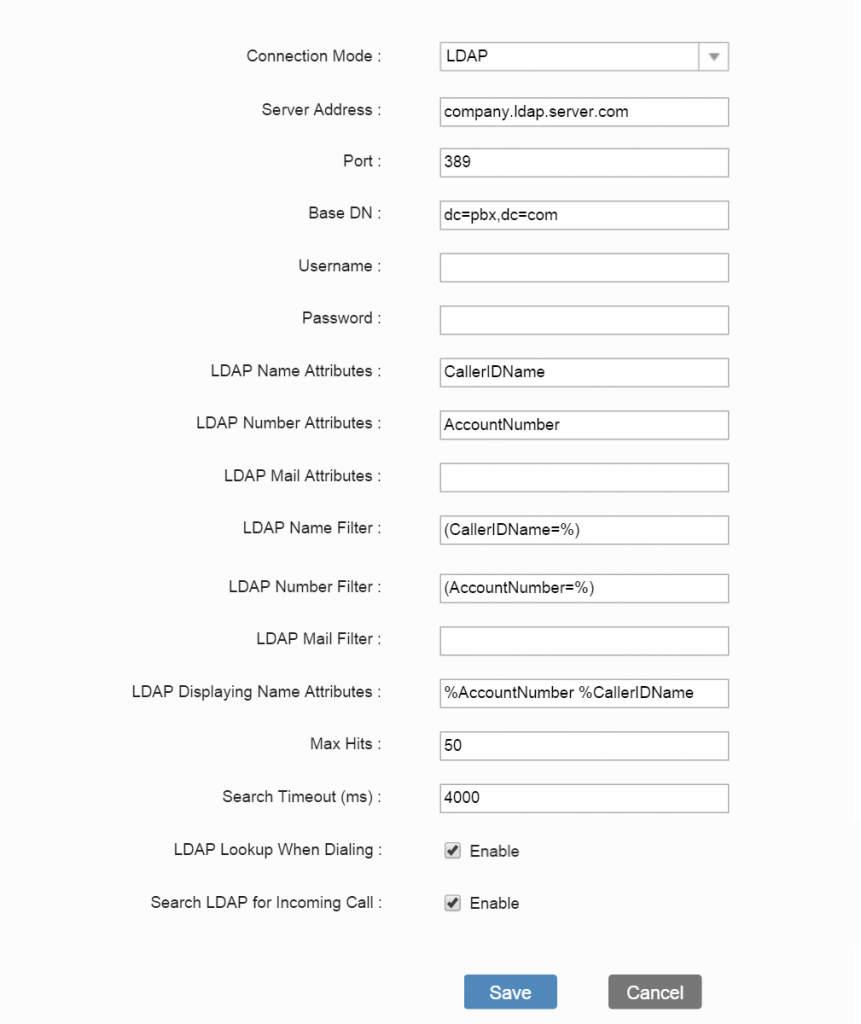
Search LDAP Contacts
After configuring LDAP settings, the users could search contacts in LDAP Contacts main interface. In the following example, the users could enter number or name in the Search field. The LDAP result will be displayed dynamically when the key word is entered.
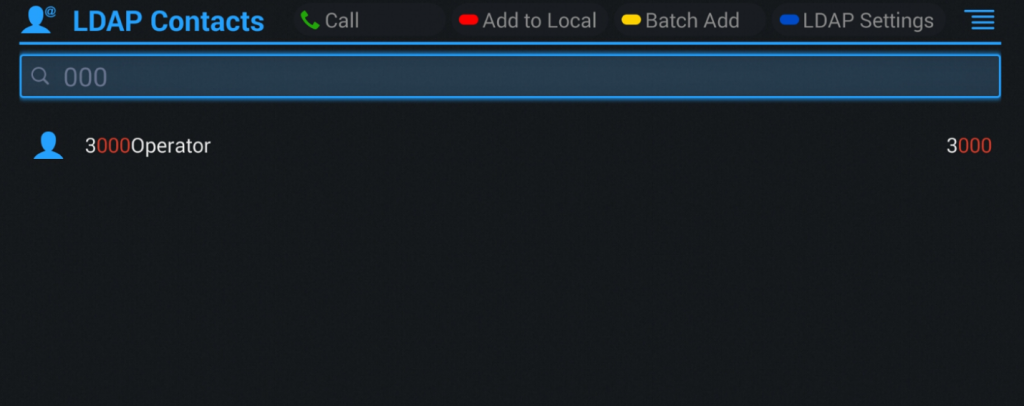
If the user presses the Green Call button
on the GVC3200/GVC3202 remote control, the GVC3200/GVC3202 will initiate a call to this contact.
Add Search Result into Local Contacts
After performing LDAP search, the users could select to add the result into GVC3200/GVC3202 local contacts.
- Add to Local
On the search result screen, move the selection to the contact, then press the red shortcut key on the GVC3200/GVC3202 remote control to add single search result to local contacts. Click on OK to confirm Add to Local.
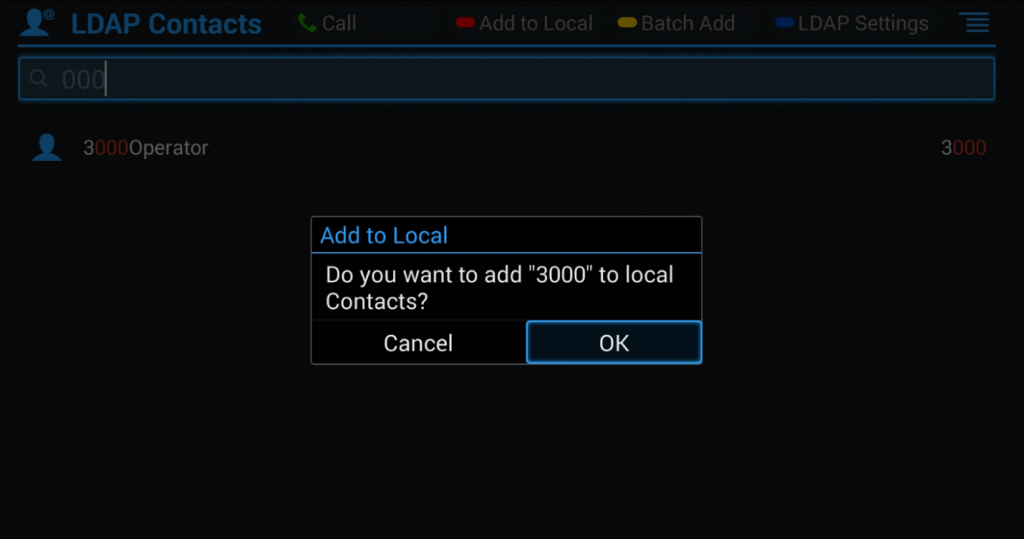
- Batch Add
Press the yellow shortcut key on the GVC3200/GVC3202 remote control, then select the checkbox for multiple search results to be added into local contacts. Press the yellow shortcut key again and the following prompt will pop up. Click on OK to confirm Batch Add.
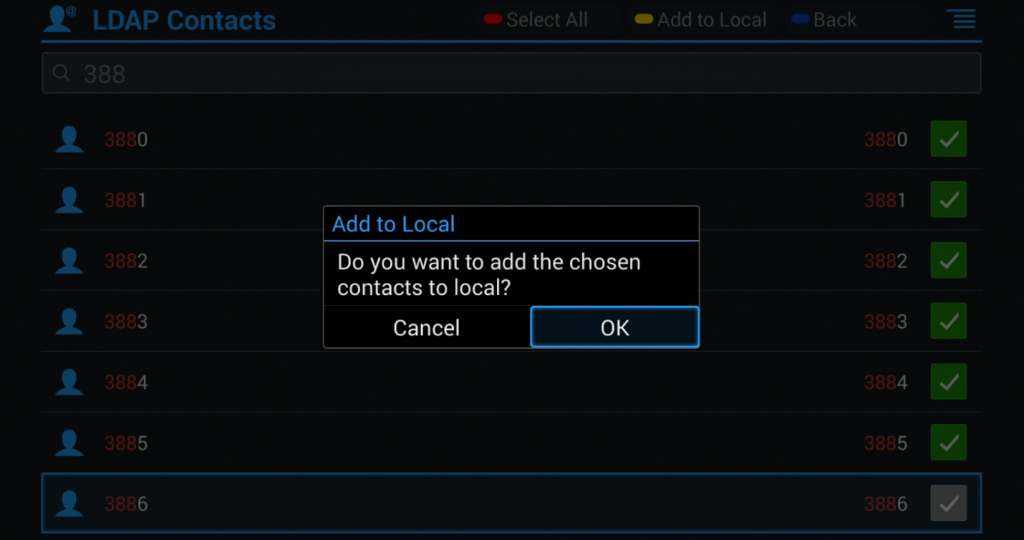
Call History
Call History provides users access to phone’s recent call records. Users can view all records, or select different categories for incoming calls, outgoing calls, missed call and conference.
To access Call History, go to Home screen🡪Applications🡪select

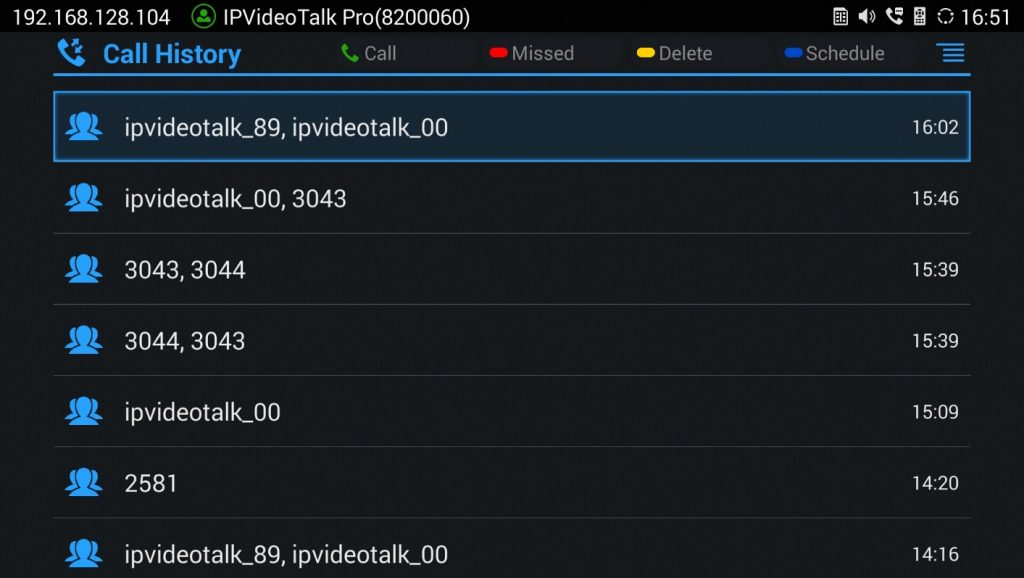
Click on a record in the call history and press to dial out this number directly. Press “OK” key on GVC3200/GVC3202 remote control to view call details for this number.
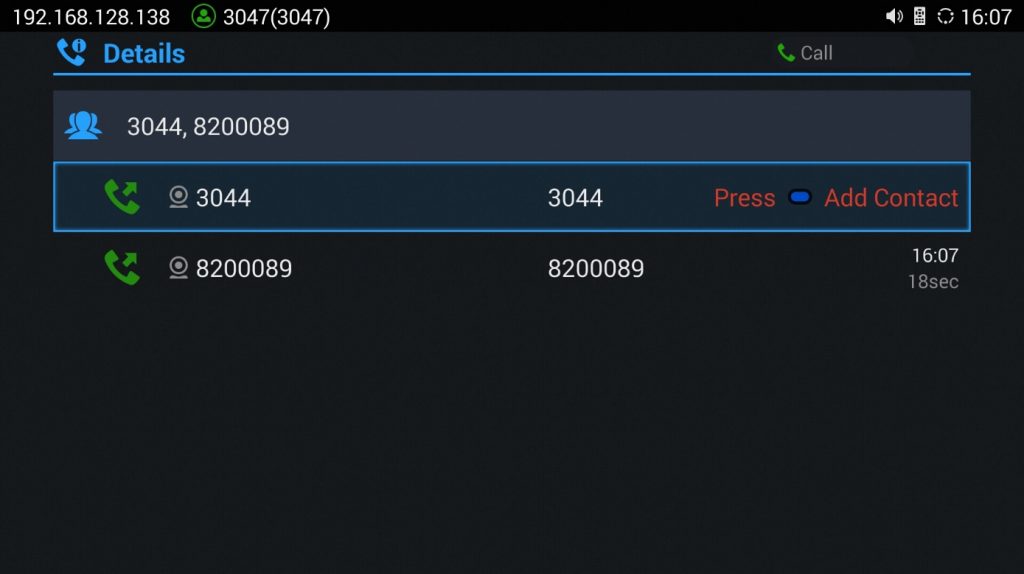
If an entry in call history already exists in GVC3200/GVC3202 Contacts, when the user clicks on the upper right Menu button
on the Call History screen, the users can see and select “View contact” option in the drop-down list to view the details for this contact.
Add Contact from Call History
- Access Call History screen.
- Select one call history entry.
- Press the blue shortcut key to bring up the dialog box.
- Confirm to add the contacts.
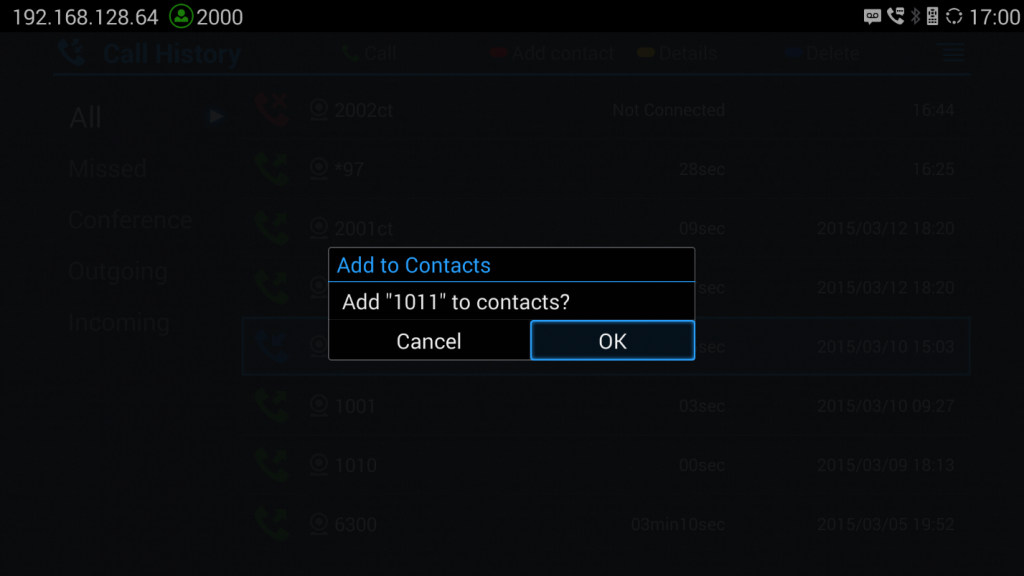
- Select existing contact or press the blue shortcut key on GVC3200/GVC3202 remote control to access edit screen.
- Fill in contact information and press the yellow shortcut key on the remote control to save the contact.
Delete Call History
- Select the call history entry.
- Press the yellow shortcut key on GVC3200/GVC3202 remote control to bring up the dialog box.
- Confirm to delete.
Conference Schedule via Call History
- Select one call history entry users would like to add to scheduled conference.
- Press the blue shortcut key on GVC3200/GVC3202 remote control to access schedule screen.
- Fill in information and press the yellow shortcut to save.
File Manager
File Manager allows users to delete, move, copy, paste, send, rename files (including files on storage device such as USB flash drive and SD card), and query file properties on GVC3200/GVC3202.
Copy File
To copy the file from GVC3200/GVC3202 to USB/SD storage device:
- Insert USB/SD storage device into USB port on GVC3200/GVC3202. It will take a few seconds for GVC3200/GVC3202 to prepare the connection.
- The USB storage icon will show up on the status bar.
- Go to Home screen🡪Applications🡪File Manager.
- Open the target folder.
- Press the yellow shortcut key and select the file.
- Press the blue shortcut key to copy file and press to go back to the upper level directory.
- Select target storage device and go to the directory where the file will be pasted to.
- Press the yellow shortcut key to paste the file.
Users can also select file and press the blue shortcut key to copy one single file or folder.
Send File
- Go to Home screen🡪Applications🡪File Manager.
- Open the target folder.
- Press the yellow shortcut key and select the file.
- Press MENU key on GVC3200/GVC3202 remote control and select “Send” option.
- Select target location and press “OK” key on GVC3200/GVC3202 remote control to send file. If users need to send the file via Bluetooth, enable and connect Bluetooth device first. Otherwise, the interface will be redirected to the corresponding setting page to configure.
Users can also select file and press the MENU key to send one single file or folder.
Delete File
- Go to Home screen🡪Applications🡪File Manager.
- Open the target folder.
- Press the yellow shortcut key and select the file.
- Press the red shortcut key.
- A dialog will pop out for users to confirm whether to delete the file or not.
- Press “OK” key to delete the file successfully.
Users can also select file and press the red shortcut key to delete one single file or folder.
Rename File
- Go to Home screen🡪Applications🡪File Manager.
- Open the target folder.
- Press the yellow shortcut key and select the file.
- Press MENU key on GVC3200/GVC3202 remote control and select “Rename”.
- Input the new file name in the pop out dialog and press “OK” key to save.
Press on GVC3200/GVC3202 remote control to cancel the operation.
Recording
GVC3200/GVC3202 recording application is used for the storage of call recording files in video conferencing. Users can play, export, lock/unlock, send, rename or delete these recordings and etc. The recording screen is as shown below:
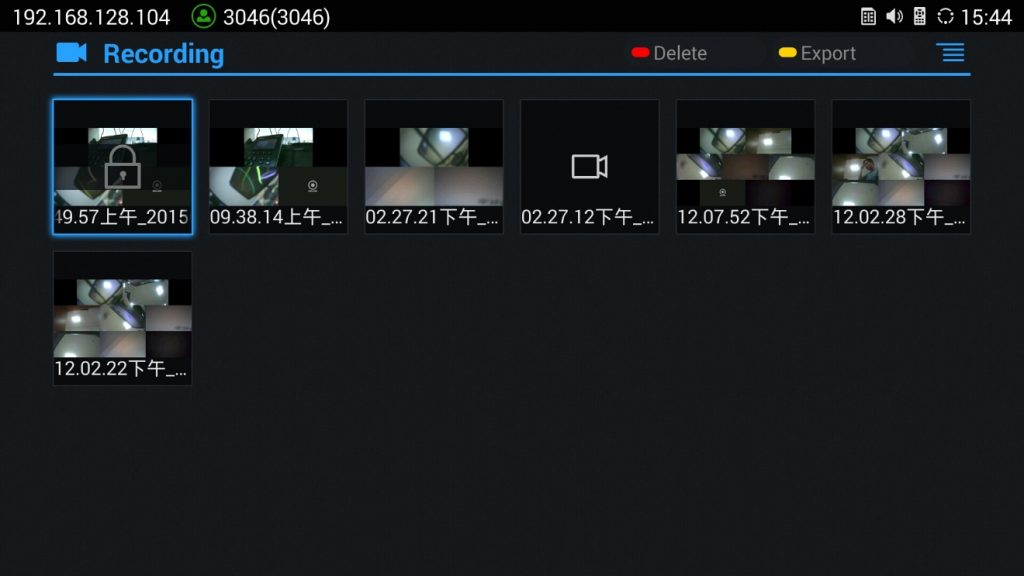
- Press “OK” key to play recording.
- Press the red shortcut key to delete the chosen recording file.
- Press the yellow shortcut key to export the recording files to the external storage device.
- Press the MENU key to make other operations to recording files like export, rename, and lock/unlock.
Save Path
Users can change the default save path for recording to internal storage, a plugged SD card or USB storage device:
Go to Home screen🡪Applications🡪Recording.
Press the MENU key on remote control and select “Settings”.
Plug in external SD card or USB storage device, and select the Recording Save Path.
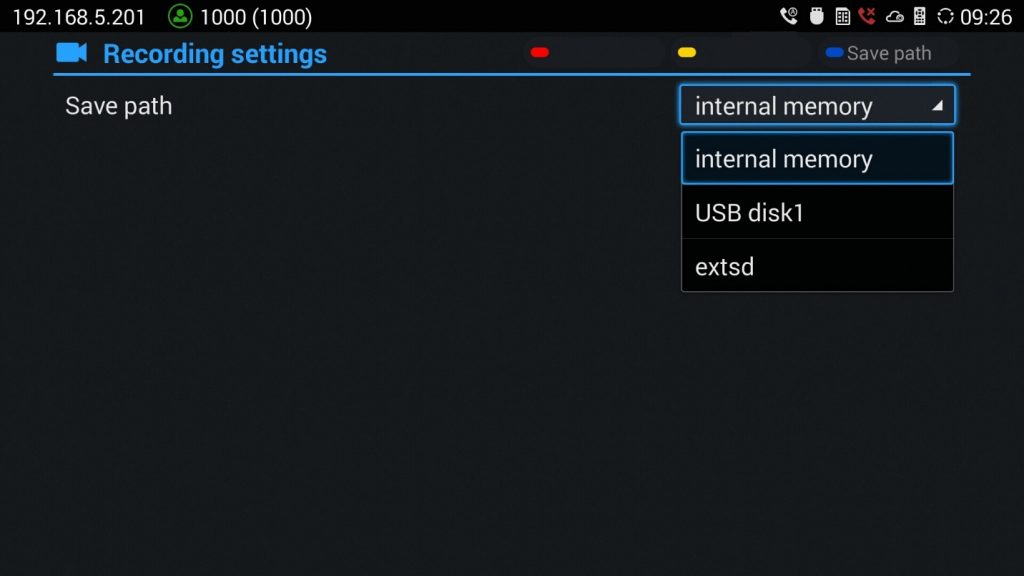
Setup Wizard
GVC3200/GVC3202 offers a Setup Wizard tool to guide users into configuring their units step by step, the setup wizard appears automatically at factory reset, or it can be accessed anytime from LCD menu🡪Applications🡪Setup Wizard.
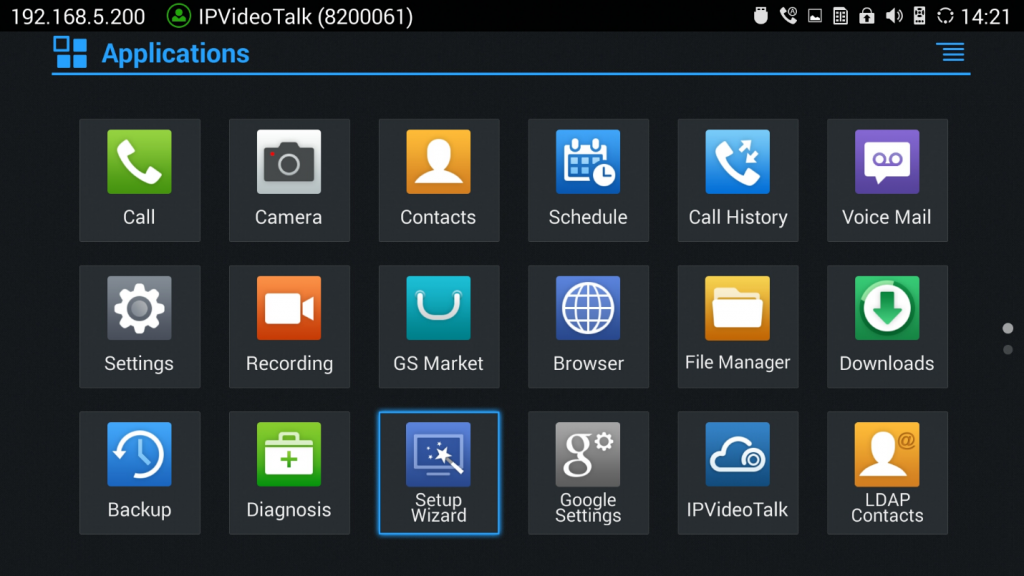
Users can follow the steps using the remote control to setup fields, skip, return, or confirm the action.
Setup wizard tool is useful to lead users to check and configure the GVC3200/GVC3202 settings such as language, accounts, interface status and etc.
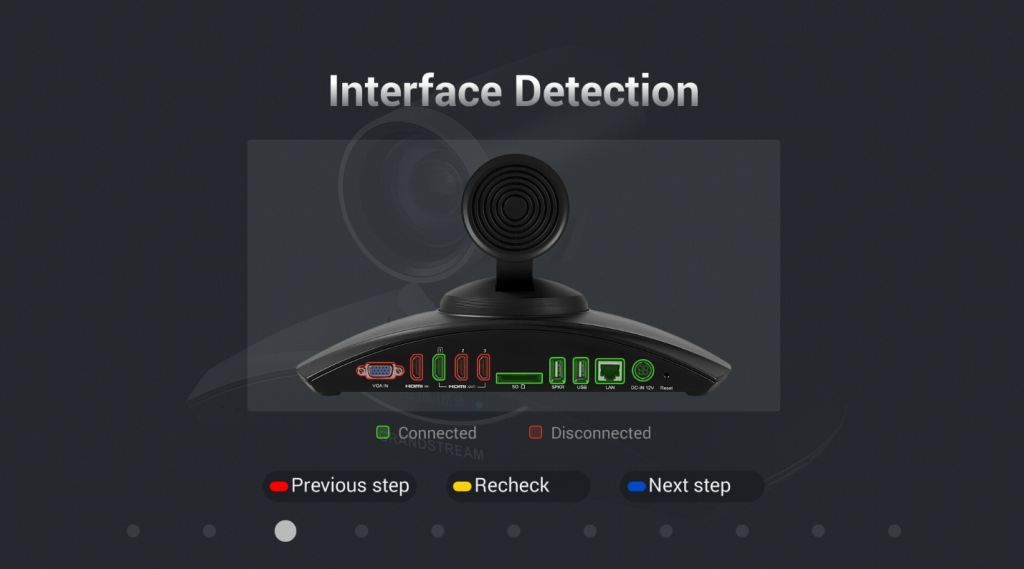
Backup
Backup Data
GVC3200/GVC3202 BACKUP application is used to back up data or import backup files to restore data. It can be accessed from Home screen🡪Applications🡪Backup. The default screen will list available backup files (if any) and backup options.
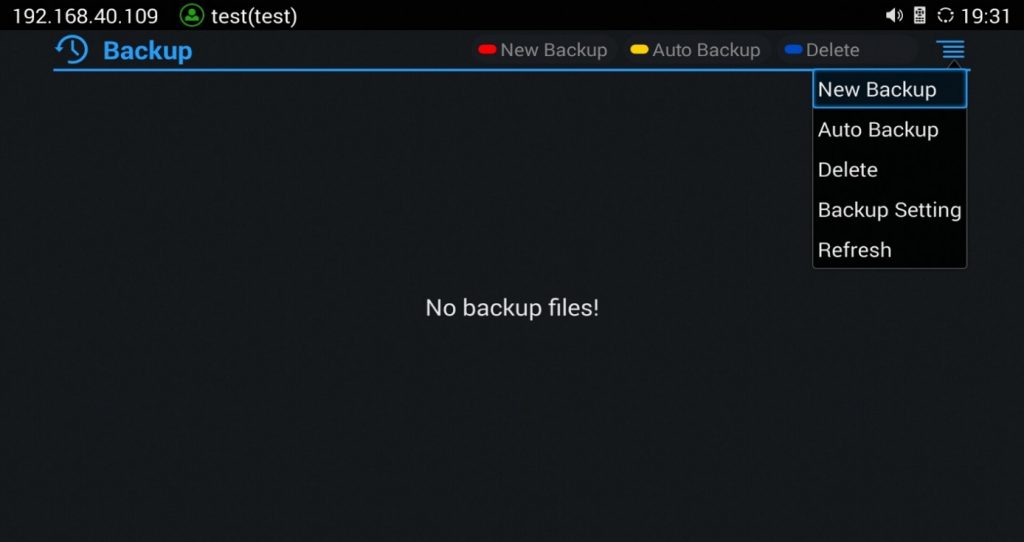
GVC3200/GVC3202 supports manual backup and automatic backup:
- Press the red shortcut key on the remote control to create new backup manually. The user will select data and press the blue shortcut key to start backup.
- Press the yellow shortcut key on the remote control to access automatic backup. Then configure each parameter for automatic backup.
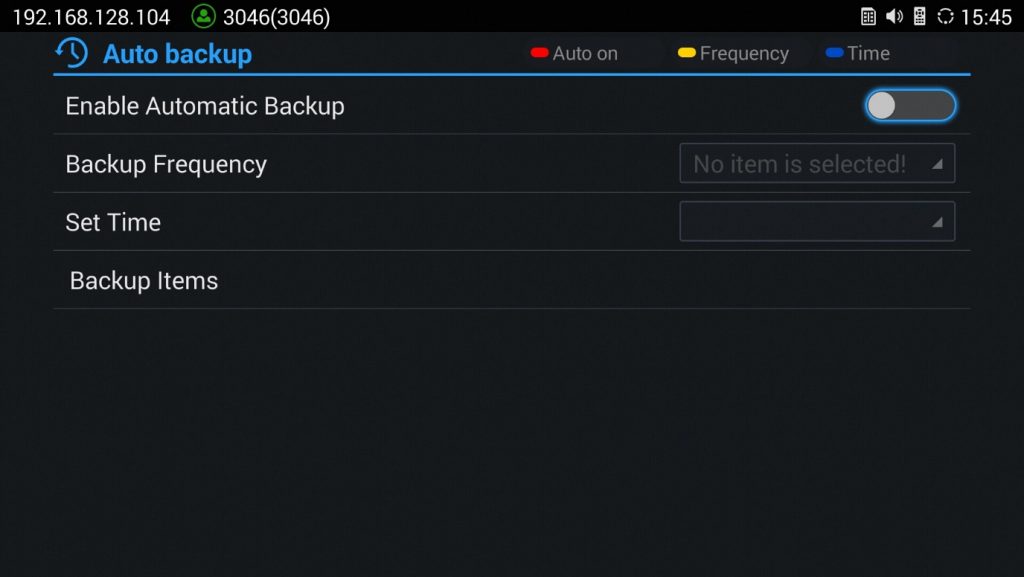
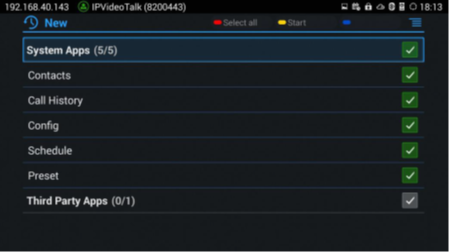
Restore Backup Data
Select one backup data and press “OK” key to access restore screen, select data and press the blue shortcut key to restore the backup data.
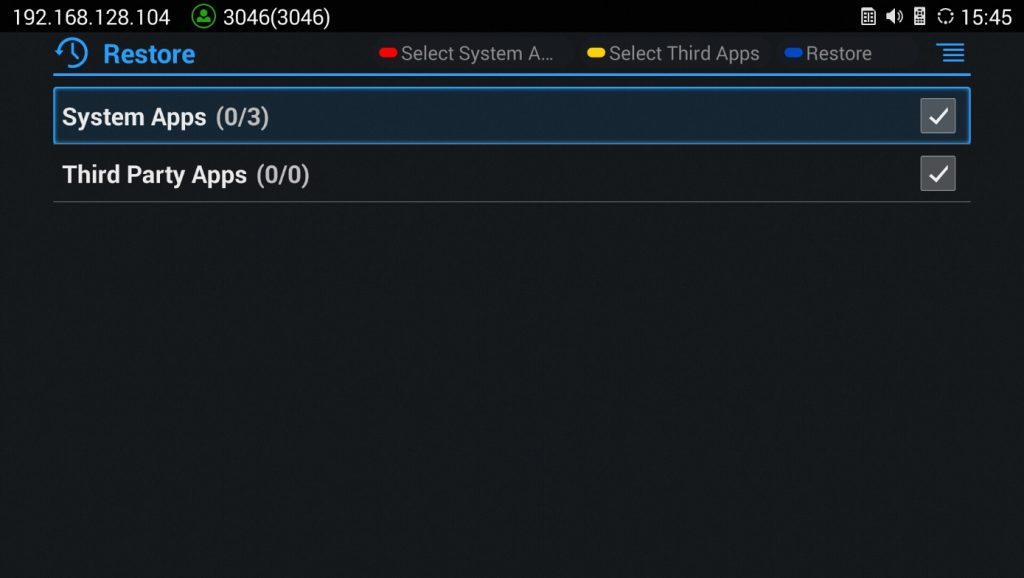
Set Backup Path
Press the MENU key and select “Settings” on backup screen to access settings screen, set backup path and go back to save automatically.
Diagnosis
When troubleshooting GVC3200/GVC3202, users could go to GVC3200/GVC3202 home screen🡪Applications🡪Diagnosis

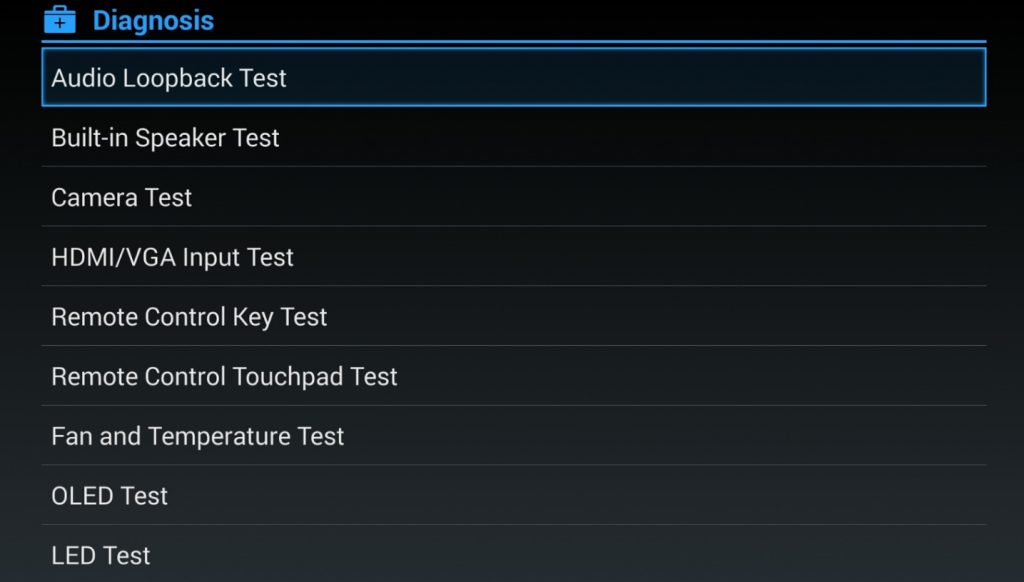
Browser
Users could browse web page, view news and watch video via the built-in GVC3200/GVC3202 Browser. On home screen, select Application🡪Browser

- Slide up or down with slide gesture to scroll the screen.
- Zoom in/out the page via zoom gesture.
- Press the MENU key to open the menu bar for more operations.
Sync Local Schedule with Google Calendar
The GVC3200/GVC3202 supports schedule that can be accessed in LCD menu🡪Schedule (see section [Schedule]). The settings in this schedule are saved locally on GVC3200/GVC3202. If the user downloads and installs Google Calendar on GVC3200/GVC3202, the local schedule can be synced up with Google Calendar.
Please follow the steps below to set up Google Calendar sync with GVC3200/GVC3202 schedule:
- Open Google Calendar on GVC3200/GVC3202.
- Once Google Calendar is successfully installed and opened on GVC3200/GVC3202, it should automatically sign in using the same Google account in step 2.
-
On GVC3200/GVC3202 LCD menu🡪Settings🡪System🡪Accounts🡪Google Account, select Google account
.
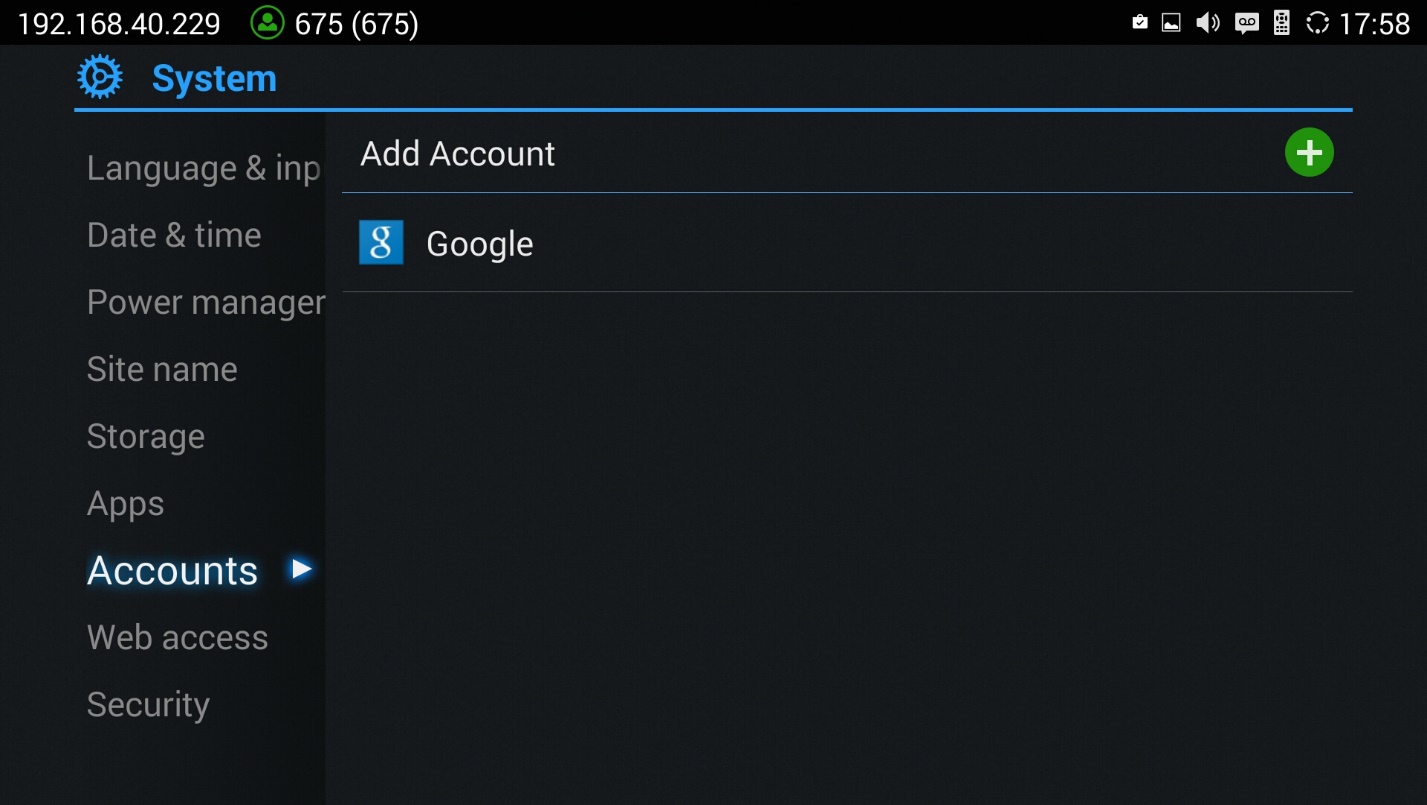
4. Select the Google account 
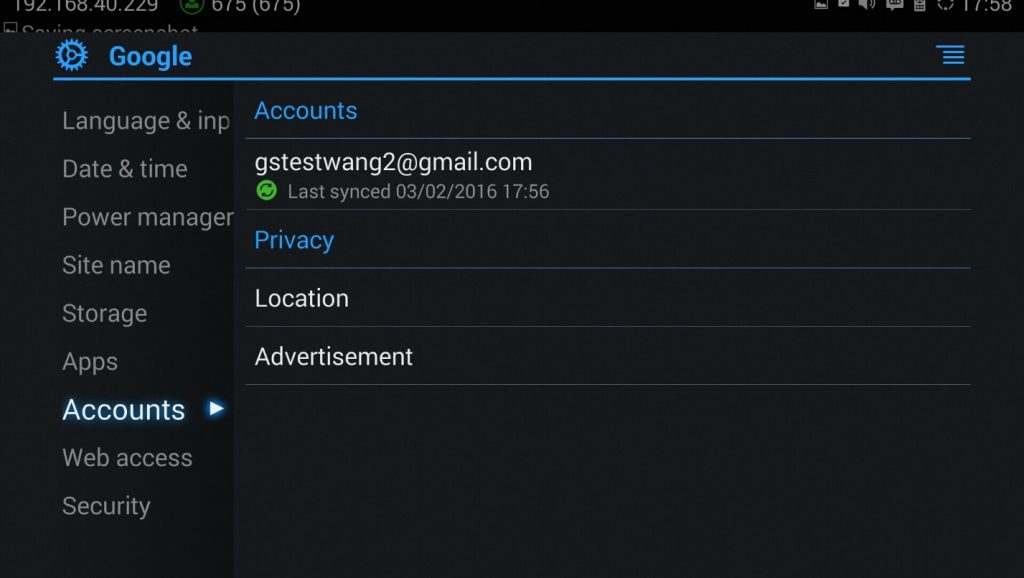
5. Click on the checkbox for “Calendar” to enable calendar sync for this Google account.
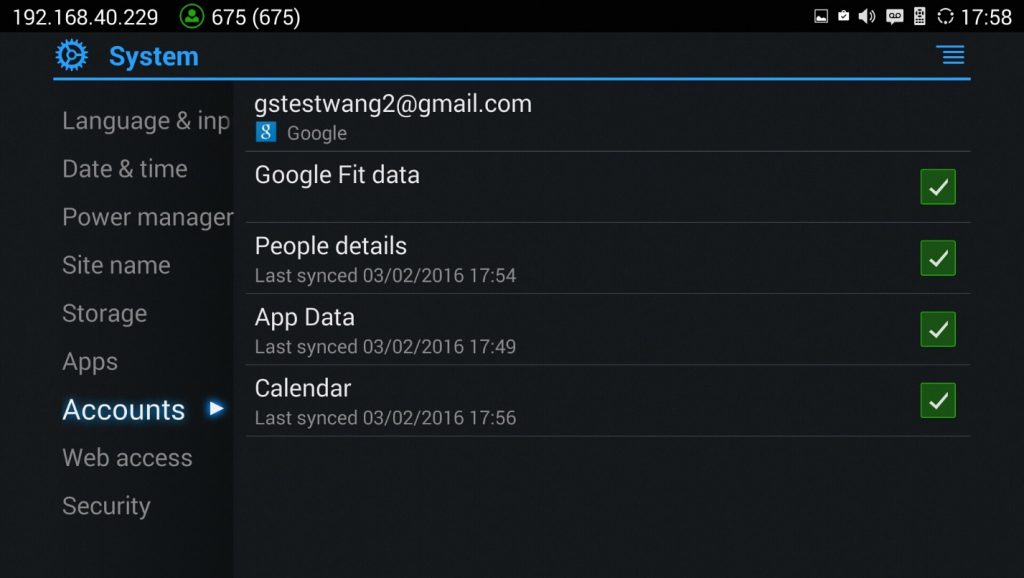
6. On GVC3200/GVC3202 LCD menu🡪Schedule, click on the upper right MENU icon🡪Settings.
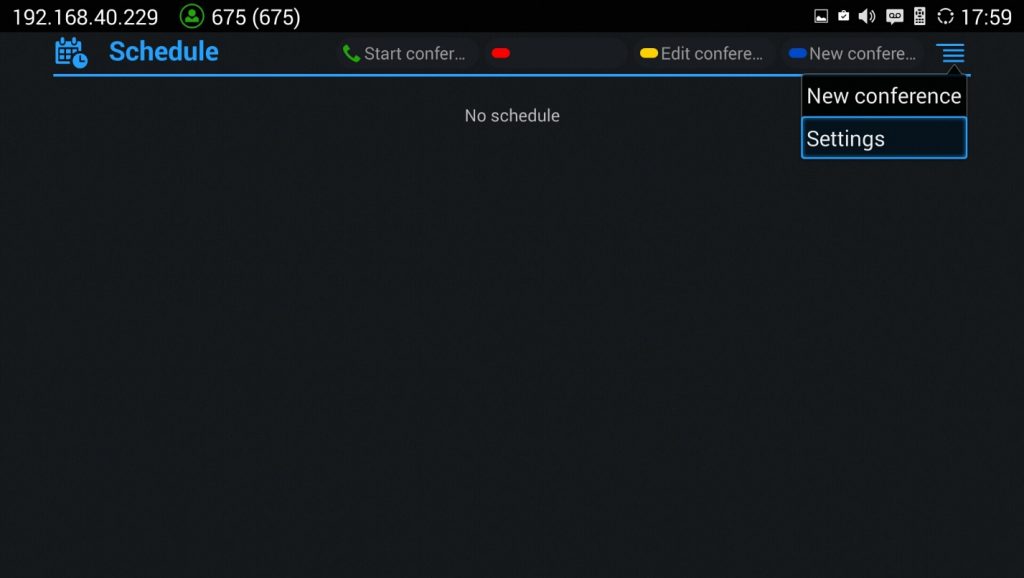
7. Enable Google Calendar by selecting the checkbox for the Google account. Set the sync interval, e.g., Every 5 mins.
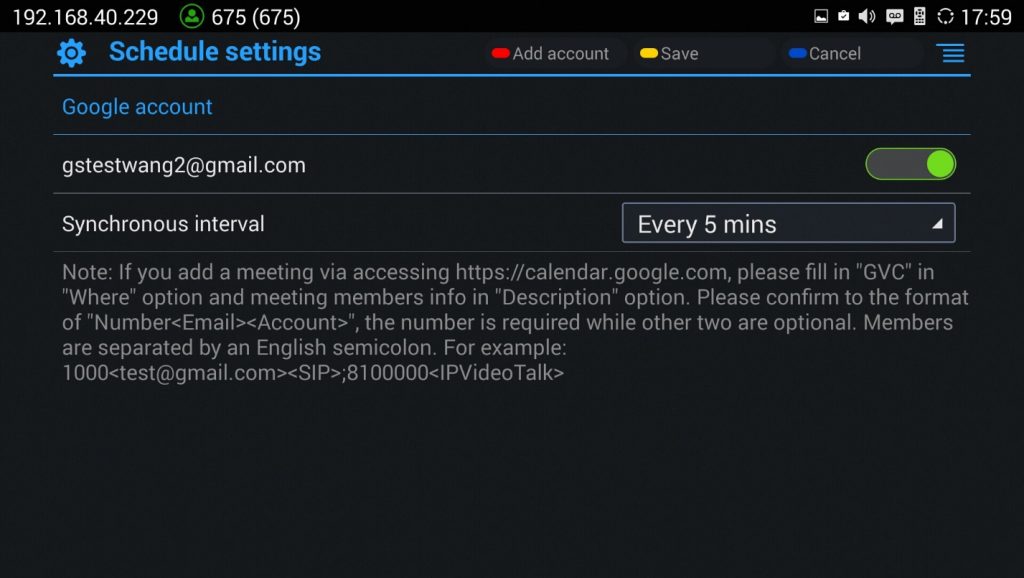
Now your GVC3200/GVC3202 has Google account successfully associated with schedule. The scheduled conference from GVC3200/GVC3202 or Google Calendar can sync with each other. Here is how to use it.
- To schedule meeting using Google Calendar and then sync up on GVC3200/GVC3202 schedule
- When creating a new event in Google Calendar, please enter “GVC” in “Where” option.
- Then enter meeting members in “Description” option. The meeting members should be in the format: Number<Email><Account>. “Number” is required while the other two fields are optional. Multiple meeting members need to be separated by semi-colon in English input method. For example, 1000<test@gmail.com><SIP>;8100000<IPVideoTalk>;1001
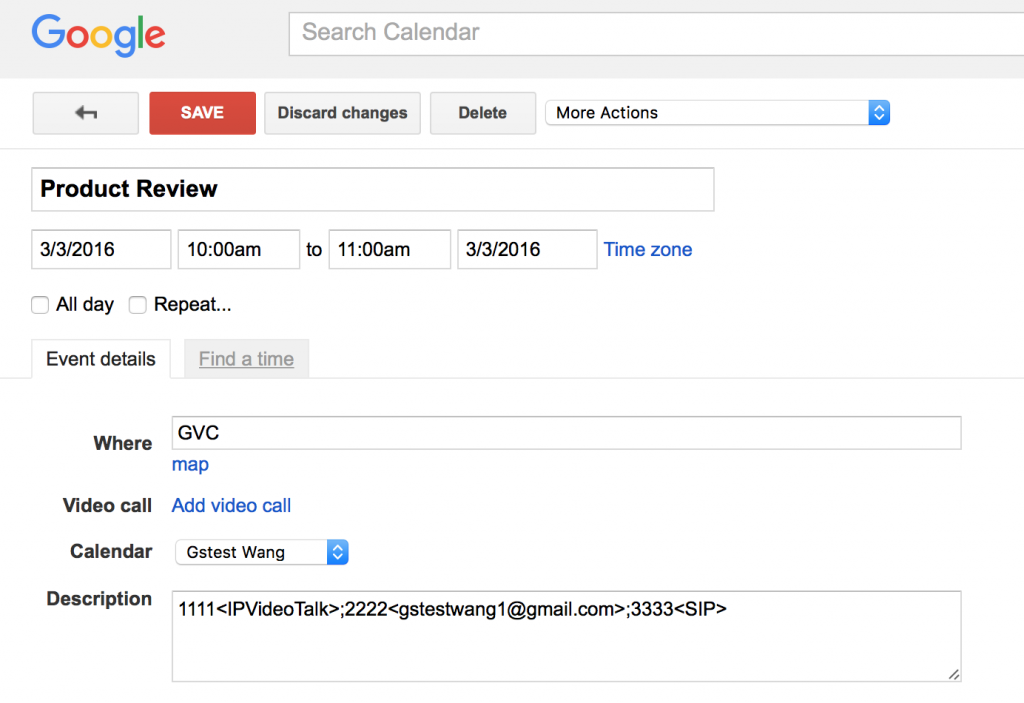
3. The new event will be displayed in GVC3200/GVC3202 schedule shortly.
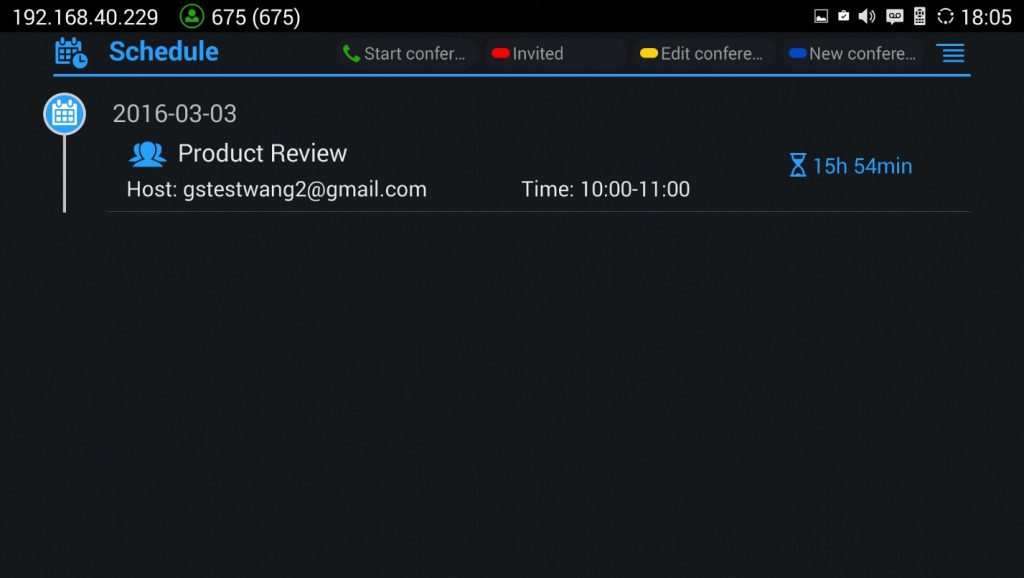
- To schedule meeting on GVC3200/GVC3202 and then sync up with Google Calendar
On GVC3200/GVC3202 LCD idle screen (or web UI🡪Contacts)🡪Schedule, select the Google account as the “Related Account” and fill up other details to schedule the conference using Google account. The created conference will be synced up in Google Calendar.
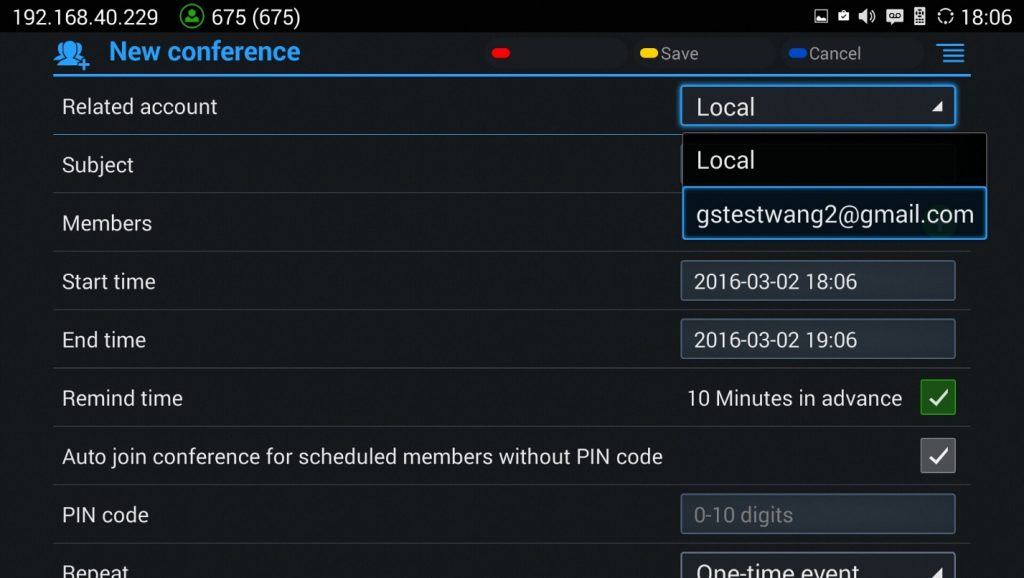
Custom App on Home Screen
Users could add one app to the home screen for easy access. GVC3200/GVC3202 only supports custom one app on home screen. The new app will overwrite the older one.
On the Home screen, click on “Custom Home App” and select one app. Press “OK” key to confirm. The system will go back to Home screen automatically and users could find the app has already been added.
To remove or change the Custom Home App, go to LCD Home screen🡪Applications. Click on and select the option to modify custom app. Users could de-select the existing custom app, or change to a different app.
Move App to SD Card
The apps that are not built-in on GVC320x can be moved to an external SD card plugged to the GVC320x from GVC320x LCD🡪Settings🡪System🡪Apps page.
- Users could check the apps list on the external SD card by pressing the Blue shortcut key on the GVC320x’s remote control.
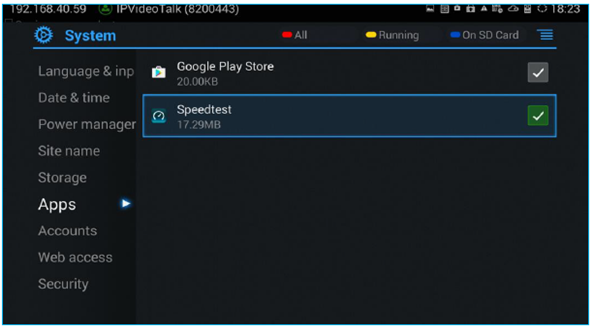
- Choose the target app that needs to be moved to SD card, it will show its detailed information, then Click on “Move to SD card” to make the change take effect. After configuration change, note that the moved app will not be listed anymore on GVC320x device after the external SD card is ejected.
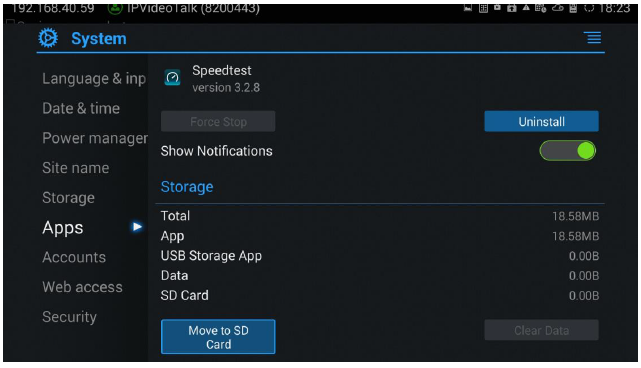
- To move the app back to the GVC320x internal storage, users could click “Move to device” on the detailed information page for the app on GVC320x LCD🡪Settings🡪System🡪Apps page.

Uninstall Application
The applications (except the system applications) on GVC3200/GVC3202 can be uninstalled. Go to LCD Home screen🡪Applications, click on and select “Uninstall Mode”. Users will see the apps that can be deleted shown with
icon. Select and confirm the uninstallation.
Once done, press on the remote control, or press to go back to normal mode.
GS MARKET
GVC3200/GVC3202 provides access to apps directly via built-in GS market. Users could download the apps from the market and install to GVC3200/GVC3202.
 Search Apps
Search Apps
On GVC3200/GVC3202 Home screen, click on Applications🡪GS Market Users could view the apps by category, or input key words and click on SEARCH icon to search the app.
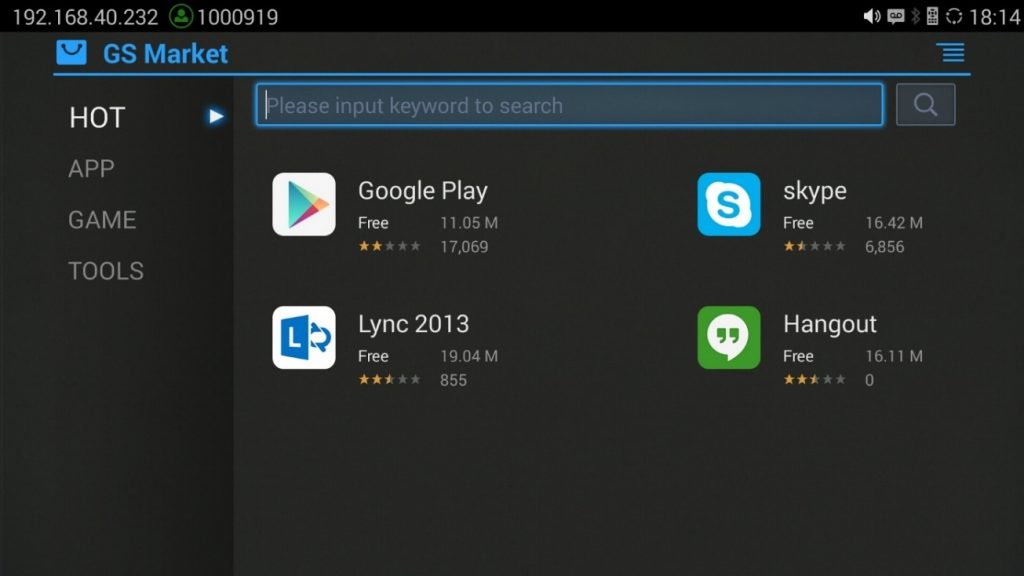
Download and Install Apps
- Users could see that if the app has been installed or downloaded by pressing the blue shortcut key.
- Press MENU key to view the downloaded apps and installed apps.
- Users could press the blue shortcut key on GVC3200/GVC3202 remote control to cancel download in process.
- The installing process will be started automatically after downloading the app.
- Go to Installed screen to view the installed apps, or press the blue shortcut key on the remote control to uninstall the downloaded apps.
Update Apps
GVC3200/GVC3202 will detect to update automatically if there is new version available for the installed apps when the network connection is normal. Users can view the relevant information, and update apps on the Installed screen.
IPVIDEOTALK
The GVC3200/GVC3202 has a built-in IPVideoTalk account that requires the user to activate it before using it. The IPVideoTalk application provides an interface for the user to manage this service on the GVC3200/GVC3202, e.g., view enterprise directory contacts, check and reply to notices from IPVideoTalk server as well as change IPVideoTalk settings. The user can access IPVideoTalk application from LCD🡪Applications🡪IPVideoTalk 
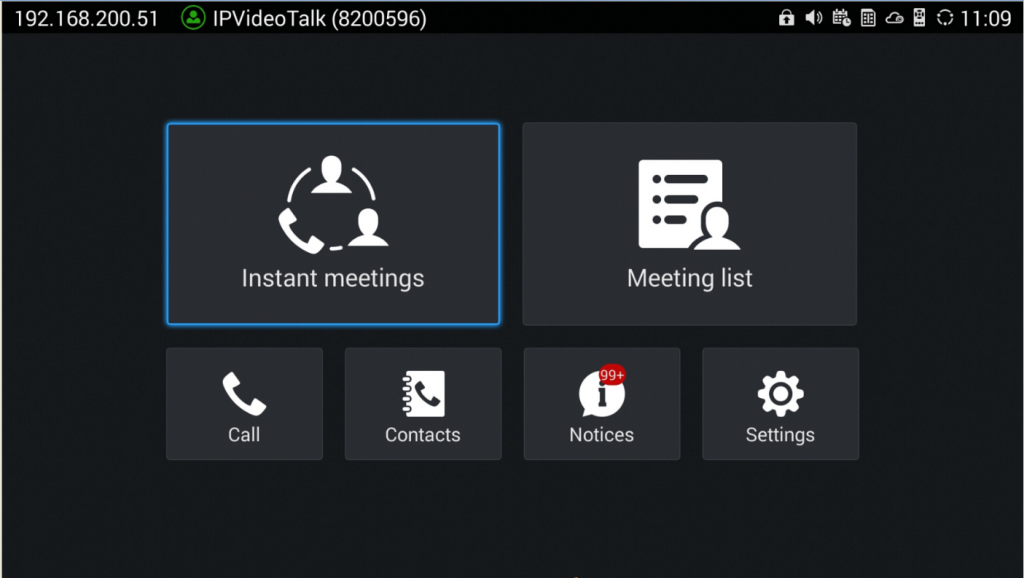
Instant Meetings
Users can start an instant meeting just by selecting “Instant meeting”. Once it is done, the user will be the host of this instant conference and will be able to add more participants and manage everything about the conference.
Meeting List
Users can view all the scheduled meetings by selecting “Meeting list”, this will take the user to the meetings list page where all the scheduled conferences are listed.
Call
Users can select “Call” in order to directly go to the dial page.
Contacts
The contacts are managed centrally in the server side. Users can access by selecting “Contacts”.
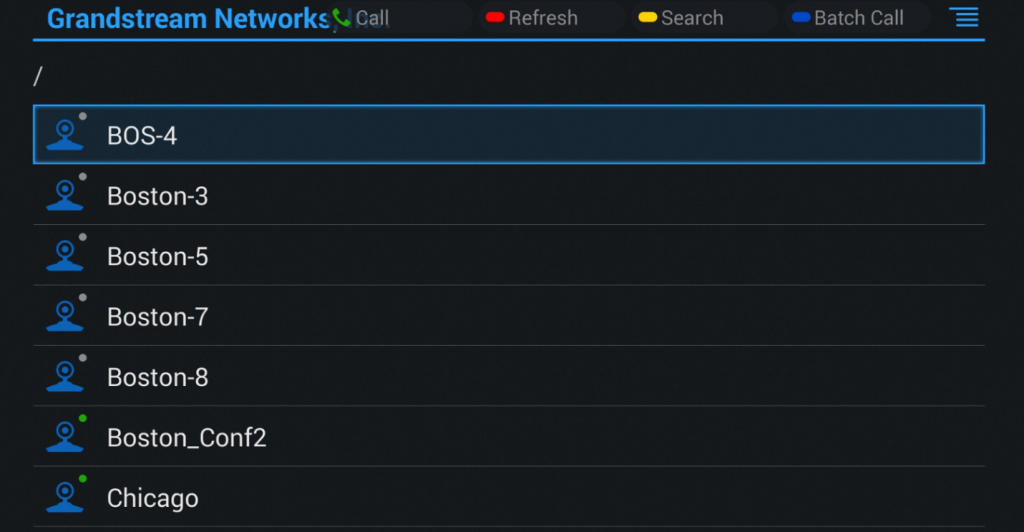
-
In Contacts, the users can view account status: online –
, offline – .
- Users can also view Contacts types:
a. Group.
b. Regular contacts with name, phone number, Email address etc.
c. Public GVC3200/GVC3202 Device with an IPVideoTalk ID.
-
Select an entry in the directory and press the Green Call button
on the GVC3200/GVC3202 remote control to call this contact.
- Press the red shortcut key on the GVC3200/GVC3202 remote control to refresh the directory.
- Press the yellow shortcut key on the GVC3200/GVC3202 remote control to search contacts in the directory.
- Press the blue shortcut key on the GVC3200/GVC3202 remote control to select entries and make a batch call to multiple contacts in the directory.
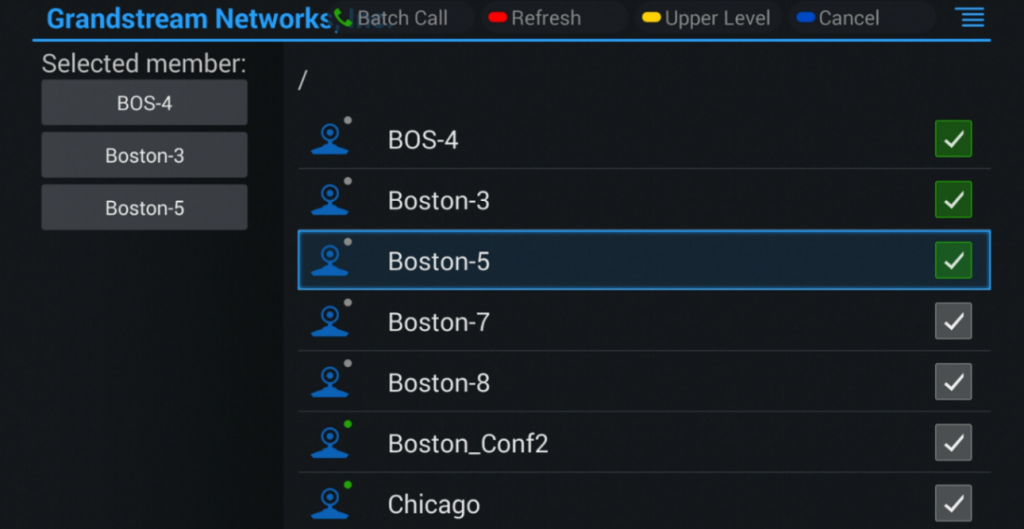
Notices
In the IPVideoTalk application, any incoming messages from the server side will be displayed in “Notices”. In the following figure, “2” indicates the number of new message and “3” indicates the number of total messages.
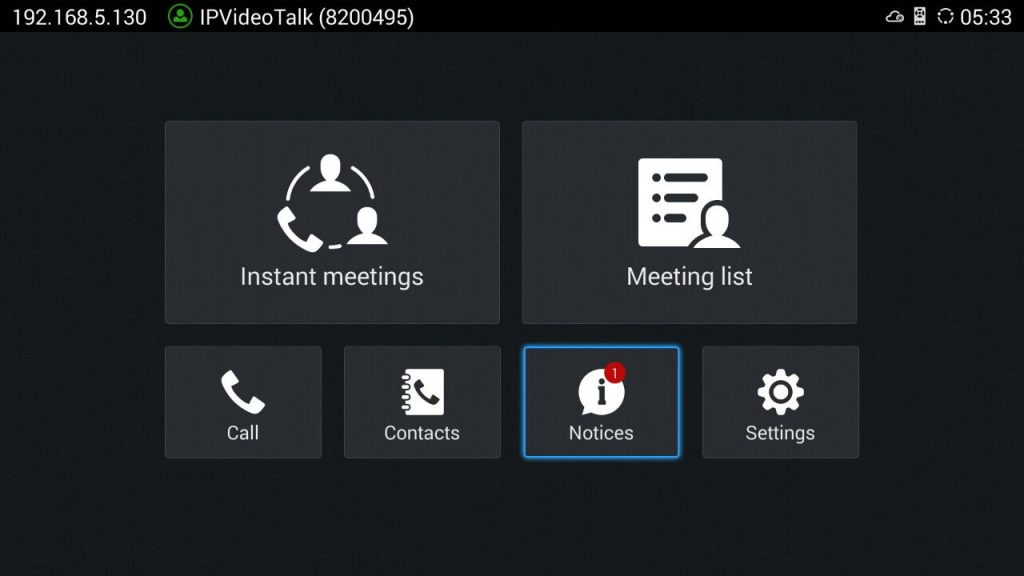
Click on “Notices” to access the messages. Use the navigations keys/OK keys on the GVC3200/GVC3202 remote control to select and read the messages. For the messages that requires user’s reply, a prompt will pop up for the users to make a selection.
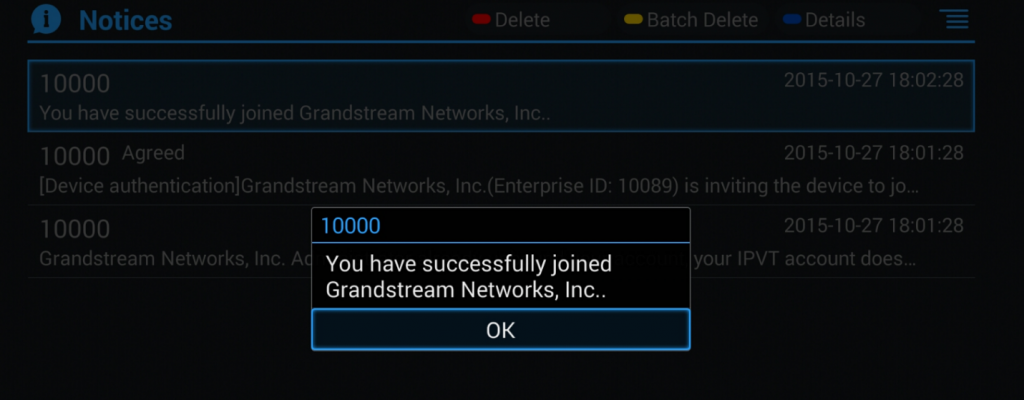
When IPVideoTalk plan is about to expire or already expired, a message will appear on the bottom of GVC3200/GVC3202 LCD home screen. Press yellow short key to view message details.

Also, detailed information is on GVC3200/GVC3202 LCD menu🡪Applications🡪IPVideoTalk application🡪Notices.
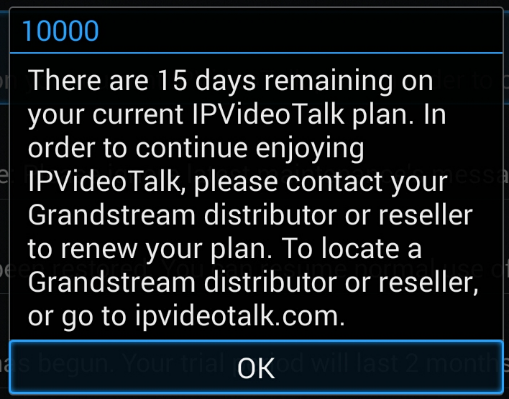
If there are new incoming messages for the IPVideoTalk account, users will see indicator icon
on the top status bar. Also on the upper right corner of the IPVideoTalk application icon in Application menu, users will see the number of new messages displayed.
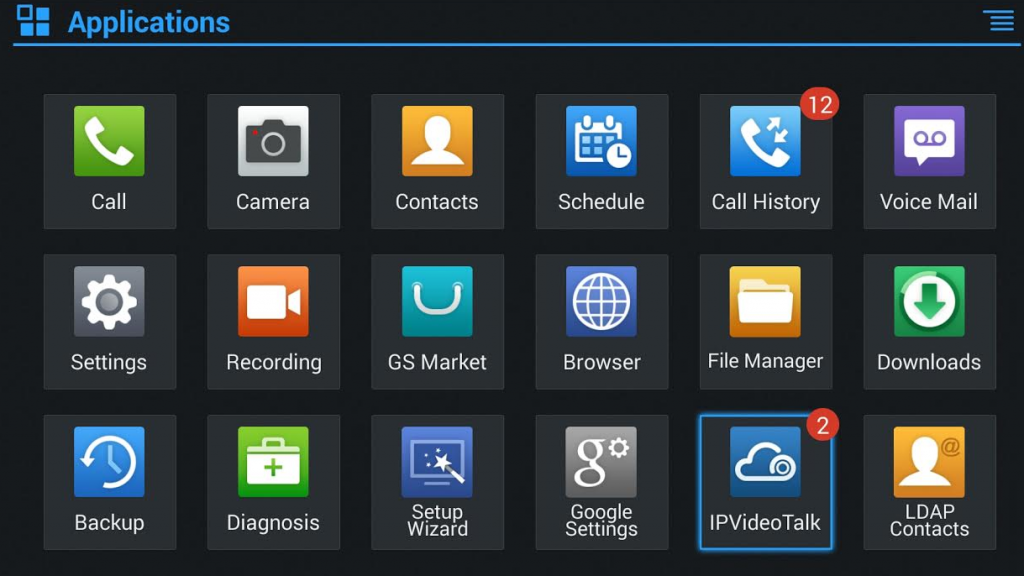
Settings
In the IPVideoTalk application, click on “Settings” to configure “Account Active” and “Display Name” for the IPVideoTalk account on GVC3200/GVC3202. The user can also enter the IP address of his IPVideoTalk Server, or restore it to the default, then click on “Save” to link the GVC3200/GVC3202 unit with the IPVideoTalk Server configured. Current IPVideoTalk version information will be shown under “Application Information”.
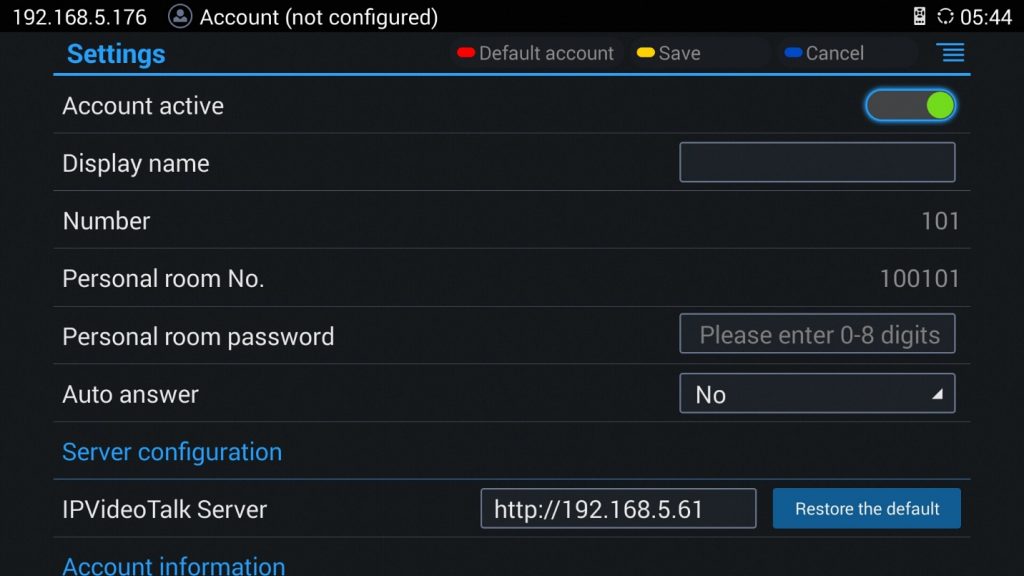
Users can check as well the current IPVideoTalk Plan used on the GVC320x and its expiration date. Please, refer to the following figure:
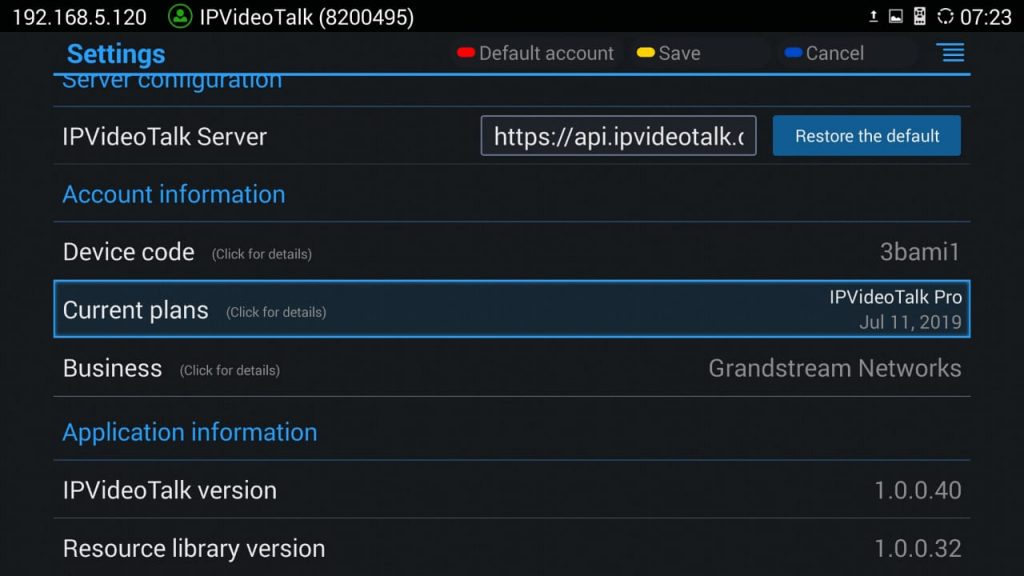
Join an IPVideoTalk Meeting
Users can join an IPVideoTalk meeting by dialing the host GVC3200/GVC3202’s IPVideoTalk ID or meeting ID. Please note only after meeting starts, GVC3200/GVC3202 can use this method to join the conference as a participant.
- Dialing host GVC3200/GVC3202’s IPVideoTalk ID to join an active meeting

- Dialing meeting ID to join an active meeting.

Busy Tone Responses
Please note GVC320x can only join one IPVideoTalk meeting at one time.
Note that a specific busy response messages rather than SIP 486 busy error prompt on IPVideoTalk dialing interface when trying “The number you dialed is hosting another meeting”. Host GVC cannot be added as a participant of another IPVideoTalk meeting.

“The number you dialed is joining another meeting”. Participant GVC of an active IPVideoTalk meeting cannot be added to another meeting.

Manually Start IPVideoTalk Tip
If a meeting is scheduled from IPVideoTalk Web Portal, then the meeting will sync to host GVC3200/GVC3202 device LCD🡪Schedule interface. There will be a prompt message “Manually start the meeting will need to re-schedule, please confirm” when pressing CALL button on remoter to start the meeting manually before or after scheduled time.
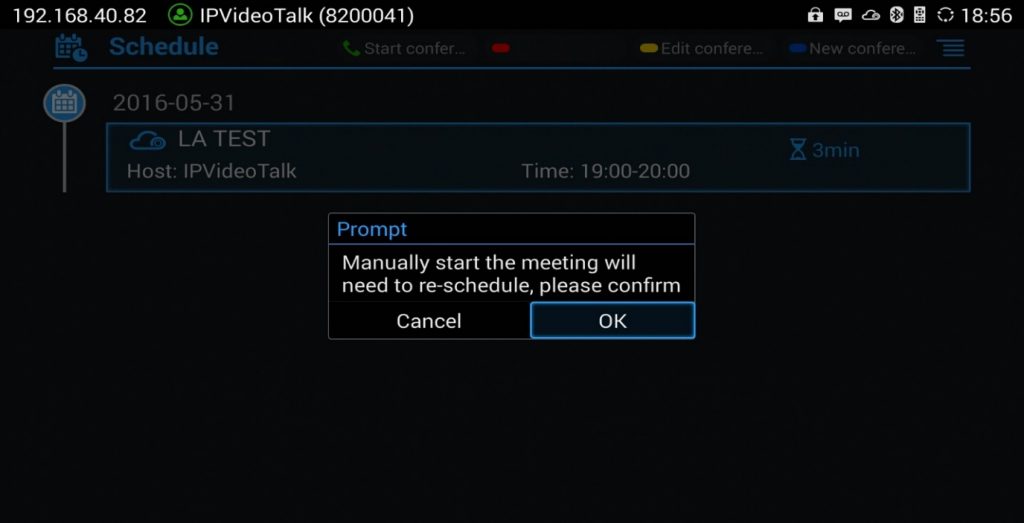
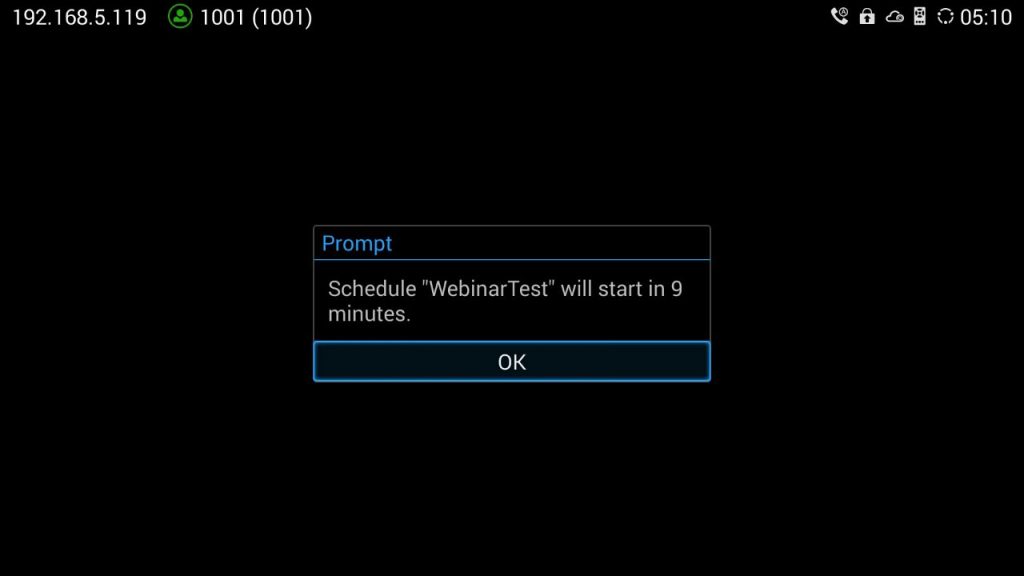
For more information about your IPVideoTalk services, settings, how to manage accounts and schedule meetings, please check IPVideoTalk user manual from http://www.ipvideotalk.com
Conference Control
Hand Down/Up in IPVideoTalk Meeting
If GVC320x joins an IPVideoTalk meeting as a participant and the host is any WebRTC client, the participant could click on button on GVC320x LCD🡪Call screen to raise hand to attract attention from host that he/she wants to be unmuted or needs any help.

The raised hand status of GVC320x participants could be checked from Participants List on Host WebRTC Client, as shown in below figure
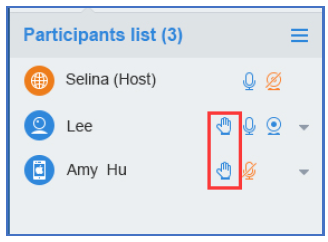
The raised hand could be put down by participant itself or WebRTC host.
-
Participant GVC320x could hand down itself by clicking on button
again.

- WebRTC Host could put down GVC’s hand.

The host GVC320x can put down some participant’s raised hands or all the participants raised hands:
- Lower hand of a participant: During the meeting, the host can go to “Conf Control”, select the participant, and tap on “Click to lower hand”. See the following figure:
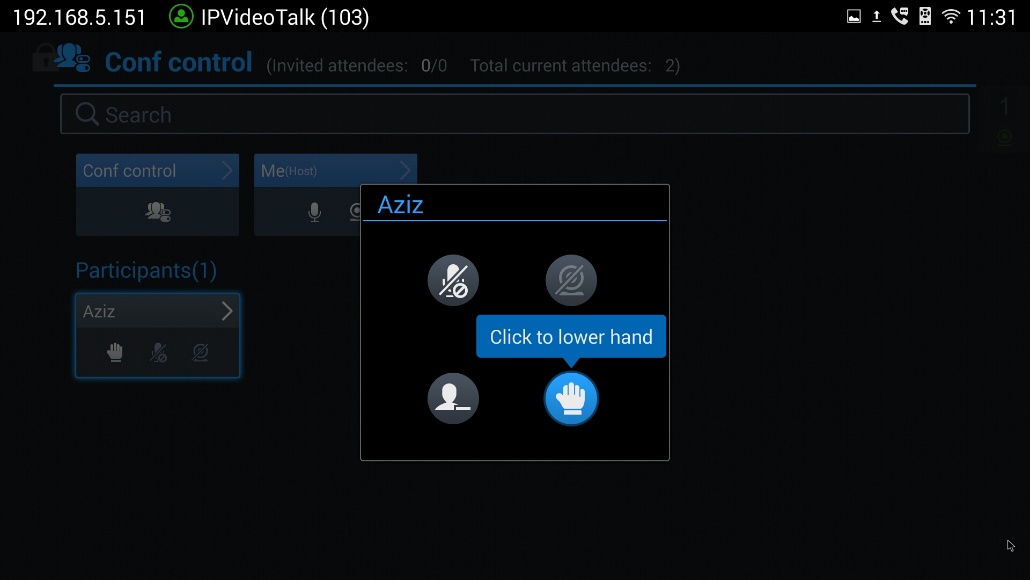
- Lower hand of all participants: During the meeting, the host can go to “Conf Control”, select “conf control” features and click on “Lower all hands”. See the following figure:
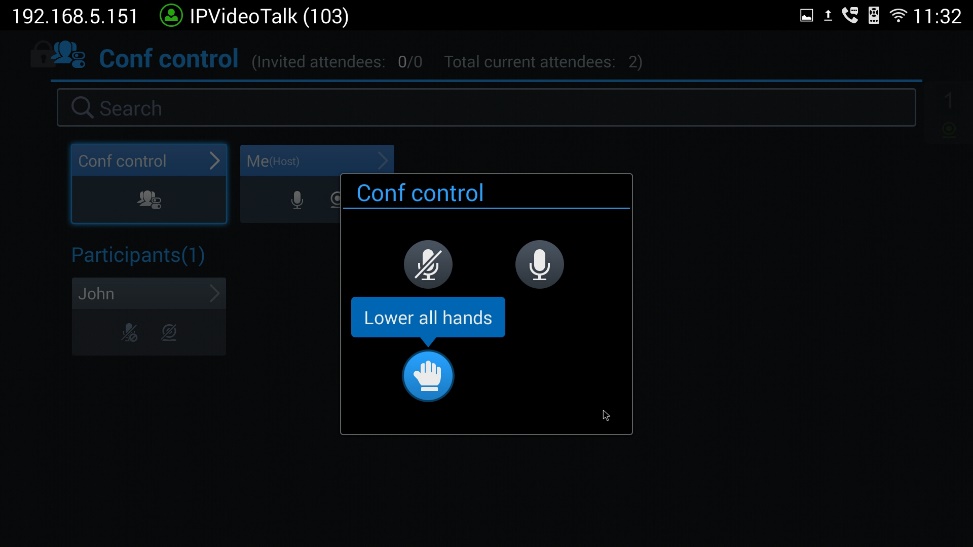
Share Local Camera
During IPVT meetings, WebRTC host can request the GVC attendees to share their camera, once the request is being sent, a GVC user can either reject or accept the request for the camera to be shared.
-
WebRTC host can request camera sharing by clicking on
icon, next to a GVC attendee.
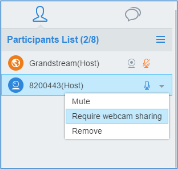
A request permission will pop up on GVC’s screen, and the user can “Accept” or “Reject” the request. If accepted, the GVC video will be shared in the meeting.

WebRTC host can also stop the camera feed of a GVC attendee to prevent it from uploading its local video streaming to IPVideoTalk Server.
Figure 105: Stop Camera Sharing
The Host GVC320x can stop the camera feed of a participant sharing his camera by accessing “Conf Control” features and select “click to un-share camera”. Please, refer to the following figure:
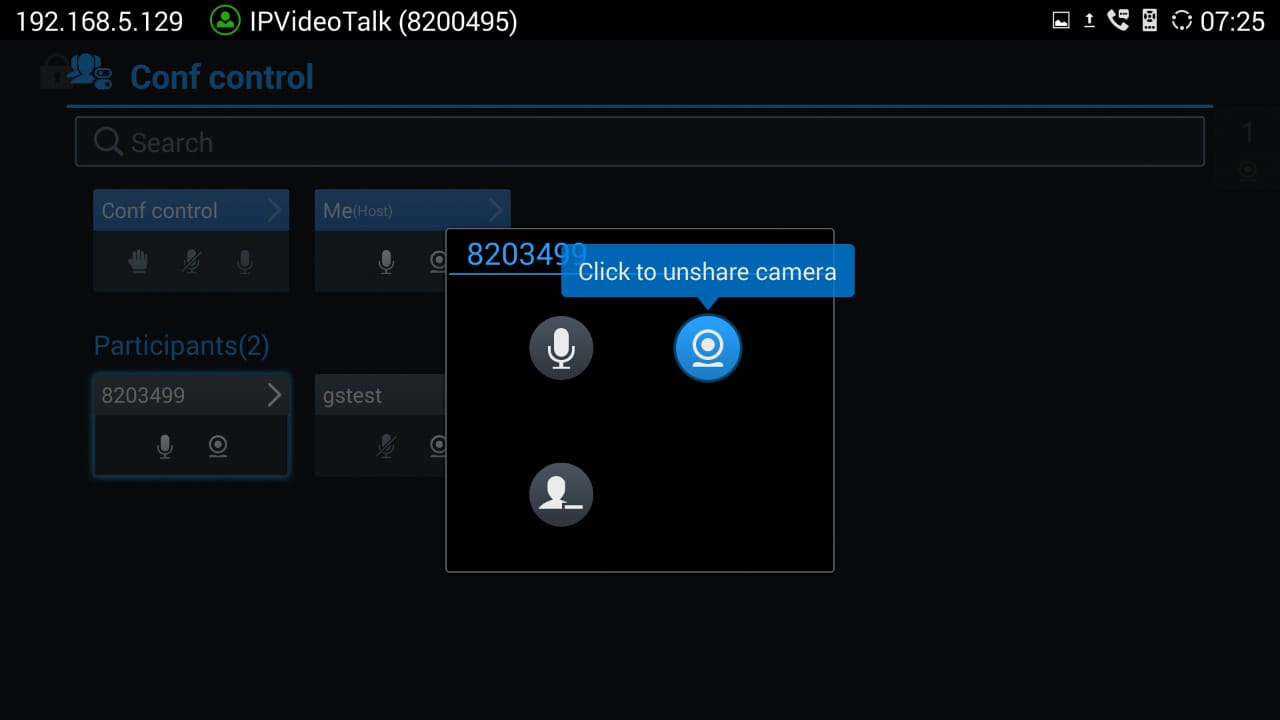
Mute Participants
Users could go to Conf Control menu during an IPVideoTalk meeting to control the Microphone/MIC for each participant, or a batch of meeting participants.
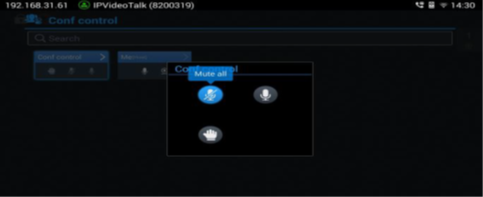
Stop Video Upload
Under GVC320x LCD🡪Call Screen🡪Conf Control🡪Me (Host), users could prevent the GVC320x from uploading local video streaming to IPVideoTalk server during an IPVideoTalk meeting by clicking on icons:


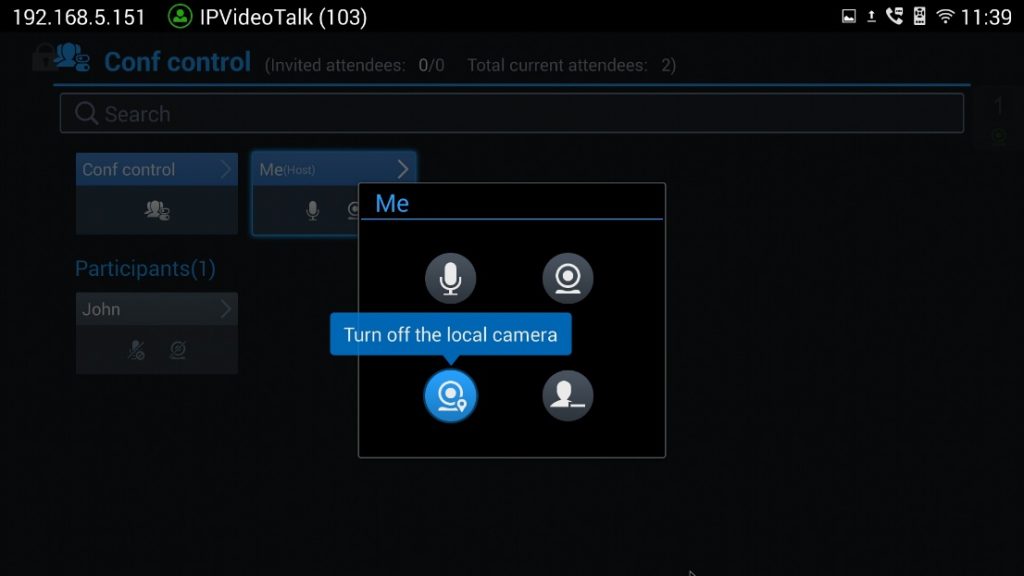
Start Cloud Recording
During an IPVideoTalk meeting/webinar, a new option is added under Call Screen of host GVC to allow
users to control cloud recording.
To start/stop cloud recording, users could click on “Record” button under host GVC320x LCD 🡪 Call
screen, or press
shortcut key on remote control:

There will be an icon
shown on the left upper corner of host GVC as well as all other participants
to indicate the cloud recording is in progress, the screen and record button will also show as follow:

Users can at any time stop the recording by clicking the record button and press:
Users could log in to IPVideoTalk Enterprise web portal 🡪 Recordings page to View/Download/Delete
the recordings for the cloud meetings/webinars:

GVC3200/GVC3202 WEB UI FEATURES
GVC3200/GVC3202 embedded Web server responds to HTTP/HTTPS GET/POST requests. Embedded HTML pages allow users to configure the application device through a Web browser such as Mozilla Firefox, Google Chrome and etc.
Accessing GVC3200/GVC3202 Web GUI
The IP address of GVC3200/GVC3202 displays on OLED display screen on the front panel.
To access GVC3200/GVC3202 Web GUI:
- Connect the computer to the same network as GVC3200/GVC3202.
- Make sure GVC3200/GVC3202 is turned on and shows its IP address on OLED display screen.
- Open a Web browser on your computer.
- Enter GVC3200/GVC3202’s IP address in the address bar of the browser, e.g.: http://192.168.124.111.
- Enter the administrator’s login and password to access the Web Configuration Menu. The default username and password are: admin, admin; You can select English or other language in the drop-down menu of language.
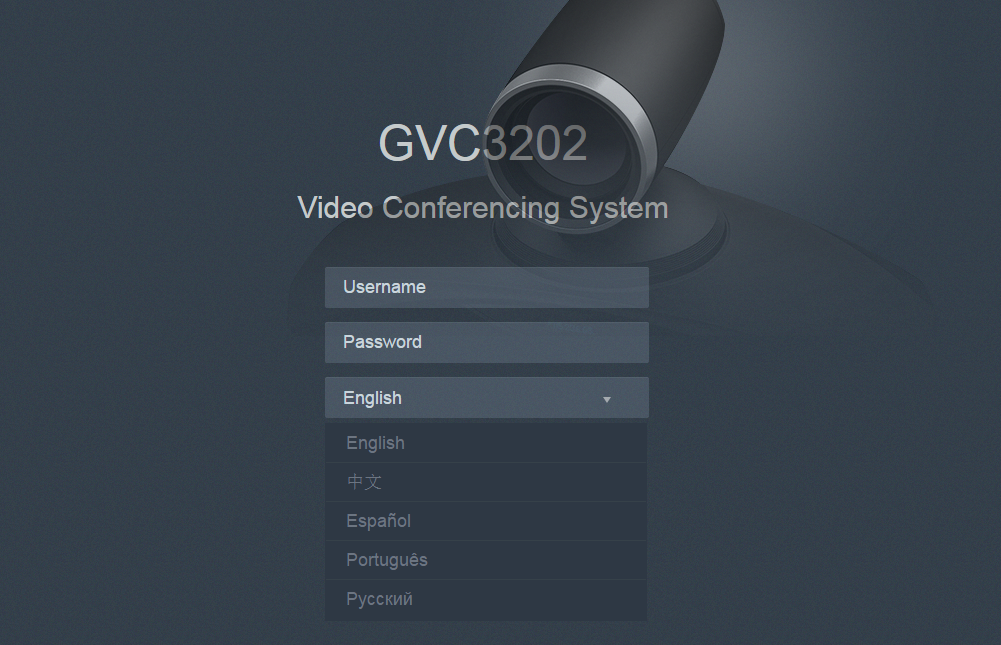
6. Click “Login” 
Saving Changes
When changing any setting on GVC3200/GVC3202 web UI, users need to submit them by pressing the SAVE button on the bottom of the page, and then, click the Apply button on the top of the page to apply the configuration changes. For those options with
next to it on the Web page, users have to reboot GVC3200/GVC3202 to take effect.
Definitions
This section describes the 6 options on GVC3200/GVC3202 Web GUI. Please view Settings, Maintenance and Status specifications in Administration Guide.
- Call
Users could start video conference and control conference from Web GUI.
- Contacts
Contacts, Schedule, Call History
- Device Control
Video Control, Audio Control
- Settings
SIP Account, IPVideoTalk account, Blue Jeans account, Network Settings, Peripheral, Call Features, General Settings, and Security Settings
- Maintenance
Upgrade, Recording, Time & Language, Troubleshooting, Reboot
- Status
Account Status, Peripheral Status, Network Status, System Info and Remote Control
Users can log in as an administrator or a normal user. The following table shows the web pages accessible by normal user and administrator. It is recommended to change the default password for user and administrator after login for the first time.
Table 24: GVC3200/GVC3202 Web Access
User Type | Username | Default Password | Accessible Web Pages |
Normal User | user | 123 |
|
Administrator | admin | admin | All pages |
Toolbar
The web UI tool bar is on the upper right corner of the web UI page.

- DND
It is used to turn on/off DND mode. Once it is enabled, the DND text will turn into red and all incoming calls will be rejected.
- Remote Control
Click to bring up virtual remote control panel.
- English
Select the display language for the web UI.
- Logout
Log out from the web UI.
Call Page
GVC3200/GVC3202 Web UI call page is shown below. Users could make calls and initiate conference from Web UI.
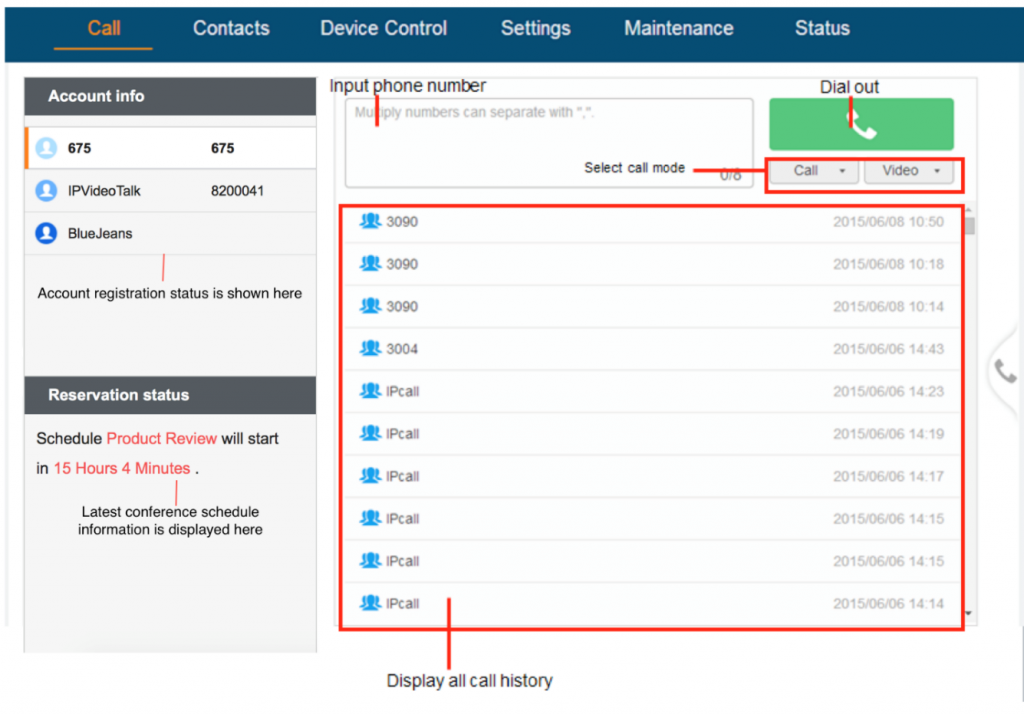
Making a Call
Enter phone number in input box, and select call mode, tap on button
to dial out; or, select one call history entry in the list below and click on
to dial out.
Conference Control
When making a new call, initiating a conference or receiving an incoming call, the conference screen will pop up as shown below.
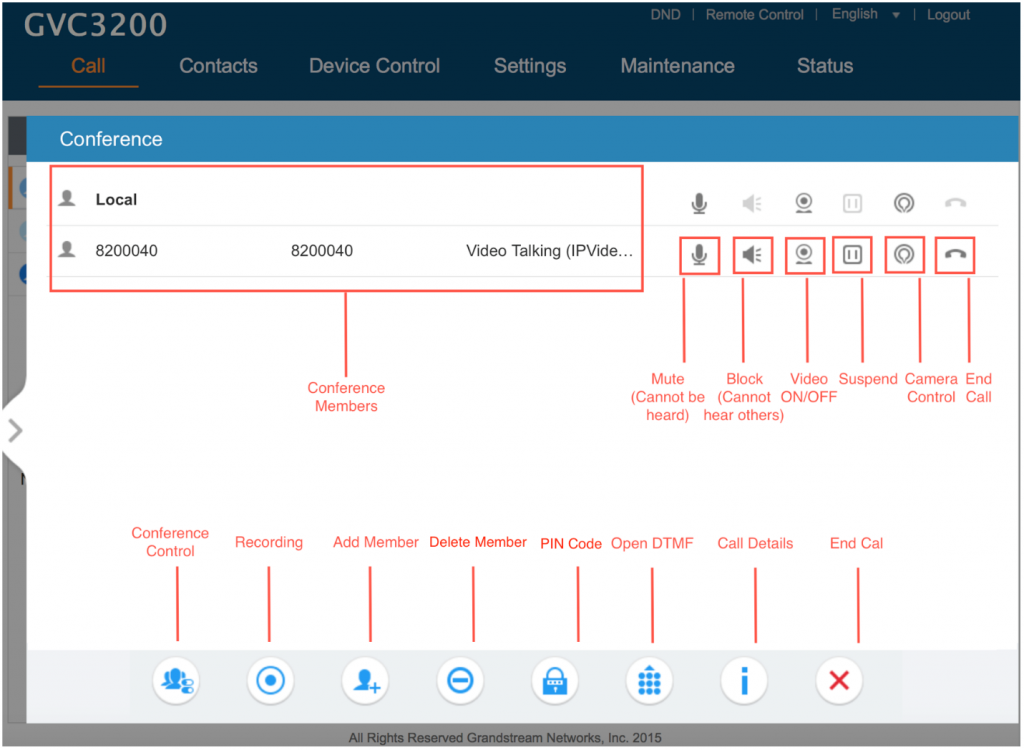
Click on the icon for “Conference Control”, users will see a list of control icons on the bottom which are also available in LCD call screen.
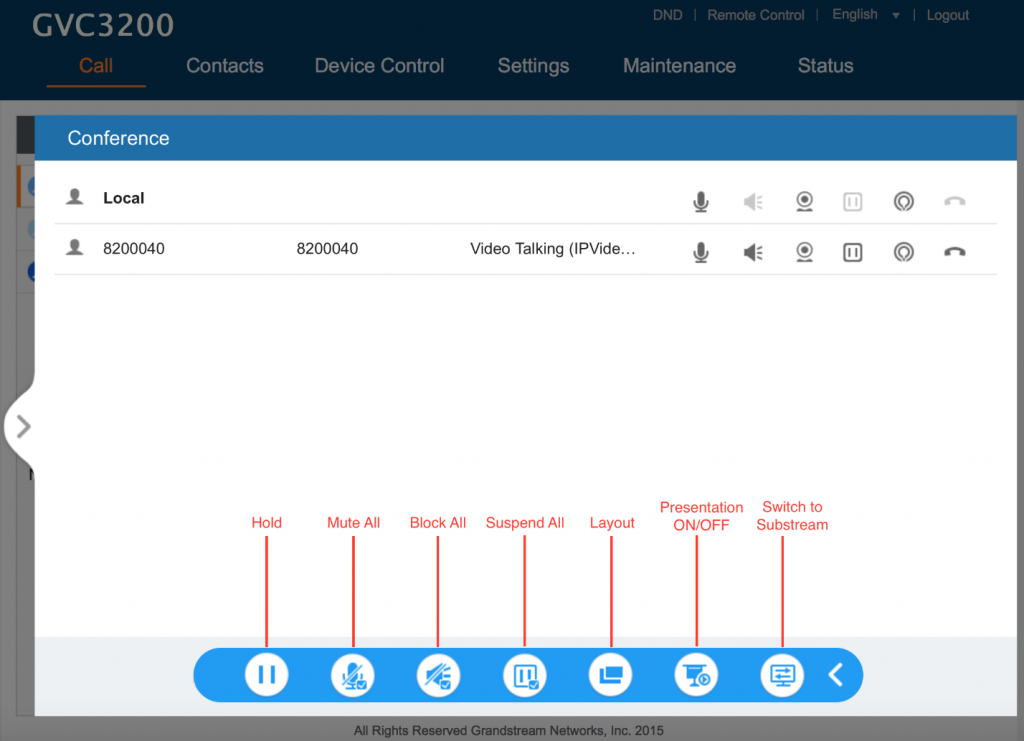
Contacts Page
This page lists Contacts, Schedule and Call History.
Contacts
Users could search/add/delete/edit contacts on web page. The operations will be synchronized and can be viewed from LCD as well. The web UI contacts page is as shown below.
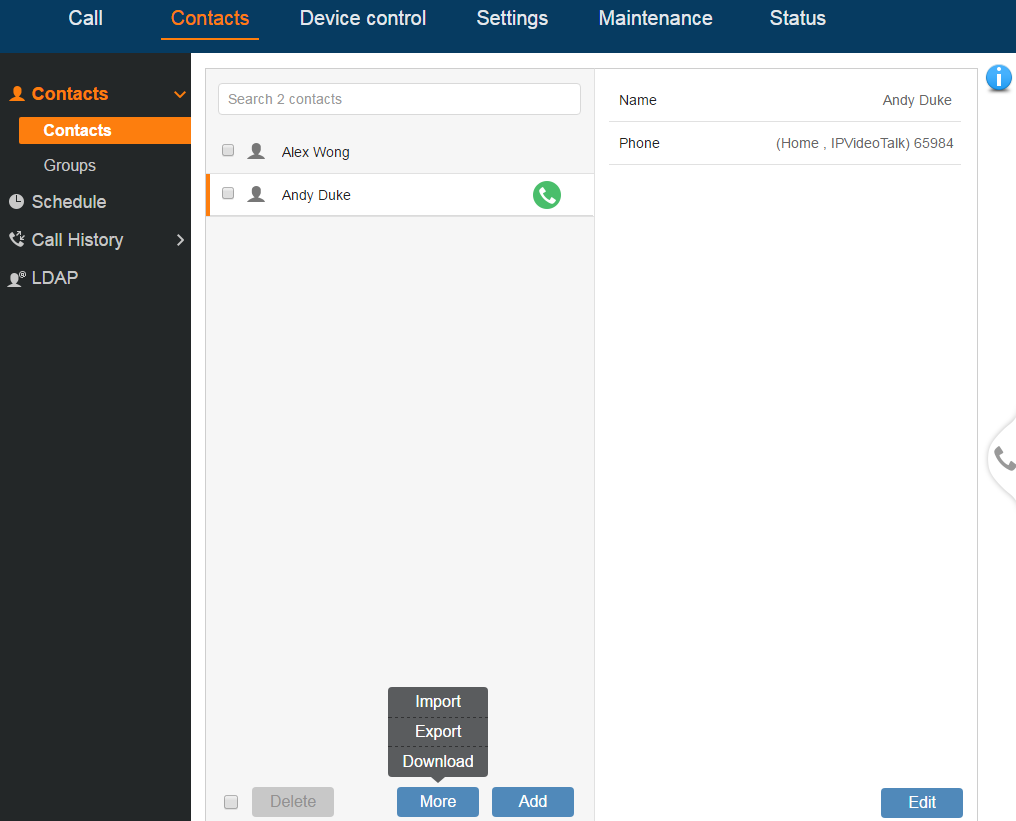
-
Click on
next to the contact to dial the contact.
- Click on “More” to open more options such as export, import and download contact.
- Select “Import” option and users will find import screen on the right. Refer to chapter Batch Import Contacts for more details.
- Select “Export” option and users will find export screen on the right. Refer to chapter Export Contacts for more details.
- Select “Download” option and users will find download screen on the right. Refer to chapter Download Contact for more details.
-
Click on
and users will find Add Contact screen on the right. Fill in contact information and save.
-
Click on
and users will find Edit Contact screen on the right. Edit contact information and save.
- Click on the checkbox for “Delete” and users can select the contacts to delete from GVC3200/GVC3202.
Groups
GVC3200 supports up to 9-way video conference and GVC3202 supports up to 3-way video conference, including the GVC3200/GVC3202 itself. For GVC3200, if there are more than 8 conference members, only the first 8 members in the group will be dialed; For GVC3202, if there are more than 2 conference members, only the first 2 members in the group will be dialed.
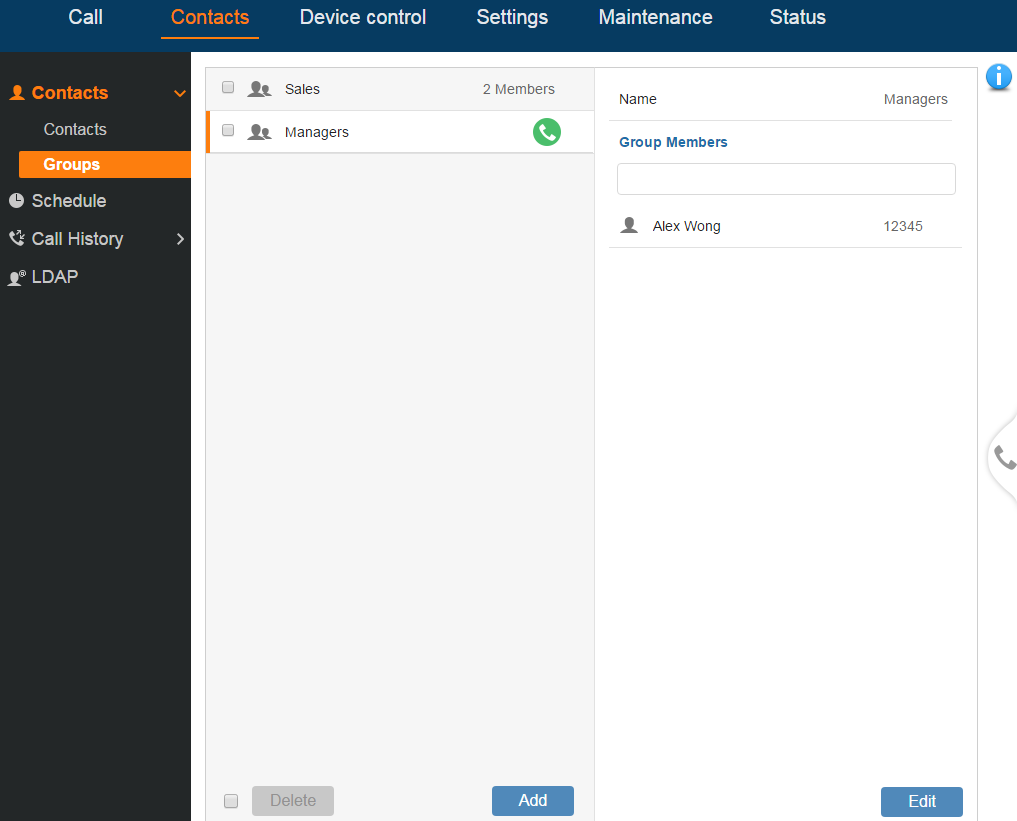
-
Click on
next to the group to call the contacts in the group.
-
Click on
and users will find Add Group screen on the right. Select group members from existing contacts and save.
-
Click on
and users will find Edit Group screen on the right. Edit Group information and save.
- Click on the checkbox for “Delete” and users can select the groups to delete from GVC3200/GVC3202.
Schedule
Conference can be scheduled, edited and deleted from web UI. See figure below. Please refer to chapter Schedule for more details for each option.
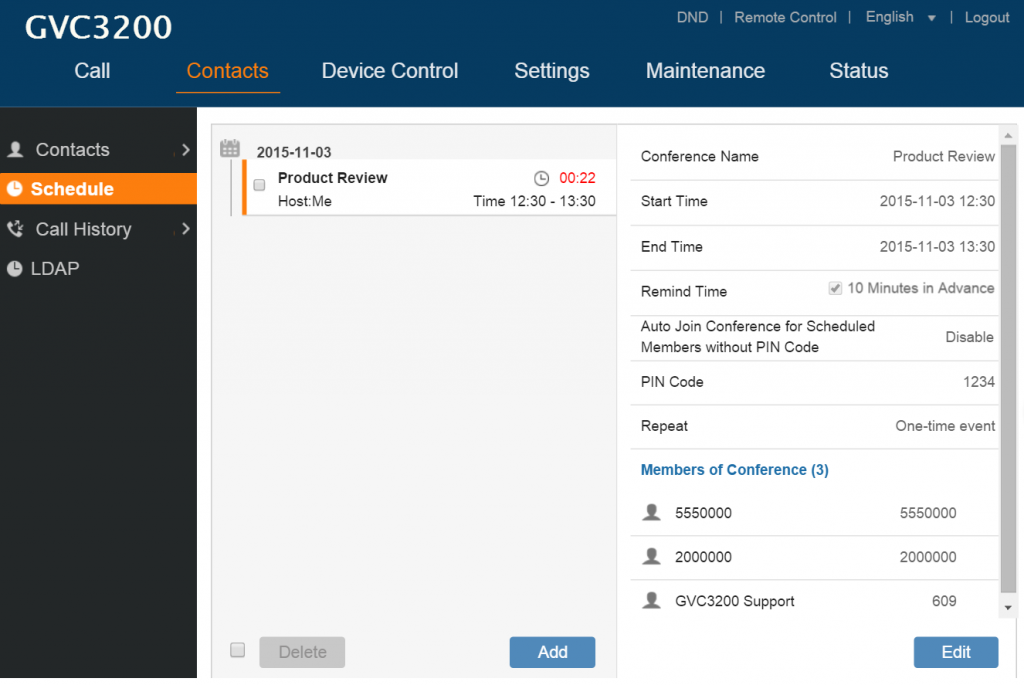
-
Click on
and users will find Add Schedule screen on the right. Click on “Save” after configuring the schedule.
-
Click on
and users will find Edit Schedule screen on the right. Click on “Save” after editing the schedule.
- Click on the checkbox for “Delete” and users can select the schedules to delete from GVC3200/GVC3202.
-
Move the cursor to the scheduled conference where the scheduled time is displayed, icon
will appear for the user to dial out immediately.
Call History
From web UI, users could also access Call history, which is synchronized with the call history from LCD.
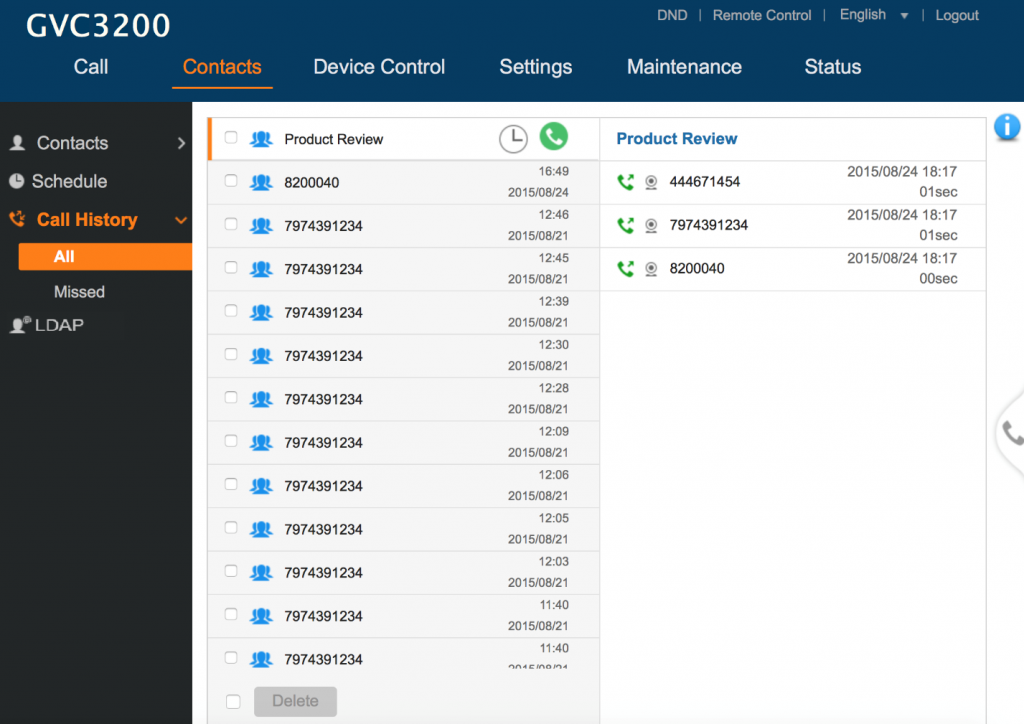
The call history details will be displayed on the right side when there is one entry selected. Users can also move the cursor to the call history time to add this call to schedule by clicking on
, or dial out immediately by clicking on

LDAP
This section is the same as LDAP settings under chapter LDAP contacts. Please refer to LDAP contacts for more details.
Device Control Page
Video Control
Users could add preset and manipulate PTZ control on this page.
- Move the cursor to one configured preset to preview preset.
- Click one preset to apply the preset.
- Click the un-configured preset, and adjust via the PTZ control panel on the right, then save the configurations.
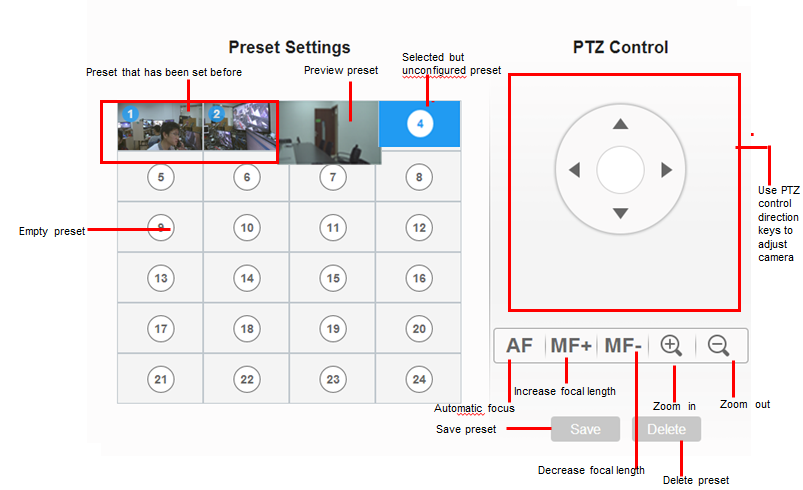
Audio Control
Table 25: GVC3200/GVC3202 Web UI – Audio Control Parameters
Parameters | Descriptions |
Ringtone Volume | Users can slide left or right to adjust ringtone volume. |
Media Volume | Users can slide left or right to adjust media volume. |
Device Ringtone | Select device ringtone from the dropdown list. |
Notification Ringtone | Select device notification ringtone from the dropdown list. |
Audio Device | Select the audio device that the GVC3200/GVC3202 will use for audio input and output during call or playing media. The options are “Auto”, “Bluetooth”, “USB” and “HDMI”.
The default setting is “Auto”. |
USB External Sound Card gain(dB) | TX gain(dB): The volume that GVC320x sends to other remote parties will be adjusted. |
RX gain(dB): The volume that GVC320x receives from other remote parties will be adjusted. | |
Call Progress Tones: Ring Back Tone Busy Tone Reorder Tone Confirmation Tone Call-waiting Tone | Using these settings, users can configure ring or tone frequencies based on parameters from the local telecom provider. By default, they are set to the North American standard. Frequencies should be configured with known values to avoid uncomfortable high pitch sounds. Syntax: f1=val, f2=val [,c=on1/off1[-on2/off2[-on3/off3]]]; (Frequencies are in Hz and cadence on and off are in 10ms) |
Ring Back Tone: Users can configure ring back tone which is the tone the caller will hear before the callee answers the call. The default value: f1=440@-19,f2=480@-19,c=2000/4000; | |
Busy Tone: Users can configure busy tone which will be heard if the callee is busy or on DND. The default value: f1=480@-24,f2=620@-24,c=500/500; | |
Reorder Tone: Users can configure reorder tone which will be heard when the call fails to be established such as wrong account number is dialed, or the call is timed out. The default value: f1=480@-24,f2=620@-24,c=250/250; | |
Confirmation Tone: Users can configure confirmation tone which will be heard when the callee enables call recording function or when the SIP account fails to register. The default value: f1=350@-11,f2=440@-11,c=100/100-100/100-100/100. | |
Call Waiting Tone: Users can configure call waiting tone when there is another incoming call during the call. The default value: f1=440@-13,c=300/2000-300/2000-0/0. | |
Call-Waiting Tone Gain | This configures the call-waiting tone gain. By default, they are set to the North American standard. Users could select "Low", "Medium" or "High". The default setting is "Low". |
Ring Cadence | Configure the default ring cadence for the ring back tone. The default setting is c=2000/4000. |
RESCUE MODE
When users power cycle the GVC3200/3202 device during upgrading process, the device can be recovered by the “Rescue Mode”.
a). The Rescue Mode will be triggered on next rebooting when users power cycle the GVC3200/3202 device during upgrading process as the figure shows below:
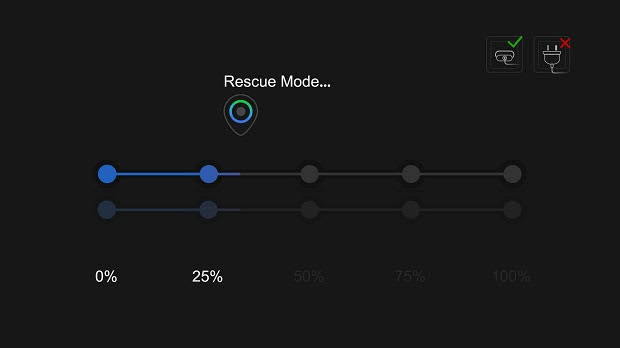
b). When the GVC320x device goes into the Rescue Mode, users should see the figure below. If the network is connected, the device will continue to download and upgrade the firmware automatically.
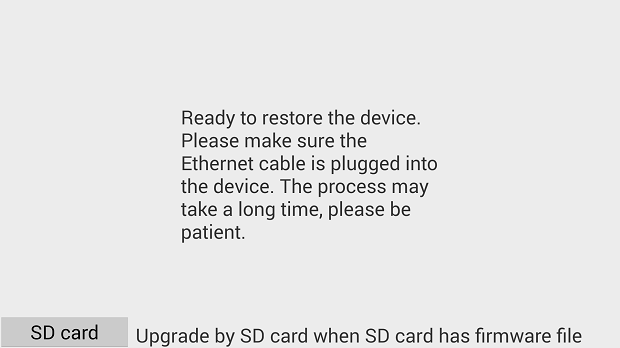
c). If the network is not connected, users can use the mouse to select “SD Card” or “Manual” to recover the device.
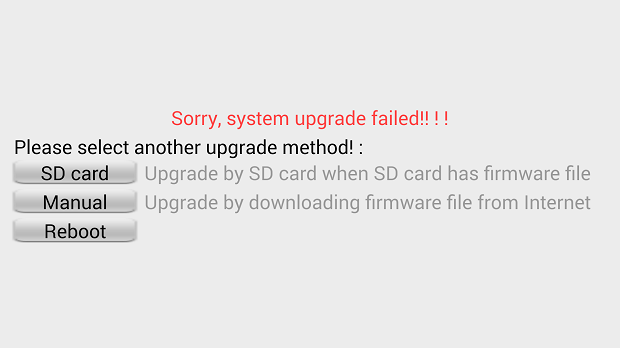
- Select “SD Card”.
Users could insert SD card with GVC32XX_rescue.bin firmware file to upgrade the GVC320x device. The device will be upgraded automatically via SD card.
2. Select “Manual”.
Please make sure that the Ethernet cable is plugged into the GVC320x device, and users need to configure the Internet Settings in the device to upgrade the GVC320x device.
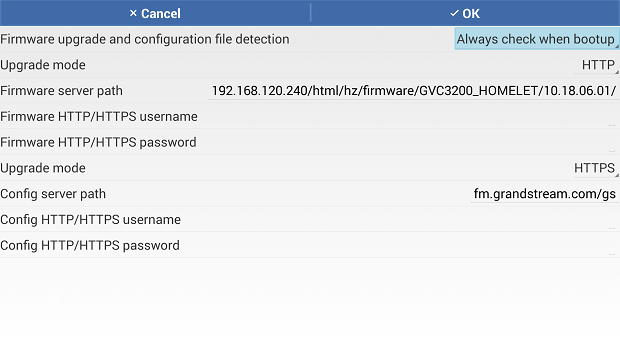
3. Select “Reboot”.
If users select “Reboot” option, the GVC320x device will enter “Rescue Mode” again.
FACTORY RESET
Users could reset GVC3200/GVC3202 to factory settings via the following ways: Reset via local GUI, via Web page, via the reset hole on the back panel of GVC3200/GVC3202. Factory reset will delete configuration info and syslog info.
Reset via LCD
Go to GVC3200/GVC3202 LCD idle screen🡪Settings🡪Maintenance🡪Factory Reset, click on the “Reset” button to bring up the prompt box as shown below. Click “OK” to reboot the device and restore factory settings.
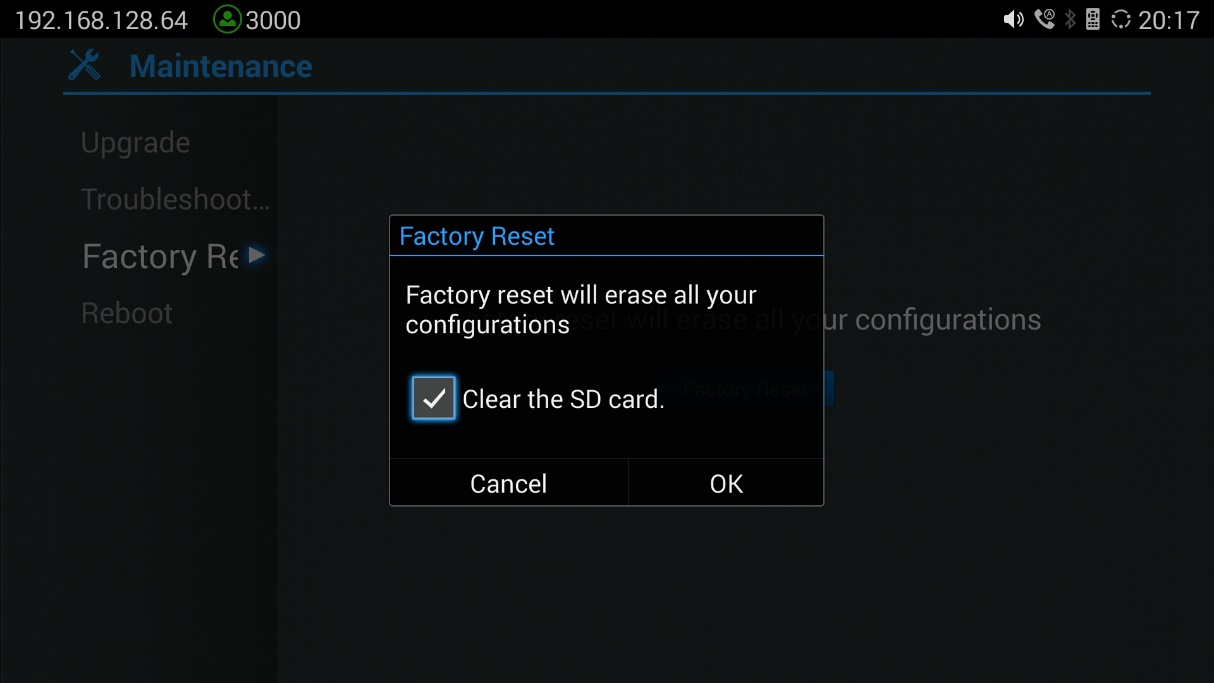
Reset via Web UI
- Log in GVC3200/GVC3202 Web UI🡪Maintenance🡪Upgrade, the “Factory Reset” option is on the bottom of the page.

2. Click the “Reset” button to bring up the prompt box as shown below. Click “OK” to reboot the device, and restore factory settings.

Reset via Reset Hole
There is a Reset hole on the back panel of GVC3200/GVC3202, use a small pin to hold against the Reset hole for more than 10 seconds to restore factory settings.
EXPERIENCING GVC3200/GVC3202
Please visit our website: http://www.grandstream.com to receive the most up-to-date updates on firmware releases, additional features, FAQs, documentation and news on new products.
We encourage you to browse our product related documentation, FAQs and User and Developer Forum for answers to your general questions. If you have purchased our products through a Grandstream Certified Partner or Reseller, please contact them directly for immediate support.
Our technical support staff is trained and ready to answer all of your questions. Contact a technical support member or submit a trouble ticket online to receive in-depth support.
Thank you again for purchasing Grandstream Video Conferencing System, it will be sure to bring convenience and color to both your business and personal life.
* Android is a trademark of Google LLC.

HDMI, the HDMI Logo, and High-Definition Multimedia Interface are trademarks or registered trademarks of HDMI Licensing LLC in the United States and other countries.
CHANGE LOG
This section documents significant changes from previous versions of GVC3200/GVC3202 user manuals. Only major new features or major document updates are listed here. Minor updates for corrections or editing are not documented here.
Firmware Version 1.0.3.69
- No major changes.
Firmware Version 1.0.3.64
- No major changes.
Firmware Version 1.0.3.62
- Added to support to show the number of total members in the IPVideoTalk meeting. [Participants List]
- Added to support to control the video layouts in the IPVideoTalk cloud server. [Conference Layout]
- Added ability to specify a certain pane to display a certain attendee. [Conference Layout]
- Added power menu for GVC320x remote control power button. [Remote Control Keys and Touchpad]
- Added support to show the number of invited members and joined members in the IPVideoTalk meeting. [Conference Control].
- Added to show current audio input/output device on GVC320x’s HDMI output. [Audio Input/Output]
- Updated the Bluetooth pairing UI in the GVC320x.
- Added IPVideoTalk Conf Control features in the GVC320x. [Conference Control].
Firmware Version 1.0.3.51
- Added IPVideoTalk Menu on GVC320x’s home screen. [IPVideoTalk Menu]
Firmware Version 1.0.3.49
- Updated IPVideoTalk application Interface [IPVideoTalk Application]
Firmware Version 1.0.3.46
- Optimized OPUS codec upstream performance.
- Added the option to check the Participants List on GVC320x during an IPVideoTalk meeting. Users could check all participants in the current IPVideoTalk meeting.
Firmware Version 1.0.3.45
- Added the prompt for IPVideoTalk Webinar preparation period before starting the meeting.
- Added the option to join back the existed meeting by one key. In this case, if the GVC320x leaves the meeting, the GVC320x could click to join back the meeting to continue/end the conference.
Firmware Version 1.0.3.38
- Added cloud recording control for IPVideoTalk meetings or webinars [Start Cloud Recording]
- Added an option to allow GVC to leave meeting itself when pressing “End” button [End Conference]
- Added a notification to inform users “The meeting will be ended in 5 minutes” during an IPVT meeting if the subscribed IPVT plan on GVC device is expiring [End Meeting Reminder]
Firmware Version 1.0.3.24
- Added support for GVC to receive, accept and reject request from IPVT WebRTC host to open GVC local camera to share video. [Share Local Camera]
- Added some commonly used apps on system backup settings page, such as scheduled meeting and camera preset. [Backup Commonly Used Apps]
- Added allowing users to choose the main feed in Custom PIP when GVC is connected to multiple monitors. [Conference Layout]
Firmware Version 1.0.3.16
- Added “Hand up/down” feature for IPVideoTalk conference. [Hand Down/Up in IPVideoTalk Meeting]
- Added support for user to power off the device immediately during a call. [Power Off During a Conference Call]
- Added option “Pause uploading” on configure control panel during an IPVideoTalk meeting. [Stop Video Upload]
- Added support for users to move apps to external SD card. [Move App to SD Card]
Firmware Version 1.0.3.8
- Added IPv6 support [Ethernet]
- Added conference preseαt setting for schedule [Add Scheduled Conference]
- Added interface detection in setup wizard [Setup Wizard]
Firmware Version 1.0.1.74
- Added support to join an IPVideoTalk meeting by dialing meeting ID or host IPVideoTalk ID. [Join an IPVideoTalk Meeting]
- Added prompt message for current IPVideoTalk plan is about to expire or already expired on GVC3200/GVC3202 LCD home screen or menu🡪Applications🡪IPVideoTalk application🡪Notices. [Notices]
- Updated size limitation of each recording file size from 1 G to 1.9 G. [Recording].
- Added support specific failed reasons prompt on dialing screen instead of SIP 486 busy error messages of IPVideoTalk calls [Busy Tone Responses]
- Added A tip for manually starting local scheduled IPVideoTalk meeting from GVC3200/GVC3202 LCD🡪Schedule page [Manually Start IPVideoTalk Tip]
Firmware Version 1.0.1.65
- Added ability to choose any configured preset as initial position in the drop-down menu in addition to “Default” and “Latest Position”. [Initial Position]
- Added an icon to indicate network unstable condition on the upper left of the call screen, which means current network condition is not good enough for the video call using the selected resolution/bit rate. [Status Icons]
- Added “Record” option on the call screen bottom menu. [GVC3200/GVC3202 Call Screen Bottom Menu Icons]
- Updated the default configurations for Call Recording feature. [Call Recording]
- Added support to record presentation shared by GVC3200/GVC3202 and IPVideoTalk WebRTC clients. [Conference Recording]
- Added recording files limitation that max size of each recording file on SD card or USB storage device is 1 G, GVC3200/GVC3202 will create a new file if size exceed 1 G. [recording size]
- Added Save Path options of Recording files on internal memory, external SD card or USB storage. [Save Path]
- Added video answer and audio answer options on GVC3200/GVC3202 to answer H.323 calls. [H.323]
- Updated the default configurations for IPVideoTalk Contacts. [Contacts]
- Added GVC3200/GVC3202 version control mechanism that IPVideoTalk account will work only if the firmware version is on 1.0.1.62 or later, and IPVideoTalk version information is under Settings. [IPVideoTalk version]
Firmware Version 1.0.1.58
- Added feature code. [Call Features]
- Added ability to view top status bar notifications. [Status Icons] [Figure 7: GVC3200/GVC3202 Top Status Bar Dropdown Menu]
- Added “optional” for step 2 “selecting call mode to IP Call” in making direct IP call from LCD dialing interface. The GVC3200/GVC3202 can dial direct IP as long as a valid format is entered without selecting mode to “IP Call”. [Direct IP Call]
- Added presentation mode “PC” and “Auto”. [Table 16: GVC3200/GVC3202 Call Screen Bottom Menu Icons]
- Added “Layout” option in the call screen bottom menu. [Table 16: GVC3200/GVC3202 Call Screen Bottom Menu Icons]
- Added “View contact” option in the GVC3200/GVC3202 menu🡪Applications🡪Call History so that users can view contact details if the call history entry already exists in Contacts. [View contact]
- Added Screen Lock feature. [Screen Lock]
- Added support to sync local schedule with Google Calendar. [Sync Local Schedule with Google Calendar]
Firmware Version 1.0.1.48
- Separated Add Preset section and Edit Preset section. Edit Preset section has renamed preset information added. [Add Preset] [Edit Preset]
- Added PIN Code support during conference. [PIN Code]
- Added FECC support during conference. [FECC – Camera Control in Conference]
- Added LDAP contacts support. [LDAP contacts]
- Added options “PIN Code”, “Auto Join Conference for Scheduled Members without PIN Code” and “Repeat” for Schedule. Removed options “Auto Answer for Conference Members” and “Lock” for Schedule. [Schedule] [Schedule]
- Added IPVideoTalk Application. [IPVIDEOTALK]
- Updated Audio Priority information for connected audio devices. [Microphone and Speaker]
Firmware Version 1.0.1.5
- This is the initial version.






































 icon on home screen.
icon on home screen.
 on home screen to access Applications, then click on
on home screen to access Applications, then click on
 .
.
 on home screen.
on home screen.
 to bring up dial screen.
to bring up dial screen.
 on dial screen and click it to dial out.
on dial screen and click it to dial out.  on home screen.
on home screen.
 .
.
 to resume the call.
to resume the call.
 or press on the remote control to end the call.
or press on the remote control to end the call.
 on the screen to dial out.
on the screen to dial out.

 – The selected party will not be heard by other parties.
– The selected party will not be heard by other parties.
 – The video call with the selected party will turn into audio call.
– The video call with the selected party will turn into audio call.
 – Turn off the host local camera.
– Turn off the host local camera.
 – Lower the hand of a user (from the participants list) or lower all hands (from Conf Control).
– Lower the hand of a user (from the participants list) or lower all hands (from Conf Control).
 on conference screen. Then, enter the number to dial out. Once the member answers the call, it will be connected into the conference automatically.
on conference screen. Then, enter the number to dial out. Once the member answers the call, it will be connected into the conference automatically.
 Removing Member from Conference
Removing Member from Conference on bottom menu to start recording.
on bottom menu to start recording.  on bottom menu to stop recording anytime.
on bottom menu to stop recording anytime. 🡪select “Open DTMF” on the conference screen to bring up the DTMF input screen.
🡪select “Open DTMF” on the conference screen to bring up the DTMF input screen.
 and the following prompt pops up on GVC3200/GVC3202 display device.
and the following prompt pops up on GVC3200/GVC3202 display device.  .
.
 and select
and select
 .
.
 to access schedule screen.
to access schedule screen.
 on the call screen to dial into the voicemail box.
on the call screen to dial into the voicemail box.
 on the screen to dial out.
on the screen to dial out.
 .
.
 Search Apps
Search Apps next to the contact to dial the contact.
next to the contact to dial the contact.
 next to the group to call the contacts in the group.
next to the group to call the contacts in the group.
 will appear for the user to dial out immediately.
will appear for the user to dial out immediately.